25 Reasons Homework Should Be Banned (Busywork Arguments)

As students across the globe plow through heaps of homework each night, one question lingers in the minds of educators, parents, and students alike: should homework be banned?
This question is not new, yet it continues to spark lively debate as research findings, anecdotal evidence, and personal experiences paint a complex picture of the pros and cons of homework.
On one hand, proponents of homework argue that it reinforces classroom learning, encourages a disciplined work ethic, and provides teachers with valuable insight into student comprehension. They see homework as an extension of classroom instruction that solidifies and enriches learning while fostering important skills like time management and self-discipline. It also offers an opportunity for parents to be involved in their children's education.
However, some people say there are a lot of downsides. They argue that excessive homework can lead to stress and burnout, reduce time for extracurricular activities and family interactions, exacerbate educational inequalities, and even negatively impact students' mental health.

This article presents 25 reasons why we might need to seriously consider this radical shift in our educational approach. But first, lets share some examples of what homework actually is.

Examples of Homework
These examples cover a wide range of subjects and complexity levels, reflecting the variety of homework assignments students might encounter throughout their educational journey.
- Spelling lists to memorize for a test
- Math worksheets for practicing basic arithmetic operations
- Reading assignments from children's books
- Simple science projects like growing a plant
- Basic geography assignments like labeling a map
- Art projects like drawing a family portrait
- Writing book reports or essays
- Advanced math problems
- Research projects on various topics
- Lab reports for science experiments
- Reading and responding to literature
- Preparing presentations on various topics
- Advanced math problems involving calculus or algebra
- Reading classic literature and writing analytical essays
- Research papers on historical events
- Lab reports for advanced science experiments
- Foreign language exercises
- Preparing for standardized tests
- College application essays
- Extensive research papers
- In-depth case studies
- Advanced problem-solving in subjects like physics, engineering, etc.
- Thesis or dissertation writing
- Extensive reading and literature reviews
- Internship or practicum experiences
Lack of proven benefits

Homework has long been a staple of traditional education, dating back centuries. However, the actual efficacy of homework in enhancing learning outcomes remains disputed. A number of studies indicate that there's no conclusive evidence supporting the notion that homework improves academic performance, especially in primary education . In fact, research suggests that for younger students, the correlation between homework and academic achievement is weak or even negative .
Too much homework can often lead to increased stress and decreased enthusiasm for learning. This issue becomes particularly pressing when considering the common 'more is better' approach to homework, where the quantity of work given to students often outweighs the quality and effectiveness of the tasks. For instance, spending countless hours memorizing facts for a history test may not necessarily translate to better understanding or long-term retention of the subject matter.
However, it's worth noting that homework isn't completely devoid of benefits. It can help foster self-discipline, time management skills, and the ability to work independently. But, these positive outcomes are usually more pronounced in older students and when homework assignments are thoughtfully designed and not excessive in volume.
When discussing the merits and drawbacks of homework, it's critical to consider the nature of the assignments. Routine, repetitive tasks often associated with 'drill-and-practice' homework, such as completing rows of arithmetic problems or copying definitions from a textbook, rarely lead to meaningful learning. On the other hand, assignments that encourage students to apply what they've learned in class, solve problems, or engage creatively with the material can be more beneficial.
Increased stress

Homework can often lead to a significant increase in stress levels among students. This is especially true when students are burdened with large volumes of homework, leaving them with little time to relax or pursue other activities. The feeling of constantly racing against the clock to meet deadlines can contribute to anxiety, frustration, and even burnout.
Contrary to popular belief, stress does not necessarily improve performance or productivity. In fact, high levels of stress can negatively impact memory, concentration, and overall cognitive function. This counteracts the very purpose of homework, which is intended to reinforce learning and improve academic outcomes.
However, one might argue that homework can teach students about time management, organization, and how to handle pressure. These are important life skills that could potentially prepare them for future responsibilities. But it's essential to strike a balance. The pressure to complete homework should not come at the cost of a student's mental wellbeing.
Limited family time

Homework often infringes upon the time students can spend with their families. After spending the entire day in school, children come home to yet more academic work, leaving little room for quality family interactions. This limited family time can hinder the development of important interpersonal skills and familial bonds.
Moreover, family time isn't just about fun and relaxation. It also plays a crucial role in the social and emotional development of children. Opportunities for unstructured play, family conversations, and shared activities can contribute to children's well-being and character building.
Nonetheless, advocates of homework might argue that it can be a platform for parental involvement in a child's education. While this may be true, the involvement should not transform into parental control or cause friction due to differing expectations and pressures.
Reduced physical activity

Homework can often lead to reduced physical activity by eating into the time students have for sports, recreation, and simply being outdoors. Physical activity is essential for children's health, well-being, and even their academic performance. Research suggests that physical activity can enhance cognitive abilities, improve concentration, and reduce symptoms of ADHD .
Homework, especially when it's boring and repetitive, can deter students from engaging in physical activities, leading to a sedentary lifestyle. This lack of balance between work and play can contribute to physical health problems such as obesity, poor posture, and related health concerns.
Homework proponents might point out that disciplined time management could allow students to balance both work and play. However, given the demanding nature of many homework assignments, achieving this balance is often easier said than done.
Negative impact on sleep

A significant concern about homework is its impact on students' sleep patterns. Numerous studies have linked excessive homework to sleep deprivation in students. Children often stay up late to complete assignments, reducing the amount of sleep they get. Lack of sleep can result in a host of issues, from poor academic performance and difficulty concentrating to physical health problems like weakened immunity.
Even the quality of sleep can be affected. The stress and anxiety from a heavy workload can lead to difficulty falling asleep or restless nights. And let's not forget that students often need to wake up early for school, compounding the negative effects of late-night homework sessions.
On the other hand, some argue that homework can teach children time management skills, suggesting that effective organization could help prevent late-night work. However, when schools assign excessive amounts of homework, even the best time management might not prevent encroachment on sleep time.
Homework can exacerbate existing educational inequalities. Not all students have access to a conducive learning environment at home, necessary resources, or support from educated family members. For these students, homework can become a source of stress and disadvantage rather than an opportunity to reinforce learning.
Children from lower socio-economic backgrounds might need to contribute to household chores or part-time work, limiting the time they have for homework. This can create a gap in academic performance and grades, reflecting not on the students' abilities but their circumstances.
While homework is meant to level the playing field by providing additional learning time outside school, it often does the opposite. It's worth noting that students from privileged backgrounds can often access additional help like tutoring, further widening the gap.
Reduced creativity and independent thinking
Homework, particularly when it involves rote learning or repetitive tasks, can stifle creativity and independent thinking. Students often focus on getting the "right" answers to please teachers rather than exploring different ideas and solutions. This can hinder their ability to think creatively and solve problems independently, skills that are increasingly in demand in the modern world.
Homework defenders might claim that it can also promote independent learning. True, when thoughtfully designed, homework can encourage this. But, voluminous or repetitive tasks tend to promote compliance over creativity.
Diminished interest in learning
Overburdening students with homework can diminish their interest in learning. After long hours in school followed by more academic tasks at home, learning can begin to feel like a chore. This can lead to a decline in intrinsic motivation and an unhealthy association of learning with stress and exhaustion.
In theory, homework can deepen interest in a subject, especially when it involves projects or research. Yet, an excess of homework, particularly routine tasks, might achieve the opposite, turning learning into a source of stress rather than enjoyment.
Inability to pursue personal interests
Homework can limit students' ability to pursue personal interests. Hobbies, personal projects, and leisure activities are crucial for personal development and well-being. With heavy homework loads, students may struggle to find time for these activities, missing out on opportunities to discover new interests and talents.
Supporters of homework might argue that it teaches students to manage their time effectively. However, even with good time management, an overload of homework can crowd out time for personal interests.
Excessive workload
The issue of excessive workload is a common complaint among students. Spending several hours on homework after a full school day can be mentally and physically draining. This workload can lead to burnout, decreased motivation, and negative attitudes toward school and learning.
While homework can help consolidate classroom learning, too much can be counterproductive. It's important to consider the overall workload of students, including school, extracurricular activities, and personal time, when assigning homework.
Limited time for reflection
Homework can limit the time students have for reflection. Reflection is a critical part of learning, allowing students to digest and integrate new information. With the constant flow of assignments, there's often little time left for this crucial process. Consequently, the learning becomes superficial, and the true understanding of subjects can be compromised.
Although homework is meant to reinforce what's taught in class, the lack of downtime for reflection might hinder deep learning. It's important to remember that learning is not just about doing, but also about thinking.
Increased pressure on young children
Young children are particularly vulnerable to the pressures of homework. At an age where play and exploration are vital for cognitive and emotional development, too much homework can create undue pressure and stress. This pressure can instigate a negative relationship with learning from an early age, potentially impacting their future attitude towards education.
Advocates of homework often argue that it prepares children for the rigors of their future academic journey. However, placing too much academic pressure on young children might overshadow the importance of learning through play and exploration.
Lack of alignment with real-world skills
Traditional homework often lacks alignment with real-world skills. Assignments typically focus on academic abilities at the expense of skills like creativity, problem-solving, and emotional intelligence. These are crucial for success in the modern workplace and are often under-emphasized in homework tasks.
Homework can be an opportunity to develop these skills when properly structured. However, tasks often focus on memorization and repetition, rather than cultivating skills relevant to the real world.
Loss of motivation
Excessive homework can lead to a loss of motivation. The constant pressure to complete assignments and meet deadlines can diminish a student's intrinsic motivation to learn. This loss of motivation might not only affect their academic performance but also their love of learning, potentially having long-term effects on their educational journey.
Some believe homework instills discipline and responsibility. But, it's important to balance these benefits against the potential for homework to undermine motivation and engagement.
Disruption of work-life balance
Maintaining a healthy work-life balance is as important for students as it is for adults. Overloading students with homework can disrupt this balance, leaving little time for relaxation, socializing, and extracurricular activities. All of these are vital for a student's overall development and well-being.
Homework supporters might argue that it prepares students for the workloads they'll face in college and beyond. But it's also crucial to ensure students have time to relax, recharge, and engage in non-academic activities for a well-rounded development.
Impact on mental health
There's a growing body of evidence showing the negative impact of excessive homework on students' mental health. The stress and anxiety from heavy homework loads can contribute to issues like depression, anxiety, and even thoughts of suicide. Student well-being should be a top priority in education, and the impact of homework on mental health cannot be ignored.
While some might argue that homework helps students develop resilience and coping skills, it's important to ensure these potential benefits don't come at the expense of students' mental health.
Limited time for self-care
With excessive homework, students often find little time for essential self-care activities. These can include physical exercise, proper rest, healthy eating, mindfulness, or even simple leisure activities. These activities are critical for maintaining physical health, emotional well-being, and cognitive function.
Some might argue that managing homework alongside self-care responsibilities teaches students valuable life skills. However, it's important that these skills don't come at the cost of students' health and well-being.
Decreased family involvement
Homework can inadvertently lead to decreased family involvement in a child's learning. Parents often feel unqualified or too busy to help with homework, leading to missed opportunities for family learning interactions. This can also create stress and conflict within the family, especially when parents have high expectations or are unable to assist.
Some believe homework can facilitate parental involvement in education. But, when it becomes a source of stress or conflict, it can discourage parents from engaging in their child's learning.
Reinforcement of inequalities
Homework can unintentionally reinforce inequalities. Students from disadvantaged backgrounds might lack access to resources like private tutors or a quiet study space, placing them at a disadvantage compared to their more privileged peers. Additionally, these students might have additional responsibilities at home, further limiting their time to complete homework.
While the purpose of homework is often to provide additional learning opportunities, it can inadvertently reinforce existing disparities. Therefore, it's essential to ensure that homework doesn't favor students who have more resources at home.
Reduced time for play and creativity
Homework can take away from time for play and creative activities. These activities are not only enjoyable but also crucial for the cognitive, social, and emotional development of children. Play allows children to explore, imagine, and create, fostering innovative thinking and problem-solving skills.
Some may argue that homework teaches discipline and responsibility. Yet, it's vital to remember that play also has significant learning benefits and should be a part of every child's daily routine.
Increased cheating and academic dishonesty
The pressure to complete homework can sometimes lead to increased cheating and academic dishonesty. When faced with a large volume of homework, students might resort to copying from friends or searching for answers online. This undermines the educational value of homework and fosters unhealthy academic practices.
While homework is intended to consolidate learning, the risk of promoting dishonest behaviors is a concern that needs to be addressed.
Strained teacher-student relationships
Excessive homework can strain teacher-student relationships. If students begin to associate teachers with stress or anxiety from homework, it can hinder the development of a positive learning relationship. Furthermore, if teachers are perceived as being unfair or insensitive with their homework demands, it can impact the overall classroom dynamic.
While homework can provide an opportunity for teachers to monitor student progress, it's important to ensure that it doesn't negatively affect the teacher-student relationship.
Negative impact on family dynamics
Homework can impact family dynamics. Parents might feel compelled to enforce homework completion, leading to potential conflict, stress, and tension within the family. These situations can disrupt the harmony in the household and strain relationships.
Homework is sometimes seen as a tool to engage parents in their child's education. However, it's crucial to ensure that this involvement doesn't turn into a source of conflict or pressure.
Cultural and individual differences
Homework might not take into account cultural and individual differences. Education is not a one-size-fits-all process, and what works for one student might not work for another. Some students might thrive on hands-on learning, while others prefer auditory or visual learning methods. By standardizing homework, we might ignore these individual learning styles and preferences.
Homework can also overlook cultural differences. For students from diverse cultural backgrounds, certain types of homework might seem irrelevant or difficult to relate to, leading to disengagement or confusion.
Encouragement of surface-level learning
Homework often encourages surface-level learning instead of deep understanding. When students are swamped with homework, they're likely to rush through assignments to get them done, rather than taking the time to understand the concepts. This can result in superficial learning where students memorize information to regurgitate it on assignments and tests, instead of truly understanding and internalizing the knowledge.
While homework is meant to reinforce classroom learning, the quality of learning is more important than the quantity. It's important to design homework in a way that encourages deep, meaningful learning instead of mere rote memorization.
Related posts:
- Diathesis-Stress Model (Definition + Examples)
- HPA Axis (Hypothalamic Pituitary Adrenal Axis)
- General Adaptation Syndrome Theory
- Careers in Psychology
- The Stress Response (General Adaptation Syndome)
Reference this article:
About The Author

Free Personality Test

Free Memory Test

Free IQ Test

PracticalPie.com is a participant in the Amazon Associates Program. As an Amazon Associate we earn from qualifying purchases.
Follow Us On:
Youtube Facebook Instagram X/Twitter
Psychology Resources
Developmental
Personality
Relationships
Psychologists
Serial Killers
Psychology Tests
Personality Quiz
Memory Test
Depression test
Type A/B Personality Test
© PracticalPsychology. All rights reserved
Privacy Policy | Terms of Use
Homework – Top 3 Pros and Cons
Pro/Con Arguments | Discussion Questions | Take Action | Sources | More Debates

From dioramas to book reports, from algebraic word problems to research projects, whether students should be given homework, as well as the type and amount of homework, has been debated for over a century. [ 1 ]
While we are unsure who invented homework, we do know that the word “homework” dates back to ancient Rome. Pliny the Younger asked his followers to practice their speeches at home. Memorization exercises as homework continued through the Middle Ages and Enlightenment by monks and other scholars. [ 45 ]
In the 19th century, German students of the Volksschulen or “People’s Schools” were given assignments to complete outside of the school day. This concept of homework quickly spread across Europe and was brought to the United States by Horace Mann , who encountered the idea in Prussia. [ 45 ]
In the early 1900s, progressive education theorists, championed by the magazine Ladies’ Home Journal , decried homework’s negative impact on children’s physical and mental health, leading California to ban homework for students under 15 from 1901 until 1917. In the 1930s, homework was portrayed as child labor, which was newly illegal, but the prevailing argument was that kids needed time to do household chores. [ 1 ] [ 2 ] [ 45 ] [ 46 ]
Public opinion swayed again in favor of homework in the 1950s due to concerns about keeping up with the Soviet Union’s technological advances during the Cold War . And, in 1986, the US government included homework as an educational quality boosting tool. [ 3 ] [ 45 ]
A 2014 study found kindergarteners to fifth graders averaged 2.9 hours of homework per week, sixth to eighth graders 3.2 hours per teacher, and ninth to twelfth graders 3.5 hours per teacher. A 2014-2019 study found that teens spent about an hour a day on homework. [ 4 ] [ 44 ]
Beginning in 2020, the COVID-19 pandemic complicated the very idea of homework as students were schooling remotely and many were doing all school work from home. Washington Post journalist Valerie Strauss asked, “Does homework work when kids are learning all day at home?” While students were mostly back in school buildings in fall 2021, the question remains of how effective homework is as an educational tool. [ 47 ]
Is Homework Beneficial?
Pro 1 Homework improves student achievement. Studies have shown that homework improved student achievement in terms of improved grades, test results, and the likelihood to attend college. Research published in the High School Journal indicated that students who spent between 31 and 90 minutes each day on homework “scored about 40 points higher on the SAT-Mathematics subtest than their peers, who reported spending no time on homework each day, on average.” [ 6 ] Students in classes that were assigned homework outperformed 69% of students who didn’t have homework on both standardized tests and grades. A majority of studies on homework’s impact – 64% in one meta-study and 72% in another – showed that take-home assignments were effective at improving academic achievement. [ 7 ] [ 8 ] Research by the Institute for the Study of Labor (IZA) concluded that increased homework led to better GPAs and higher probability of college attendance for high school boys. In fact, boys who attended college did more than three hours of additional homework per week in high school. [ 10 ] Read More
Pro 2 Homework helps to reinforce classroom learning, while developing good study habits and life skills. Students typically retain only 50% of the information teachers provide in class, and they need to apply that information in order to truly learn it. Abby Freireich and Brian Platzer, co-founders of Teachers Who Tutor NYC, explained, “at-home assignments help students learn the material taught in class. Students require independent practice to internalize new concepts… [And] these assignments can provide valuable data for teachers about how well students understand the curriculum.” [ 11 ] [ 49 ] Elementary school students who were taught “strategies to organize and complete homework,” such as prioritizing homework activities, collecting study materials, note-taking, and following directions, showed increased grades and more positive comments on report cards. [ 17 ] Research by the City University of New York noted that “students who engage in self-regulatory processes while completing homework,” such as goal-setting, time management, and remaining focused, “are generally more motivated and are higher achievers than those who do not use these processes.” [ 18 ] Homework also helps students develop key skills that they’ll use throughout their lives: accountability, autonomy, discipline, time management, self-direction, critical thinking, and independent problem-solving. Freireich and Platzer noted that “homework helps students acquire the skills needed to plan, organize, and complete their work.” [ 12 ] [ 13 ] [ 14 ] [ 15 ] [ 49 ] Read More
Pro 3 Homework allows parents to be involved with children’s learning. Thanks to take-home assignments, parents are able to track what their children are learning at school as well as their academic strengths and weaknesses. [ 12 ] Data from a nationwide sample of elementary school students show that parental involvement in homework can improve class performance, especially among economically disadvantaged African-American and Hispanic students. [ 20 ] Research from Johns Hopkins University found that an interactive homework process known as TIPS (Teachers Involve Parents in Schoolwork) improves student achievement: “Students in the TIPS group earned significantly higher report card grades after 18 weeks (1 TIPS assignment per week) than did non-TIPS students.” [ 21 ] Homework can also help clue parents in to the existence of any learning disabilities their children may have, allowing them to get help and adjust learning strategies as needed. Duke University Professor Harris Cooper noted, “Two parents once told me they refused to believe their child had a learning disability until homework revealed it to them.” [ 12 ] Read More
Con 1 Too much homework can be harmful. A poll of California high school students found that 59% thought they had too much homework. 82% of respondents said that they were “often or always stressed by schoolwork.” High-achieving high school students said too much homework leads to sleep deprivation and other health problems such as headaches, exhaustion, weight loss, and stomach problems. [ 24 ] [ 28 ] [ 29 ] Alfie Kohn, an education and parenting expert, said, “Kids should have a chance to just be kids… it’s absurd to insist that children must be engaged in constructive activities right up until their heads hit the pillow.” [ 27 ] Emmy Kang, a mental health counselor, explained, “More than half of students say that homework is their primary source of stress, and we know what stress can do on our bodies.” [ 48 ] Excessive homework can also lead to cheating: 90% of middle school students and 67% of high school students admit to copying someone else’s homework, and 43% of college students engaged in “unauthorized collaboration” on out-of-class assignments. Even parents take shortcuts on homework: 43% of those surveyed admitted to having completed a child’s assignment for them. [ 30 ] [ 31 ] [ 32 ] Read More
Con 2 Homework exacerbates the digital divide or homework gap. Kiara Taylor, financial expert, defined the digital divide as “the gap between demographics and regions that have access to modern information and communications technology and those that don’t. Though the term now encompasses the technical and financial ability to utilize available technology—along with access (or a lack of access) to the Internet—the gap it refers to is constantly shifting with the development of technology.” For students, this is often called the homework gap. [ 50 ] [ 51 ] 30% (about 15 to 16 million) public school students either did not have an adequate internet connection or an appropriate device, or both, for distance learning. Completing homework for these students is more complicated (having to find a safe place with an internet connection, or borrowing a laptop, for example) or impossible. [ 51 ] A Hispanic Heritage Foundation study found that 96.5% of students across the country needed to use the internet for homework, and nearly half reported they were sometimes unable to complete their homework due to lack of access to the internet or a computer, which often resulted in lower grades. [ 37 ] [ 38 ] One study concluded that homework increases social inequality because it “potentially serves as a mechanism to further advantage those students who already experience some privilege in the school system while further disadvantaging those who may already be in a marginalized position.” [ 39 ] Read More
Con 3 Homework does not help younger students, and may not help high school students. We’ve known for a while that homework does not help elementary students. A 2006 study found that “homework had no association with achievement gains” when measured by standardized tests results or grades. [ 7 ] Fourth grade students who did no homework got roughly the same score on the National Assessment of Educational Progress (NAEP) math exam as those who did 30 minutes of homework a night. Students who did 45 minutes or more of homework a night actually did worse. [ 41 ] Temple University professor Kathryn Hirsh-Pasek said that homework is not the most effective tool for young learners to apply new information: “They’re learning way more important skills when they’re not doing their homework.” [ 42 ] In fact, homework may not be helpful at the high school level either. Alfie Kohn, author of The Homework Myth, stated, “I interviewed high school teachers who completely stopped giving homework and there was no downside, it was all upside.” He explains, “just because the same kids who get more homework do a little better on tests, doesn’t mean the homework made that happen.” [ 52 ] Read More
Discussion Questions
1. Is homework beneficial? Consider the study data, your personal experience, and other types of information. Explain your answer(s).
2. If homework were banned, what other educational strategies would help students learn classroom material? Explain your answer(s).
3. How has homework been helpful to you personally? How has homework been unhelpful to you personally? Make carefully considered lists for both sides.
Take Action
1. Examine an argument in favor of quality homework assignments from Janine Bempechat.
2. Explore Oxford Learning’s infographic on the effects of homework on students.
3. Consider Joseph Lathan’s argument that homework promotes inequality .
4. Consider how you felt about the issue before reading this article. After reading the pros and cons on this topic, has your thinking changed? If so, how? List two to three ways. If your thoughts have not changed, list two to three ways your better understanding of the “other side of the issue” now helps you better argue your position.
5. Push for the position and policies you support by writing US national senators and representatives .
| 1. | Tom Loveless, “Homework in America: Part II of the 2014 Brown Center Report of American Education,” brookings.edu, Mar. 18, 2014 | |
| 2. | Edward Bok, “A National Crime at the Feet of American Parents,” , Jan. 1900 | |
| 3. | Tim Walker, “The Great Homework Debate: What’s Getting Lost in the Hype,” neatoday.org, Sep. 23, 2015 | |
| 4. | University of Phoenix College of Education, “Homework Anxiety: Survey Reveals How Much Homework K-12 Students Are Assigned and Why Teachers Deem It Beneficial,” phoenix.edu, Feb. 24, 2014 | |
| 5. | Organization for Economic Cooperation and Development (OECD), “PISA in Focus No. 46: Does Homework Perpetuate Inequities in Education?,” oecd.org, Dec. 2014 | |
| 6. | Adam V. Maltese, Robert H. Tai, and Xitao Fan, “When is Homework Worth the Time?: Evaluating the Association between Homework and Achievement in High School Science and Math,” , 2012 | |
| 7. | Harris Cooper, Jorgianne Civey Robinson, and Erika A. Patall, “Does Homework Improve Academic Achievement? A Synthesis of Researcher, 1987-2003,” , 2006 | |
| 8. | Gökhan Bas, Cihad Sentürk, and Fatih Mehmet Cigerci, “Homework and Academic Achievement: A Meta-Analytic Review of Research,” , 2017 | |
| 9. | Huiyong Fan, Jianzhong Xu, Zhihui Cai, Jinbo He, and Xitao Fan, “Homework and Students’ Achievement in Math and Science: A 30-Year Meta-Analysis, 1986-2015,” , 2017 | |
| 10. | Charlene Marie Kalenkoski and Sabrina Wulff Pabilonia, “Does High School Homework Increase Academic Achievement?,” iza.og, Apr. 2014 | |
| 11. | Ron Kurtus, “Purpose of Homework,” school-for-champions.com, July 8, 2012 | |
| 12. | Harris Cooper, “Yes, Teachers Should Give Homework – The Benefits Are Many,” newsobserver.com, Sep. 2, 2016 | |
| 13. | Tammi A. Minke, “Types of Homework and Their Effect on Student Achievement,” repository.stcloudstate.edu, 2017 | |
| 14. | LakkshyaEducation.com, “How Does Homework Help Students: Suggestions From Experts,” LakkshyaEducation.com (accessed Aug. 29, 2018) | |
| 15. | University of Montreal, “Do Kids Benefit from Homework?,” teaching.monster.com (accessed Aug. 30, 2018) | |
| 16. | Glenda Faye Pryor-Johnson, “Why Homework Is Actually Good for Kids,” memphisparent.com, Feb. 1, 2012 | |
| 17. | Joan M. Shepard, “Developing Responsibility for Completing and Handing in Daily Homework Assignments for Students in Grades Three, Four, and Five,” eric.ed.gov, 1999 | |
| 18. | Darshanand Ramdass and Barry J. Zimmerman, “Developing Self-Regulation Skills: The Important Role of Homework,” , 2011 | |
| 19. | US Department of Education, “Let’s Do Homework!,” ed.gov (accessed Aug. 29, 2018) | |
| 20. | Loretta Waldman, “Sociologist Upends Notions about Parental Help with Homework,” phys.org, Apr. 12, 2014 | |
| 21. | Frances L. Van Voorhis, “Reflecting on the Homework Ritual: Assignments and Designs,” , June 2010 | |
| 22. | Roel J. F. J. Aries and Sofie J. Cabus, “Parental Homework Involvement Improves Test Scores? A Review of the Literature,” , June 2015 | |
| 23. | Jamie Ballard, “40% of People Say Elementary School Students Have Too Much Homework,” yougov.com, July 31, 2018 | |
| 24. | Stanford University, “Stanford Survey of Adolescent School Experiences Report: Mira Costa High School, Winter 2017,” stanford.edu, 2017 | |
| 25. | Cathy Vatterott, “Rethinking Homework: Best Practices That Support Diverse Needs,” ascd.org, 2009 | |
| 26. | End the Race, “Homework: You Can Make a Difference,” racetonowhere.com (accessed Aug. 24, 2018) | |
| 27. | Elissa Strauss, “Opinion: Your Kid Is Right, Homework Is Pointless. Here’s What You Should Do Instead.,” cnn.com, Jan. 28, 2020 | |
| 28. | Jeanne Fratello, “Survey: Homework Is Biggest Source of Stress for Mira Costa Students,” digmb.com, Dec. 15, 2017 | |
| 29. | Clifton B. Parker, “Stanford Research Shows Pitfalls of Homework,” stanford.edu, Mar. 10, 2014 | |
| 30. | AdCouncil, “Cheating Is a Personal Foul: Academic Cheating Background,” glass-castle.com (accessed Aug. 16, 2018) | |
| 31. | Jeffrey R. Young, “High-Tech Cheating Abounds, and Professors Bear Some Blame,” chronicle.com, Mar. 28, 2010 | |
| 32. | Robin McClure, “Do You Do Your Child’s Homework?,” verywellfamily.com, Mar. 14, 2018 | |
| 33. | Robert M. Pressman, David B. Sugarman, Melissa L. Nemon, Jennifer, Desjarlais, Judith A. Owens, and Allison Schettini-Evans, “Homework and Family Stress: With Consideration of Parents’ Self Confidence, Educational Level, and Cultural Background,” , 2015 | |
| 34. | Heather Koball and Yang Jiang, “Basic Facts about Low-Income Children,” nccp.org, Jan. 2018 | |
| 35. | Meagan McGovern, “Homework Is for Rich Kids,” huffingtonpost.com, Sep. 2, 2016 | |
| 36. | H. Richard Milner IV, “Not All Students Have Access to Homework Help,” nytimes.com, Nov. 13, 2014 | |
| 37. | Claire McLaughlin, “The Homework Gap: The ‘Cruelest Part of the Digital Divide’,” neatoday.org, Apr. 20, 2016 | |
| 38. | Doug Levin, “This Evening’s Homework Requires the Use of the Internet,” edtechstrategies.com, May 1, 2015 | |
| 39. | Amy Lutz and Lakshmi Jayaram, “Getting the Homework Done: Social Class and Parents’ Relationship to Homework,” , June 2015 | |
| 40. | Sandra L. Hofferth and John F. Sandberg, “How American Children Spend Their Time,” psc.isr.umich.edu, Apr. 17, 2000 | |
| 41. | Alfie Kohn, “Does Homework Improve Learning?,” alfiekohn.org, 2006 | |
| 42. | Patrick A. Coleman, “Elementary School Homework Probably Isn’t Good for Kids,” fatherly.com, Feb. 8, 2018 | |
| 43. | Valerie Strauss, “Why This Superintendent Is Banning Homework – and Asking Kids to Read Instead,” washingtonpost.com, July 17, 2017 | |
| 44. | Pew Research Center, “The Way U.S. Teens Spend Their Time Is Changing, but Differences between Boys and Girls Persist,” pewresearch.org, Feb. 20, 2019 | |
| 45. | ThroughEducation, “The History of Homework: Why Was It Invented and Who Was behind It?,” , Feb. 14, 2020 | |
| 46. | History, “Why Homework Was Banned,” (accessed Feb. 24, 2022) | |
| 47. | Valerie Strauss, “Does Homework Work When Kids Are Learning All Day at Home?,” , Sep. 2, 2020 | |
| 48. | Sara M Moniuszko, “Is It Time to Get Rid of Homework? Mental Health Experts Weigh In,” , Aug. 17, 2021 | |
| 49. | Abby Freireich and Brian Platzer, “The Worsening Homework Problem,” , Apr. 13, 2021 | |
| 50. | Kiara Taylor, “Digital Divide,” , Feb. 12, 2022 | |
| 51. | Marguerite Reardon, “The Digital Divide Has Left Millions of School Kids Behind,” , May 5, 2021 | |
| 52. | Rachel Paula Abrahamson, “Why More and More Teachers Are Joining the Anti-Homework Movement,” , Sep. 10, 2021 |
More School Debate Topics
Should K-12 Students Dissect Animals in Science Classrooms? – Proponents say dissecting real animals is a better learning experience. Opponents say the practice is bad for the environment.
Should Students Have to Wear School Uniforms? – Proponents say uniforms may increase student safety. Opponents say uniforms restrict expression.
Should Corporal Punishment Be Used in K-12 Schools? – Proponents say corporal punishment is an appropriate discipline. Opponents say it inflicts long-lasting physical and mental harm on students.
ProCon/Encyclopaedia Britannica, Inc. 325 N. LaSalle Street, Suite 200 Chicago, Illinois 60654 USA
Natalie Leppard Managing Editor [email protected]
© 2023 Encyclopaedia Britannica, Inc. All rights reserved
- Social Media
- Death Penalty
- School Uniforms
- Video Games
- Animal Testing
- Gun Control
- Banned Books
- Teachers’ Corner
Cite This Page
ProCon.org is the institutional or organization author for all ProCon.org pages. Proper citation depends on your preferred or required style manual. Below are the proper citations for this page according to four style manuals (in alphabetical order): the Modern Language Association Style Manual (MLA), the Chicago Manual of Style (Chicago), the Publication Manual of the American Psychological Association (APA), and Kate Turabian's A Manual for Writers of Term Papers, Theses, and Dissertations (Turabian). Here are the proper bibliographic citations for this page according to four style manuals (in alphabetical order):
[Editor's Note: The APA citation style requires double spacing within entries.]
[Editor’s Note: The MLA citation style requires double spacing within entries.]
- Share full article
Advertisement
Supported by
Student Opinion
Should We Get Rid of Homework?
Some educators are pushing to get rid of homework. Would that be a good thing?

By Jeremy Engle and Michael Gonchar
Do you like doing homework? Do you think it has benefited you educationally?
Has homework ever helped you practice a difficult skill — in math, for example — until you mastered it? Has it helped you learn new concepts in history or science? Has it helped to teach you life skills, such as independence and responsibility? Or, have you had a more negative experience with homework? Does it stress you out, numb your brain from busywork or actually make you fall behind in your classes?
Should we get rid of homework?
In “ The Movement to End Homework Is Wrong, ” published in July, the Times Opinion writer Jay Caspian Kang argues that homework may be imperfect, but it still serves an important purpose in school. The essay begins:
Do students really need to do their homework? As a parent and a former teacher, I have been pondering this question for quite a long time. The teacher side of me can acknowledge that there were assignments I gave out to my students that probably had little to no academic value. But I also imagine that some of my students never would have done their basic reading if they hadn’t been trained to complete expected assignments, which would have made the task of teaching an English class nearly impossible. As a parent, I would rather my daughter not get stuck doing the sort of pointless homework I would occasionally assign, but I also think there’s a lot of value in saying, “Hey, a lot of work you’re going to end up doing in your life is pointless, so why not just get used to it?” I certainly am not the only person wondering about the value of homework. Recently, the sociologist Jessica McCrory Calarco and the mathematics education scholars Ilana Horn and Grace Chen published a paper, “ You Need to Be More Responsible: The Myth of Meritocracy and Teachers’ Accounts of Homework Inequalities .” They argued that while there’s some evidence that homework might help students learn, it also exacerbates inequalities and reinforces what they call the “meritocratic” narrative that says kids who do well in school do so because of “individual competence, effort and responsibility.” The authors believe this meritocratic narrative is a myth and that homework — math homework in particular — further entrenches the myth in the minds of teachers and their students. Calarco, Horn and Chen write, “Research has highlighted inequalities in students’ homework production and linked those inequalities to differences in students’ home lives and in the support students’ families can provide.”
Mr. Kang argues:
But there’s a defense of homework that doesn’t really have much to do with class mobility, equality or any sense of reinforcing the notion of meritocracy. It’s one that became quite clear to me when I was a teacher: Kids need to learn how to practice things. Homework, in many cases, is the only ritualized thing they have to do every day. Even if we could perfectly equalize opportunity in school and empower all students not to be encumbered by the weight of their socioeconomic status or ethnicity, I’m not sure what good it would do if the kids didn’t know how to do something relentlessly, over and over again, until they perfected it. Most teachers know that type of progress is very difficult to achieve inside the classroom, regardless of a student’s background, which is why, I imagine, Calarco, Horn and Chen found that most teachers weren’t thinking in a structural inequalities frame. Holistic ideas of education, in which learning is emphasized and students can explore concepts and ideas, are largely for the types of kids who don’t need to worry about class mobility. A defense of rote practice through homework might seem revanchist at this moment, but if we truly believe that schools should teach children lessons that fall outside the meritocracy, I can’t think of one that matters more than the simple satisfaction of mastering something that you were once bad at. That takes homework and the acknowledgment that sometimes a student can get a question wrong and, with proper instruction, eventually get it right.
We are having trouble retrieving the article content.
Please enable JavaScript in your browser settings.
Thank you for your patience while we verify access. If you are in Reader mode please exit and log into your Times account, or subscribe for all of The Times.
Thank you for your patience while we verify access.
Already a subscriber? Log in .
Want all of The Times? Subscribe .
Why I Think All Schools Should Abolish Homework

H ow long is your child’s workweek? Thirty hours? Forty? Would it surprise you to learn that some elementary school kids have workweeks comparable to adults’ schedules? For most children, mandatory homework assignments push their workweek far beyond the school day and deep into what any other laborers would consider overtime. Even without sports or music or other school-sponsored extracurriculars, the daily homework slog keeps many students on the clock as long as lawyers, teachers, medical residents, truck drivers and other overworked adults. Is it any wonder that,deprived of the labor protections that we provide adults, our kids are suffering an epidemic of disengagement, anxiety and depression ?
With my youngest child just months away from finishing high school, I’m remembering all the needless misery and missed opportunities all three of my kids suffered because of their endless assignments. When my daughters were in middle school, I would urge them into bed before midnight and then find them clandestinely studying under the covers with a flashlight. We cut back on their activities but still found ourselves stuck in a system on overdrive, returning home from hectic days at 6 p.m. only to face hours more of homework. Now, even as a senior with a moderate course load, my son, Zak, has spent many weekends studying, finding little time for the exercise and fresh air essential to his well-being. Week after week, and without any extracurriculars, Zak logs a lot more than the 40 hours adults traditionally work each week — and with no recognition from his “bosses” that it’s too much. I can’t count the number of shared evenings, weekend outings and dinners that our family has missed and will never get back.
How much after-school time should our schools really own?
In the midst of the madness last fall, Zak said to me, “I feel like I’m working towards my death. The constant demands on my time since 5th grade are just going to continue through graduation, into college, and then into my job. It’s like I’m on an endless treadmill with no time for living.”
My spirit crumbled along with his.
Like Zak, many people are now questioning the point of putting so much demand on children and teens that they become thinly stretched and overworked. Studies have long shown that there is no academic benefit to high school homework that consumes more than a modest number of hours each week. In a study of high schoolers conducted by the Organization for Economic Cooperation and Development (OECD), researchers concluded that “after around four hours of homework per week, the additional time invested in homework has a negligible impact on performance.”
In elementary school, where we often assign overtime even to the youngest children, studies have shown there’s no academic benefit to any amount of homework at all.
Our unquestioned acceptance of homework also flies in the face of all we know about human health, brain function and learning. Brain scientists know that rest and exercise are essential to good health and real learning . Even top adult professionals in specialized fields take care to limit their work to concentrated periods of focus. A landmark study of how humans develop expertise found that elite musicians, scientists and athletes do their most productive work only about four hours per day .
Yet we continue to overwork our children, depriving them of the chance to cultivate health and learn deeply, burdening them with an imbalance of sedentary, academic tasks. American high school students , in fact, do more homework each week than their peers in the average country in the OECD, a 2014 report found.
It’s time for an uprising.
Already, small rebellions are starting. High schools in Ridgewood, N.J. , and Fairfax County, Va., among others, have banned homework over school breaks. The entire second grade at Taylor Elementary School in Arlington, Va., abolished homework this academic year. Burton Valley Elementary School in Lafayette, Calif., has eliminated homework in grades K through 4. Henry West Laboratory School , a public K-8 school in Coral Gables, Fla., eliminated mandatory, graded homework for optional assignments. One Lexington, Mass., elementary school is piloting a homework-free year, replacing it with reading for pleasure.
More from TIME
Across the Atlantic, students in Spain launched a national strike against excessive assignments in November. And a second-grade teacher in Texas, made headlines this fall when she quit sending home extra work , instead urging families to “spend your evenings doing things that are proven to correlate with student success. Eat dinner as a family, read together, play outside and get your child to bed early.”
It is time that we call loudly for a clear and simple change: a workweek limit for children, counting time on the clock before and after the final bell. Why should schools extend their authority far beyond the boundaries of campus, dictating activities in our homes in the hours that belong to families? An all-out ban on after-school assignments would be optimal. Short of that, we can at least sensibly agree on a cap limiting kids to a 40-hour workweek — and fewer hours for younger children.
Resistance even to this reasonable limit will be rife. Mike Miller, an English teacher at Thomas Jefferson High School for Science and Technology in Alexandria, Va., found this out firsthand when he spearheaded a homework committee to rethink the usual approach. He had read the education research and found a forgotten policy on the county books limiting homework to two hours a night, total, including all classes. “I thought it would be a slam dunk” to put the two-hour cap firmly in place, Miller said.
But immediately, people started balking. “There was a lot of fear in the community,” Miller said. “It’s like jumping off a high dive with your kids’ future. If we reduce homework to two hours or less, is my kid really going to be okay?” In the end, the committee only agreed to a homework ban over school breaks.
Miller’s response is a great model for us all. He decided to limit assignments in his own class to 20 minutes a night (the most allowed for a student with six classes to hit the two-hour max). His students didn’t suddenly fail. Their test scores remained stable. And they started using their more breathable schedule to do more creative, thoughtful work.
That’s the way we will get to a sane work schedule for kids: by simultaneously pursuing changes big and small. Even as we collaboratively press for policy changes at the district or individual school level, all teachers can act now, as individuals, to ease the strain on overworked kids.
As parents and students, we can also organize to make homework the exception rather than the rule. We can insist that every family, teacher and student be allowed to opt out of assignments without penalty to make room for important activities, and we can seek changes that shift practice exercises and assignments into the actual school day.
We’ll know our work is done only when Zak and every other child can clock out, eat dinner, sleep well and stay healthy — the very things needed to engage and learn deeply. That’s the basic standard the law applies to working adults. Let’s do the same for our kids.
Vicki Abeles is the author of the bestseller Beyond Measure: Rescuing an Overscheduled, Overtested, Underestimated Generation, and director and producer of the documentaries “ Race to Nowhere ” and “ Beyond Measure. ”
More Must-Reads from TIME
- Eyewitness Accounts From the Trump Rally Shooting
- Politicians Condemn Trump Rally Shooting: ‘No Place for Political Violence in Our Democracy’
- From 2022: How the Threat of Political Violence Is Transforming America
- ‘We’re Living in a Nightmare:’ Inside the Health Crisis of a Texas Bitcoin Town
- Remembering Shannen Doherty , the Quintessential Gen X Girl
- How Often Do You Really Need to Wash Your Sheets?
- Welcome to the Noah Lyles Olympics
- Get Our Paris Olympics Newsletter in Your Inbox
Contact us at [email protected]
Is Homework a Waste of Time? Teachers Weigh In

- Share article
The debate over homework rages on.
In response to an Opinion essay by a teacher titled “ What Do You Mean My Kid Doesn’t Have Homework? ”, many Facebook users took to the comments section to voice their perspectives on whether assigning homework is outdated and unnecessary—especially during a pandemic—or whether it’s a critical step to cultivating learning.
The benefits of homework have long been disputed, especially at the elementary school level. In 2018, Marva Hinton wrote about how homework was assigned at early grades and the potential effects on these young students. Some schools embraced homework, like Arlington Traditional School, a countywide elementary school in Arlington, Va., where kindergartners were expected to complete a minimum of 30 minutes of homework a night, Monday through Thursday. But some teachers such as Cathy Vatterott, a professor of education at the University of Missouri-St. Louis and the author of Rethinking Homework worried that adjusting to school routines combined with homework could sour young students on school.
But what about the benefits for older students? In a 2019 article , Education Week Assistant Editor Stephen Sawchuk unpacked the results of a Center for American Progress analysis, which found that while much of the homework assigned to the students in the study aligned with the Common Core State Standards, it did not contribute to building more difficult skills called for in the standards, like analyzing or extending their knowledge to new problems.
Beyond considering the efficacy of homework, the debate over how much time students should spend daily on take-home assignments dates back to the early 1900s. The public furor even led some state lawmakers to ban homework entirely at one point. Multiple studies over the years have examined different angles of the homework debate, including just how much homework students were assigned. In 2003, a pair of national studies found that most American students spent less than an hour daily on homework, and the workload was no bigger than it was 50 years prior.
“There is this view in the popular media that there has been this terrible burden of homework on children, and that the homework is increasing,” said Tom Loveless, the director of the Brown Center on Education Policy at the Brookings Institution to Education Week’s Debra Viadero in a 2003 article . “That is not the case.”
Fast-forward to the present, teachers and students alike might find themselves at another crossroads in the homework debate. The pandemic brought with it the advent of strategies like “flipped learning” , which relies heavily on homework as an integral component of the lesson. While this might work for some, many students grew weary of the reliance on homework during remote and hybrid learning. This is on top of the potential equity issues arising from lack of internet access affecting students’ ability to complete the steady stream of homework being assigned, and the uptick in mental health issues in students .
So what do teachers really think about homework? Here’s what they had to say in response to the recently resurfaced essay by Samantha Hulsman.
A Disconnect Between Parents and Educators
“i teach 1st grade. i had parents ask for homework. i explained that i don’t give homework. home time is family time. time to play, cook, explore and spend time together. i do send books home, but there is no requirement or checklist for reading them. read them, enjoy them, and return them when your child is ready for more. i explained that as a parent myself, i know they are busy—and what a waste of energy it is to sit and force their kids to do work at home—when they could use that time to form relationships and build a loving home. something kids need more than a few math problems a week.”.
- Colleen S.
“I tried the ‘no homework’ policy one year and received so much pushback from my parents that I began sending home a weekly packet. I pass it out on Monday and it is due on Friday. Parents [are] happy, I’m happy, and life goes on. I say pick your battles. Now, I refuse to give packets over school breaks (winter/spring). If a parent asks, I simply tell them to have them work on any app that we use in class.”
“i literally only assign homework because some parents always make a huge deal of it if i don’t.”, “parents are the driving force behind homework ... they demand it and will complain about not receiving it even after explaining your philosophy of education and providing them with pedagogy that refutes the ‘benefits’ of it.”, homework can be useful for certain subjects or grades, “as a teacher of nearly 40 years, i believe homework has its place. especially in math math needs to be practiced to learn it. i don’t believe in giving homework just because. i think it should be purposeful.”.
- Sandra S.
“For those leading the charge against homework, please think about the expectation for students beyond your classroom. If you teach elementary school, will they be asked to do homework in middle school, high school, and beyond? If so, organization, time management, and study skills are not so easily learned at a later age, when the expectation has never been present. I can’t imagine being a student, who enters college, having never had the expectation of nightly HW.”
- Bobbie M.
Is Homework Actually Helpful for Learning?
Some agree that at its core, homework is practice, which is a needed element to achieving learning.
“Homework is practice. Practice the skills we learned about in class so we can review and add to them. My instrumental students are required to practice every day. When they don’t it’s evident.”
Others aren’t as convinced it’s actually a good tool for assessing comprehension.
“As a teacher, if the kids were assigned homework, guess when the papers were graded ... After discovering a Mom had been doing the homework and was making failing grades ... I gave it up ... taught 25 years without it and my students did much better ...”
- Martha H.
Heightens Equity Issues
“no homework ever it is unnecessary it is so elitist and ableist and teaches kids that it is expected to take work home after hours of a job. nope never”, “homework just further separates the students. those who have parents home who understand the work, or can afford a tutor will do so. families already struggling financially tend not to have parents home to help and cannot afford tutors.”.
- Rebecca J.
Sign Up for EdWeek Update
Edweek top school jobs.

Sign Up & Sign In

Does homework really work?
by: Leslie Crawford | Updated: December 12, 2023
Print article

You know the drill. It’s 10:15 p.m., and the cardboard-and-toothpick Golden Gate Bridge is collapsing. The pages of polynomials have been abandoned. The paper on the Battle of Waterloo seems to have frozen in time with Napoleon lingering eternally over his breakfast at Le Caillou. Then come the tears and tantrums — while we parents wonder, Does the gain merit all this pain? Is this just too much homework?
However the drama unfolds night after night, year after year, most parents hold on to the hope that homework (after soccer games, dinner, flute practice, and, oh yes, that childhood pastime of yore known as playing) advances their children academically.
But what does homework really do for kids? Is the forest’s worth of book reports and math and spelling sheets the average American student completes in their 12 years of primary schooling making a difference? Or is it just busywork?
Homework haterz
Whether or not homework helps, or even hurts, depends on who you ask. If you ask my 12-year-old son, Sam, he’ll say, “Homework doesn’t help anything. It makes kids stressed-out and tired and makes them hate school more.”
Nothing more than common kid bellyaching?
Maybe, but in the fractious field of homework studies, it’s worth noting that Sam’s sentiments nicely synopsize one side of the ivory tower debate. Books like The End of Homework , The Homework Myth , and The Case Against Homework the film Race to Nowhere , and the anguished parent essay “ My Daughter’s Homework is Killing Me ” make the case that homework, by taking away precious family time and putting kids under unneeded pressure, is an ineffective way to help children become better learners and thinkers.
One Canadian couple took their homework apostasy all the way to the Supreme Court of Canada. After arguing that there was no evidence that it improved academic performance, they won a ruling that exempted their two children from all homework.
So what’s the real relationship between homework and academic achievement?
How much is too much?
To answer this question, researchers have been doing their homework on homework, conducting and examining hundreds of studies. Chris Drew Ph.D., founder and editor at The Helpful Professor recently compiled multiple statistics revealing the folly of today’s after-school busy work. Does any of the data he listed below ring true for you?
• 45 percent of parents think homework is too easy for their child, primarily because it is geared to the lowest standard under the Common Core State Standards .
• 74 percent of students say homework is a source of stress , defined as headaches, exhaustion, sleep deprivation, weight loss, and stomach problems.
• Students in high-performing high schools spend an average of 3.1 hours a night on homework , even though 1 to 2 hours is the optimal duration, according to a peer-reviewed study .
Not included in the list above is the fact many kids have to abandon activities they love — like sports and clubs — because homework deprives them of the needed time to enjoy themselves with other pursuits.
Conversely, The Helpful Professor does list a few pros of homework, noting it teaches discipline and time management, and helps parents know what’s being taught in the class.
The oft-bandied rule on homework quantity — 10 minutes a night per grade (starting from between 10 to 20 minutes in first grade) — is listed on the National Education Association’s website and the National Parent Teacher Association’s website , but few schools follow this rule.
Do you think your child is doing excessive homework? Harris Cooper Ph.D., author of a meta-study on homework , recommends talking with the teacher. “Often there is a miscommunication about the goals of homework assignments,” he says. “What appears to be problematic for kids, why they are doing an assignment, can be cleared up with a conversation.” Also, Cooper suggests taking a careful look at how your child is doing the assignments. It may seem like they’re taking two hours, but maybe your child is wandering off frequently to get a snack or getting distracted.
Less is often more
If your child is dutifully doing their work but still burning the midnight oil, it’s worth intervening to make sure your child gets enough sleep. A 2012 study of 535 high school students found that proper sleep may be far more essential to brain and body development.
For elementary school-age children, Cooper’s research at Duke University shows there is no measurable academic advantage to homework. For middle-schoolers, Cooper found there is a direct correlation between homework and achievement if assignments last between one to two hours per night. After two hours, however, achievement doesn’t improve. For high schoolers, Cooper’s research suggests that two hours per night is optimal. If teens have more than two hours of homework a night, their academic success flatlines. But less is not better. The average high school student doing homework outperformed 69 percent of the students in a class with no homework.
Many schools are starting to act on this research. A Florida superintendent abolished homework in her 42,000 student district, replacing it with 20 minutes of nightly reading. She attributed her decision to “ solid research about what works best in improving academic achievement in students .”
More family time
A 2020 survey by Crayola Experience reports 82 percent of children complain they don’t have enough quality time with their parents. Homework deserves much of the blame. “Kids should have a chance to just be kids and do things they enjoy, particularly after spending six hours a day in school,” says Alfie Kohn, author of The Homework Myth . “It’s absurd to insist that children must be engaged in constructive activities right up until their heads hit the pillow.”
By far, the best replacement for homework — for both parents and children — is bonding, relaxing time together.

Homes Nearby
Homes for rent and sale near schools

How families of color can fight for fair discipline in school

Dealing with teacher bias

The most important school data families of color need to consider
Yes! Sign me up for updates relevant to my child's grade.
Please enter a valid email address
Thank you for signing up!
Server Issue: Please try again later. Sorry for the inconvenience
- Grades 6-12
- School Leaders
Easy Classroom Set Up With our Free Email Course!
Should Homework Be Banned? Here’s What Real Educators Think
Plus, what research on the subject really tells us.
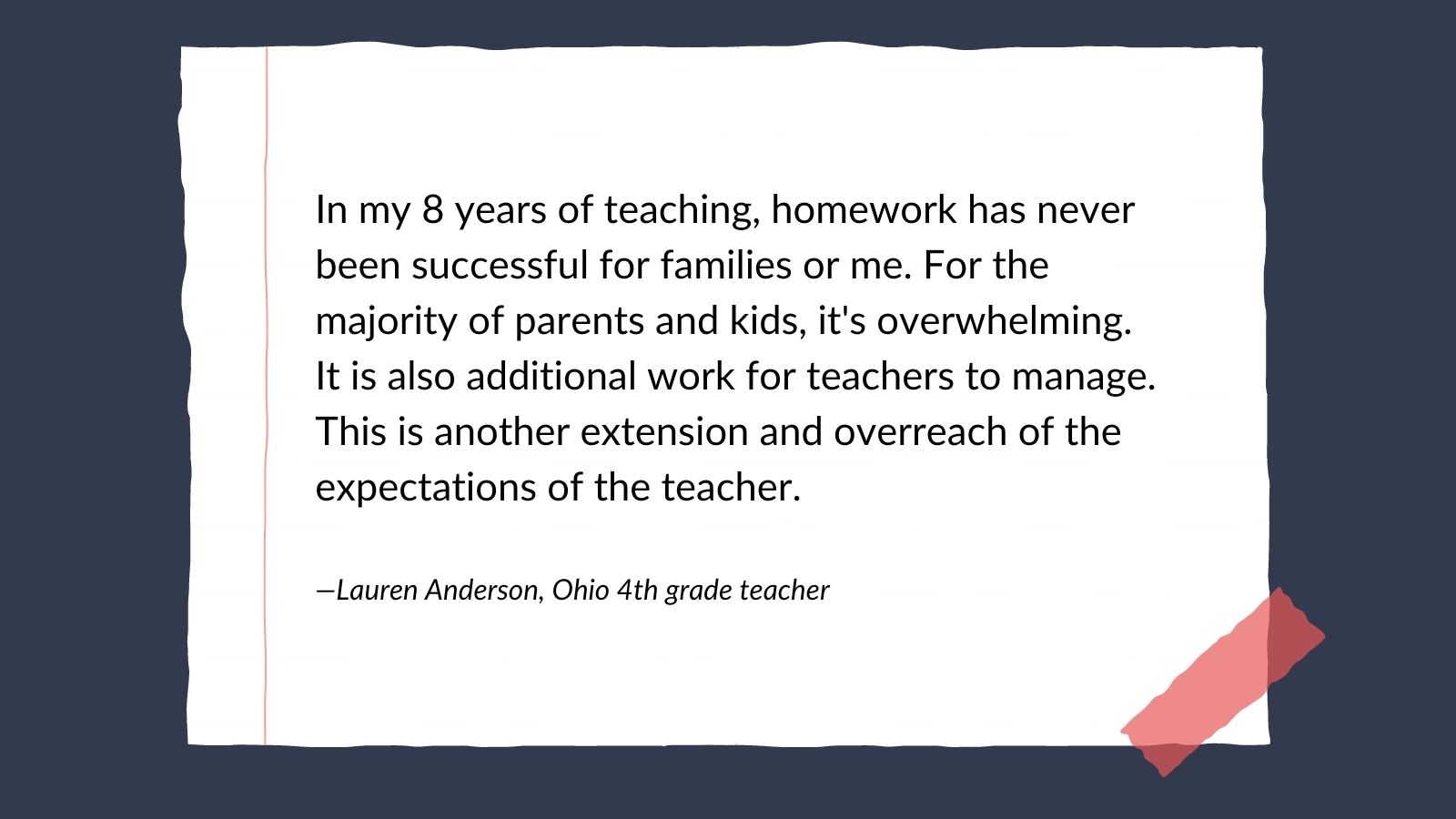
Every kid dreams of it: “Homework banned forevermore!” For as long as anyone can remember, homework has just been one of those things kids have to do because it’s good for them, like eating their vegetables. But is it really as important to do hours of homework every night as it is to eat broccoli and carrots? New research suggests homework might not have a whole lot of value. This leads to a big question: Should we ban homework?
“I think parents already have enough stress just in providing for their families!” says one Arizona 1st grade teacher. “I can imagine one more chore of having to sit down and do homework with their child would add that much more stress. Kids don’t like doing homework, so it frustrates them, which in turn frustrates parents. They spend time fighting about homework that they could be spending quality time over a board game or family meal!”
We wanted to know more, as every educator should. So, we combed through recent research to see what experts say, and explored the news to see what schools in the United States and abroad have tried. Plus, we asked 40+ active K-12 educators to share their thoughts. Here’s what we found out.
Does homework actually work?
This is one of the biggest questions people have around homework bans. Is it worth the time students are spending on it? How many kids actually do it consistently? How involved do parents need to be? In short: Does homework have value?
What the Research Says
Educators first started asking serious questions about homework more than 20 years ago, when an article that evaluated decades of research on homework suggested that it might not be as effective as we thought, at least in the lower grades . But other studies on homework indicate that students who do homework as assigned have higher academic outcomes overall, especially in grades 7 through 12.
What Real Educators Say
Most of the teachers that responded to our survey felt homework (especially for upper grades) does have at least some value. Many, though, were less concerned with academic benefits and more with developing general life skills like time management and responsibility.
- “For older students, reasonable homework that is preparation for class the next day helps students learn how to manage their time, meet deadlines, and take responsibility for their learning. I am a fan of flipped learning—students watch the lesson for homework and then use class time to ask questions, work together, work with their teacher, and do the work.” —Julie Mason, MS/HS English teacher
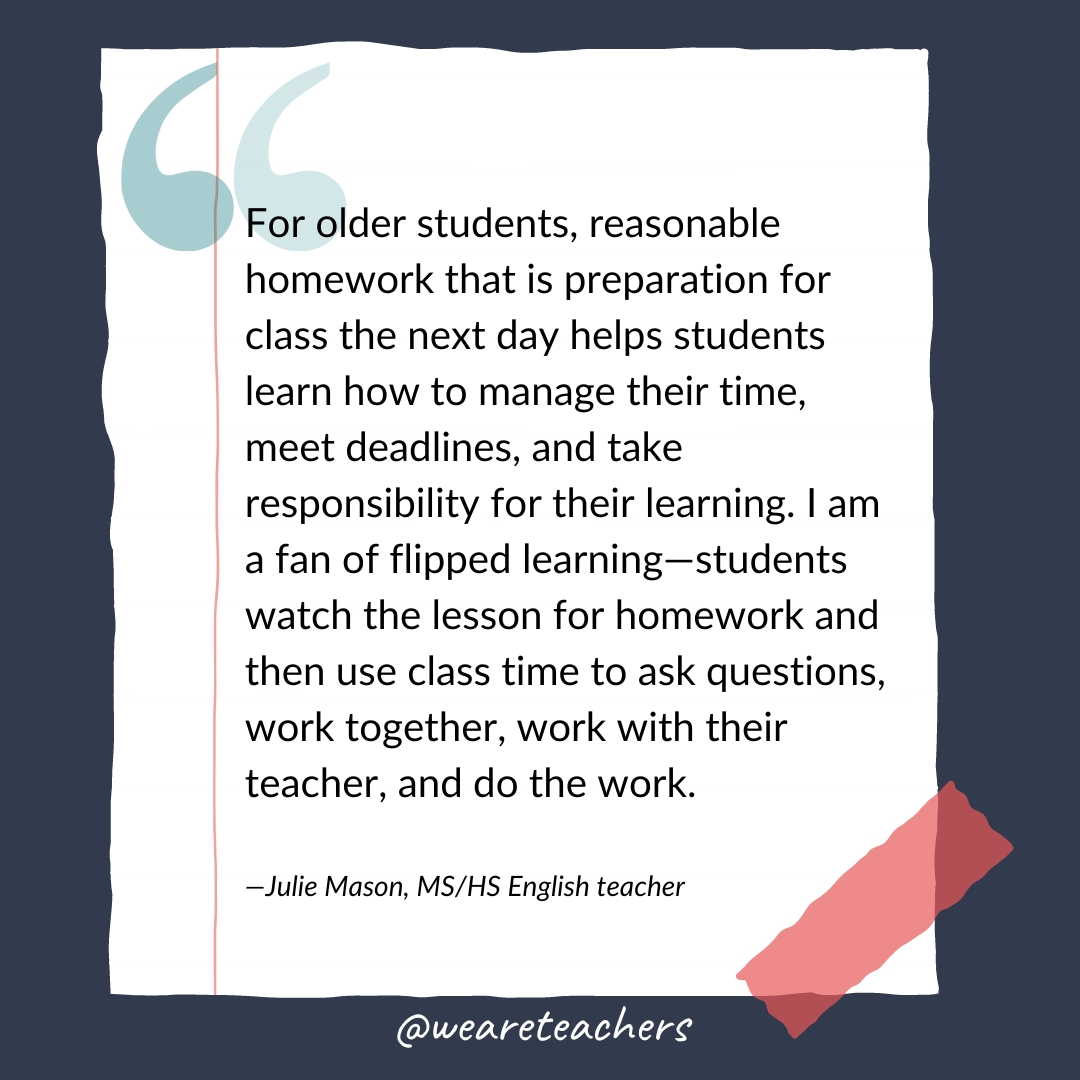
- “In middle school and high school, homework is important because it helps build stamina and potential study habits for college or trade schools.” —Desiree T., elementary teacher
- “Homework is good practice for subjects like math. In other subjects, it is good for reviewing subject matter.” —Ohio 8th grade social studies teacher
- “The proper amount of homework that is relevant to the daily lessons will help reinforce the skill and allow parents to see what their child is learning.” —Joanie B., Texas 4th/6th grade teacher
- “It’s not beneficial; parents today have not been taught how to help with new strategies. They are also often so busy that they cannot be bothered to help so they just give the answers. I saw a lot of this during the pandemic and even after when I would have 1st graders tell me they knew the answer ‘because they just know it.’ Not to mention the students who would actually benefit from having the extra practice of homework oftentimes do not have the support at home.” —Georgia 3rd grade teacher
- “In my 8 years of teaching, homework has never been successful for families or me. For the majority of parents and kids, it’s overwhelming. It is also additional work for teachers to manage. This is another extension and overreach of the expectations of the teacher.” —Lauren Anderson, Ohio 4th grade teacher
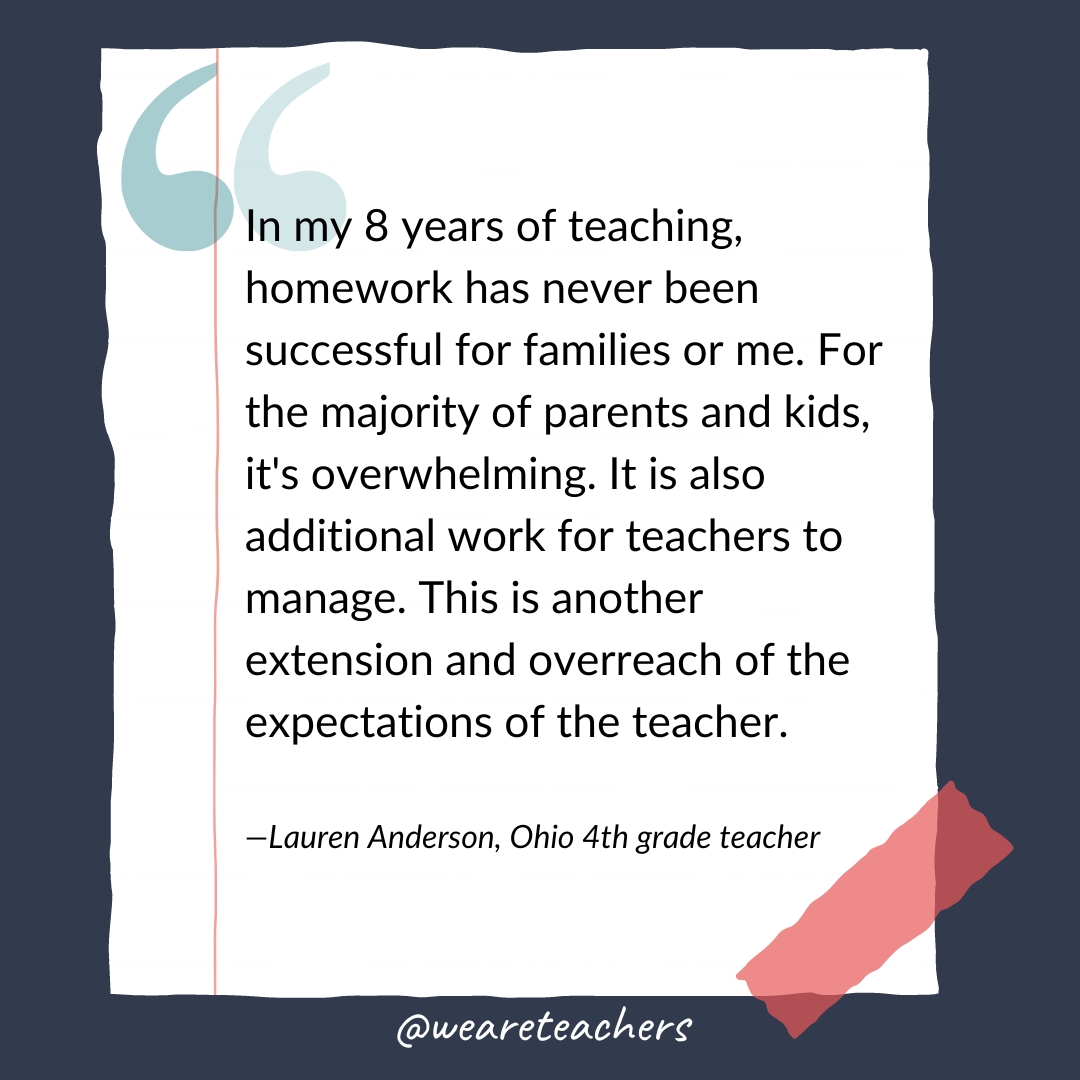
- “Homework isn’t busy work. How will today’s youth become tomorrow’s leaders (or survive college/trades classes) if they aren’t practicing skills to the next level?” —Arizona 1st grade teacher
Should we ban homework in elementary school?
Most adults today didn’t have homework in kindergarten, so they’re surprised when their child arrives home with a backpack full of worksheets. Older elementary students frequently bring home big projects like making a diorama or creating a family tree, something that usually means a lot of parent involvement. Is homework at this age reasonable and meaningful?
Supporters of a homework ban often cite research from John Hattie, who concluded that elementary school homework has no effect on academic progress. In a podcast he said, “Homework in primary school has an effect of around zero … It’s one of those lower hanging fruits that we should be looking in our primary schools to say, ‘Is it really making a difference?’”
The general wisdom these days seems to point to less homework overall at the elementary level, with one huge exception: reading. The research agrees: kids need to read at home as well as at school. Most educators recommend kids spend at least 20 minutes reading at home every single day.
More than half of our survey respondents (56%) are in favor of banning homework for the elementary grades. They worried about kids not having support or resources at home and taking away their time for creative play or family activities. But some teachers still find value in elementary homework, especially for math and reading, as long as it’s minimal.
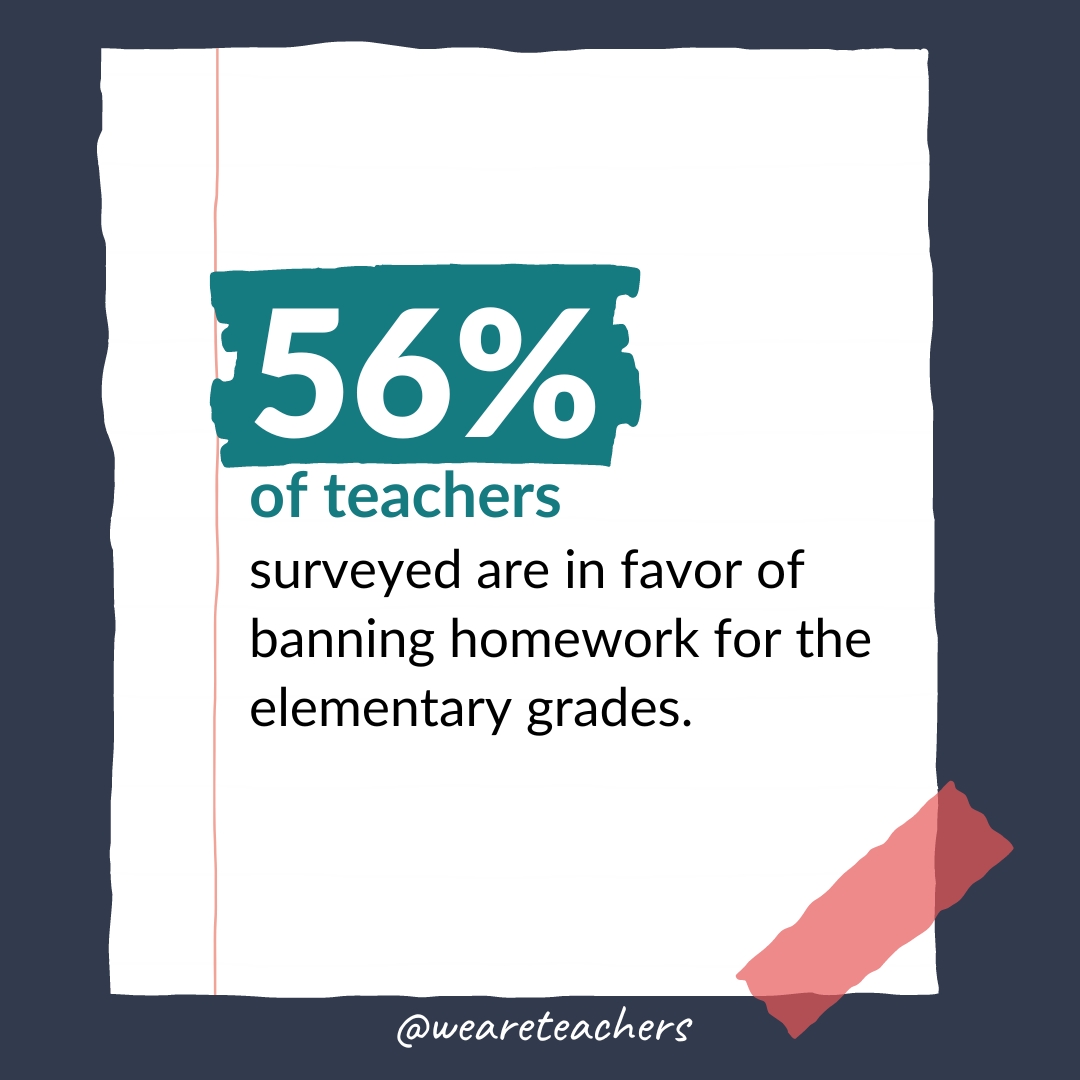
- “The common push for homework in elementary schools is ‘to prepare them for high school.’ That’s overreach. The elementary child’s job is to be an elementary child. We need to teach children where they are.” —Lauren Anderson
- “In elementary school, there should be a mixture of homework and unhomework activities. For example, a homework menu with a list of activities to complete for the month or for the week: Read in pajamas for 20 minutes, complete 3 math sheets, help cook dinner, have a family movie night, write your first and last name 10 times, help pack your snack, etc.” —Desiree T.
- “No homework should be part of the teacher motto—work smarter, not harder. Teachers spend too much time grading homework. I believe teachers and students should commit to making every minute count in the classroom so everyone can go home and just be with family.” —Jennifer N., 5th grade teacher
- “Students are learning new concepts. There is not a guarantee that someone will be able to help them with these tasks. Practicing incorrectly is worse than no practice at all.” —High school resource specialist
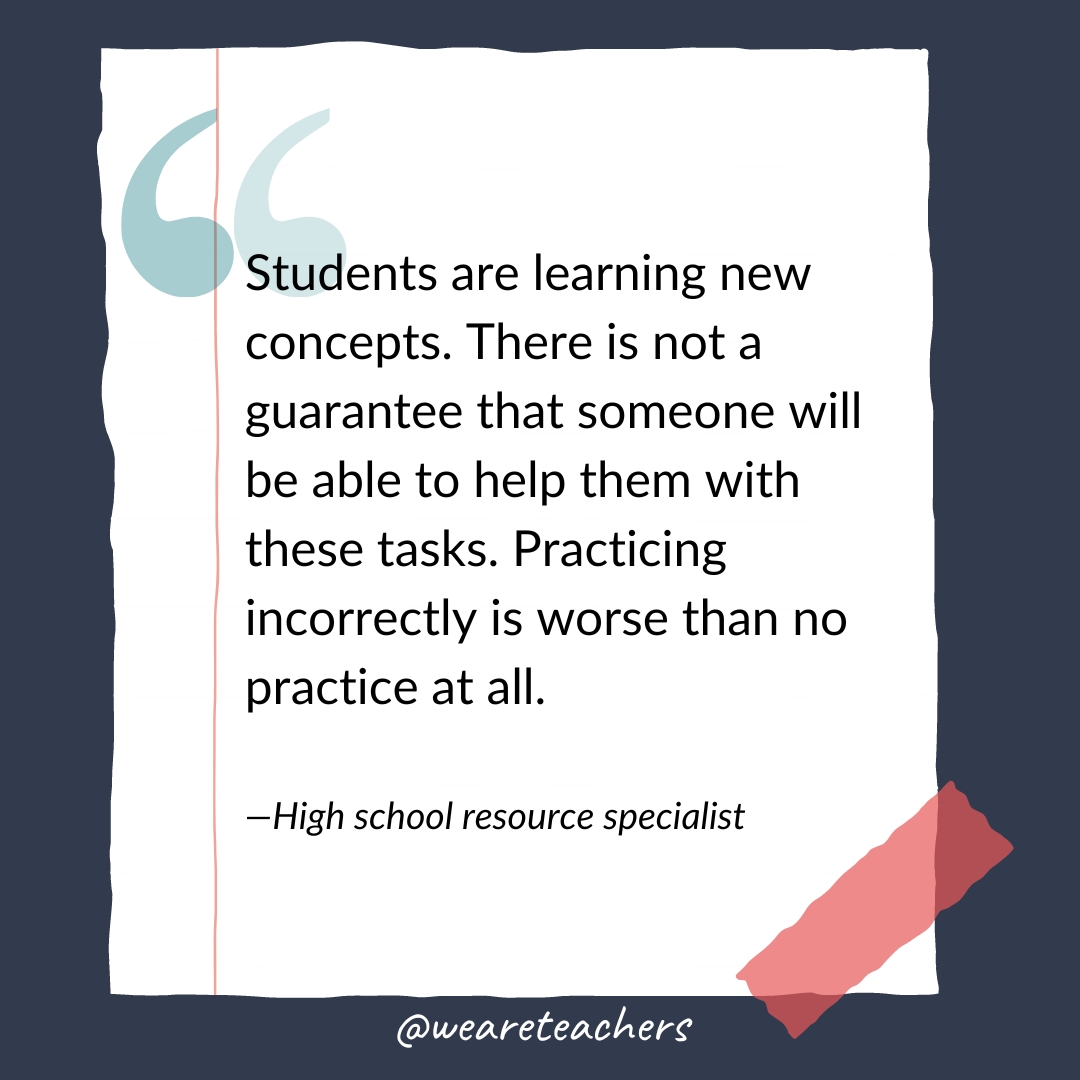
- “Kids should be encouraged to read [at home] and spend time with families and friends.” —Elementary English language development teacher
How much homework is enough (or too much)?
If we agree that that answer to “should we ban homework altogether” is “no,” then how much homework is reasonable? The answer seems to vary by grade level, as you would expect. But many point out the need to focus on the quality of homework over the quantity. And there have been increasing calls to let kids enjoy their longer school breaks without homework hanging over their heads .
A 2019 study showed that teenagers have doubled the amount of time they spend on homework since the 1990s. This study found that teens spend about an hour a day doing homework on average, which many would argue isn’t unreasonable. But in another study , kids self-reported doing an average of three hours of homework a night, which seems a lot more significant.
The National PTA and the NEA recommend kids do about 10 minutes of homework per night per grade level. In other words, a 3rd grader should do 30 minutes of homework. A 12th grader would do 120 minutes, or two full hours.
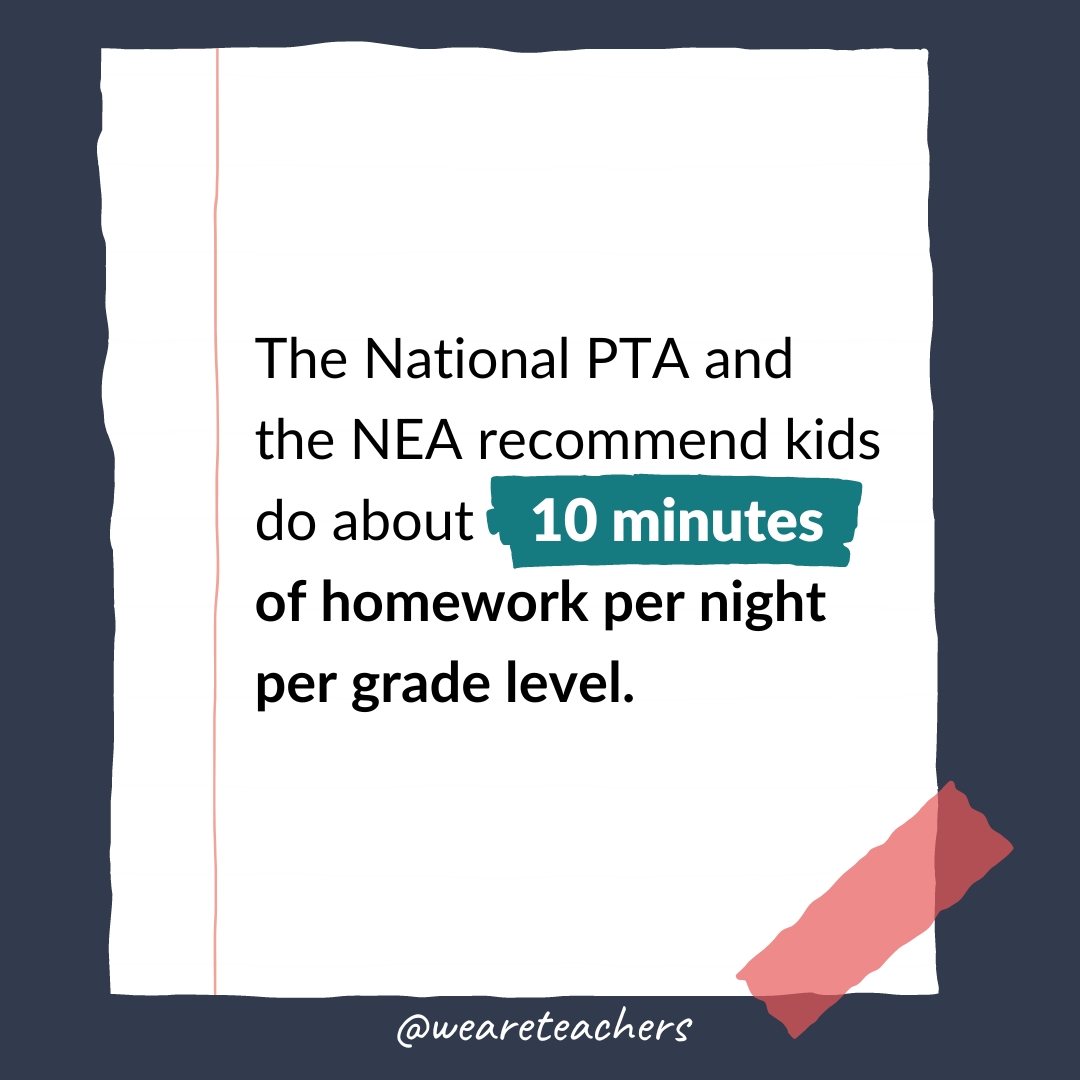
Perhaps more important than “How much homework?” is “What kind of homework?” Meaningful practice of what kids learned in class that day can be helpful. Busywork is not. And assigning really difficult work for kids to tackle at home, without any help from a teacher or other expert voice, is likely to simply frustrate them. Unfortunately, most teachers don’t receive training on how to assign homework that is meaningful and relevant to students. This is another area where we really need to consider a major culture shift.
While 75% of those surveyed say homework has some value in the upper grades at least, most feel it shouldn’t be excessive. Teachers stressed that it should never be used as punishment. Plus, it’s important to remember not all kids have the same access to help and resources outside the classroom.
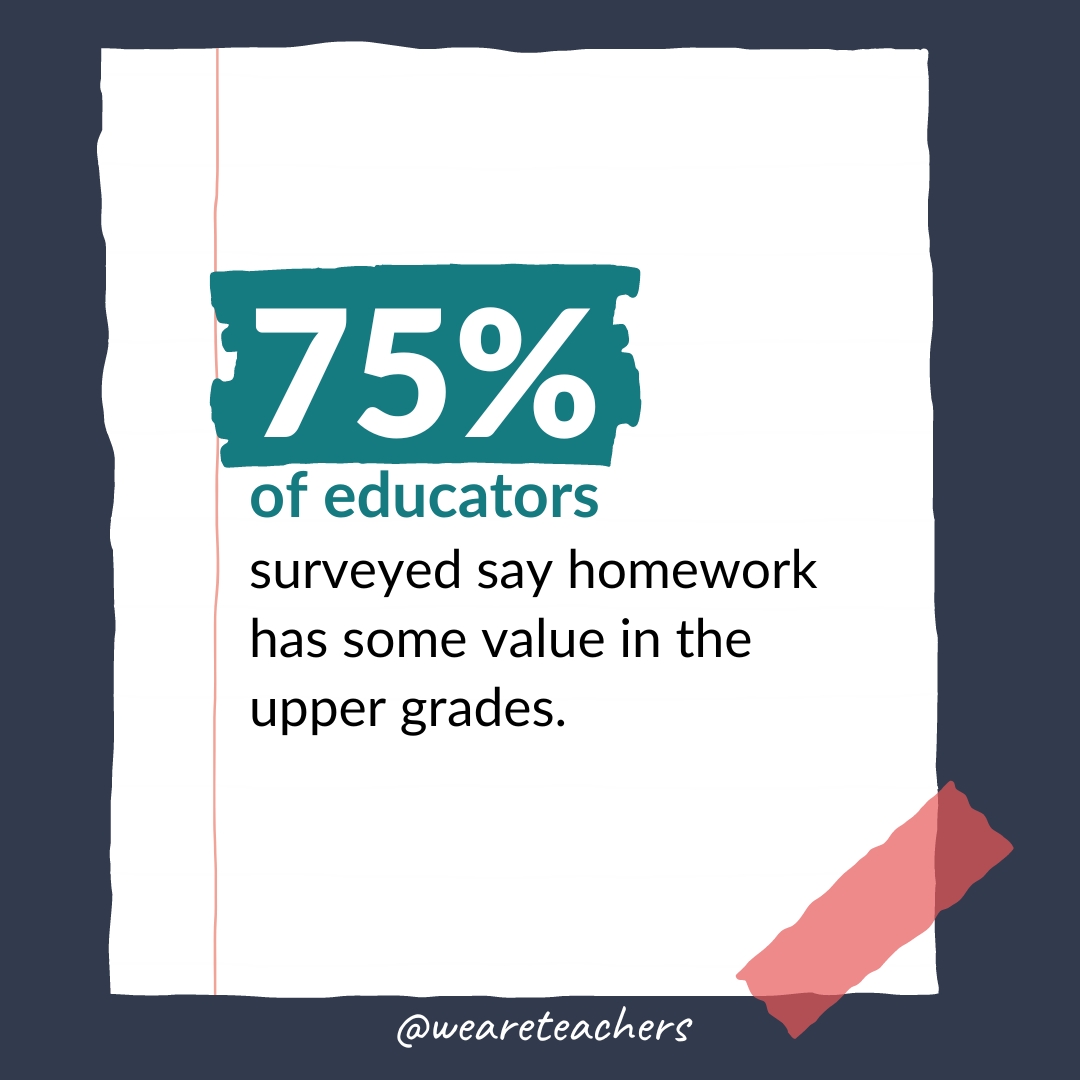
- “Homework is important but I also believe it shouldn’t exceed 30-60 minutes a night.” —Desiree T.
- “I do think elementary students should practice their reading and maybe 10 minutes of math [at home]. That may look different for each child due to how long it may take them to complete something.” —Wisconsin elementary special education teacher
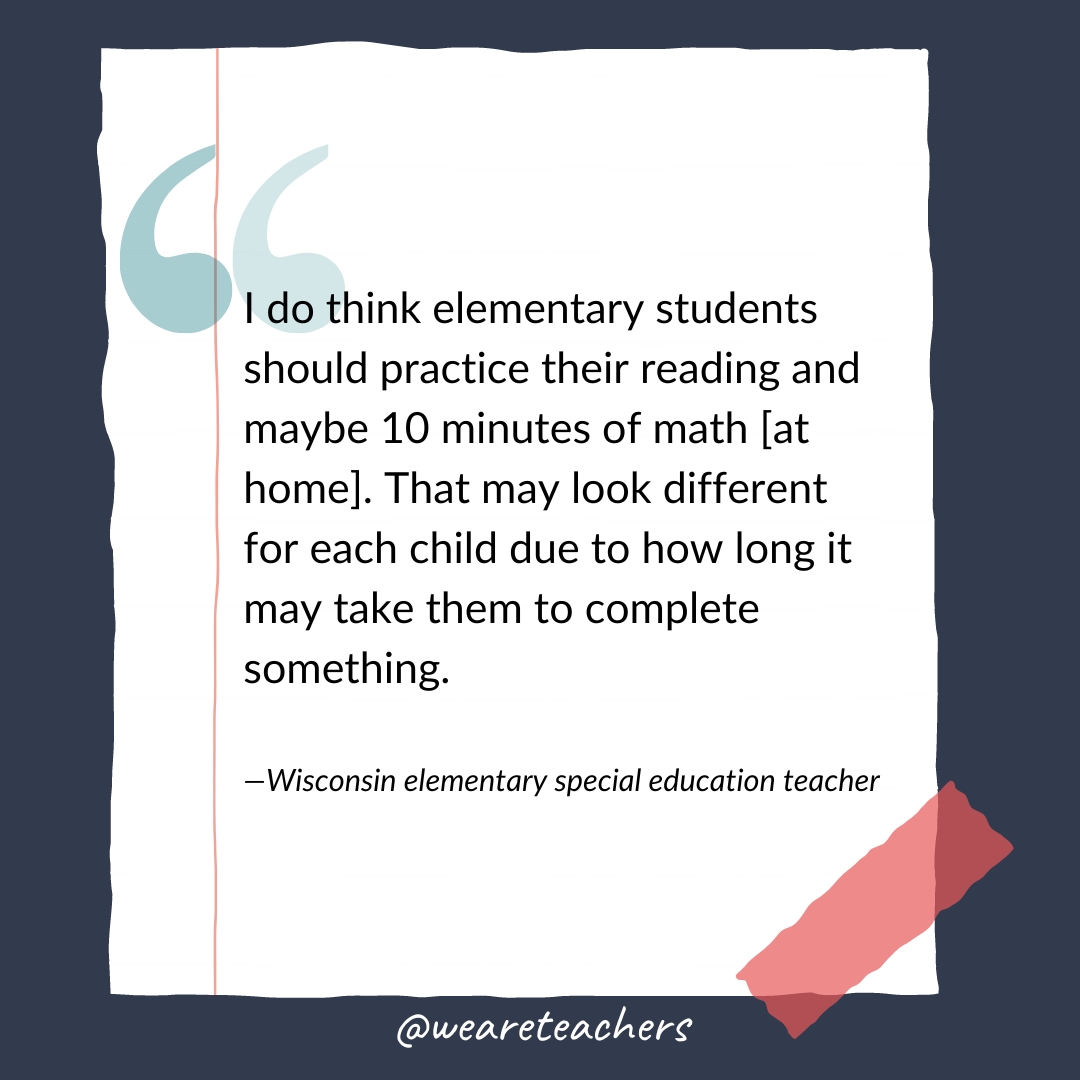
- “Elementary students are not too young to have homework once or twice a week. More than that would be too much.” —Tanya T., HS ELA teacher
- “In order to prepare students for high school, I feel 20-30 minutes of homework is okay [in elementary school].” —Florida 5th grade teacher
- “A ton of homework in every subject is ridiculous. But having to read parts of a book or an article and do several math problems should not be burdensome. And the benefit of those two things has been documented.” —Teresa Rennie, Pennsylvania 8th grade teacher
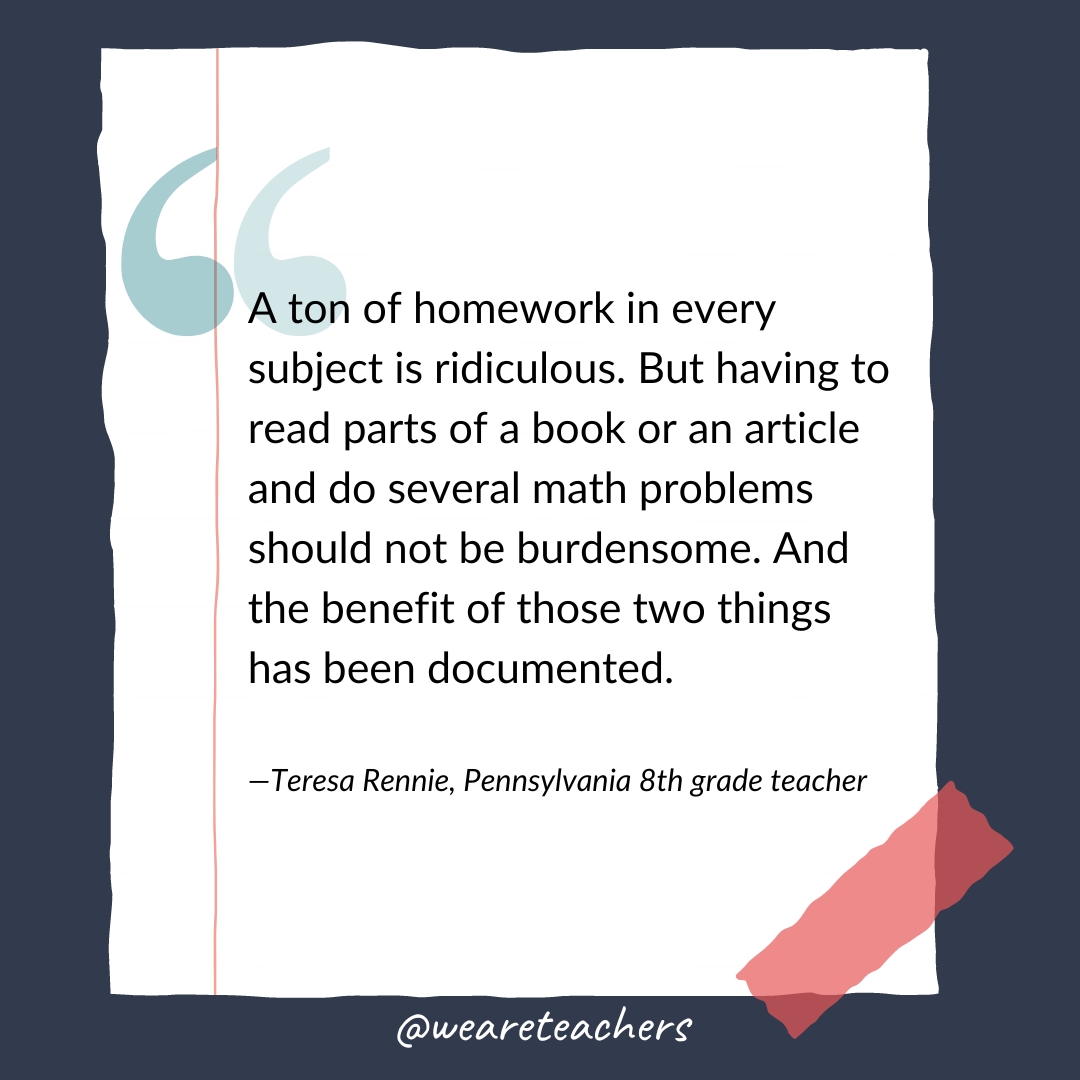
- “I encourage my elementary students to read a little every day to develop a love of reading.” —Meenal Parikh, Ohio 1st grade teacher
- “I think some homework is reasonable. Should it be a hindrance to other other activities or a major inconvenience? No. Some is good, but it doesn’t need to be an every-night thing.” —Patrick Danz, Michigan high school ELA teacher
Are there benefits to less (or no) homework?
Some schools have already banned homework, both in the United States and around the world. In April 2024, Poland enacted a homework ban for students in grades 1 through 3. In grades 4 through 8, homework must be optional and can’t count toward a student’s grade. Finnish schools are famous for assigning less homework at all ages , yet continuing to score highly in international rankings. So what are the benefits of freeing kids from homework?
Prioritizing mental health is at the forefront of the homework ban movement. Leaders say they want to give students time to develop other hobbies, relationships, and balance in their lives. When two Utah elementary schools officially banned homework , they found psychologist referrals for anxiety decreased by more than 50%.
In some cases, less or no homework can even have a positive effect on academic outcomes. One high school math teacher dramatically reduced the number of practice problems he asked his students to tackle at home. He also decreased the impact of homework on grades (from 25% to 1%). Now kids had more time to spend on just a few practice problems, and they weren’t stressed about getting them wrong. The result of changes like these? Higher standardized test scores on average.
Some schools have experimented with extending the school day in exchange for eliminating homework. This ensures that kids have more time to do independent work while also ensuring access to expert assistance. After all, not all parents have the time or ability to help with homework. And Internet access isn’t a given in every household. Keeping schoolwork at school means giving all kids equal access to the resources they need.
Teachers worry that kids who spend too much time doing homework are losing out in other areas. They want younger students to have more time to play. Older kids should be able to decompress after spending hours in the classroom. And everyone deserves more opportunities for family time and extracurriculars.
- “The stress and time surrounding homework is unnecessary. Jobs don’t require you take work home so school shouldn’t either. If a kid needs to work more, school could reach out with extra help, but homework is a waste of time. Home is for family time.” —Stephanie G., Maryland 1st grade teacher
- “Homework creates an equity problem. Not all learners have access to the same environment or supports at home as they do in school. The students who have supportive parents and resources (tutors, etc.) will succeed, while others will be penalized.” —Illinois high school teacher
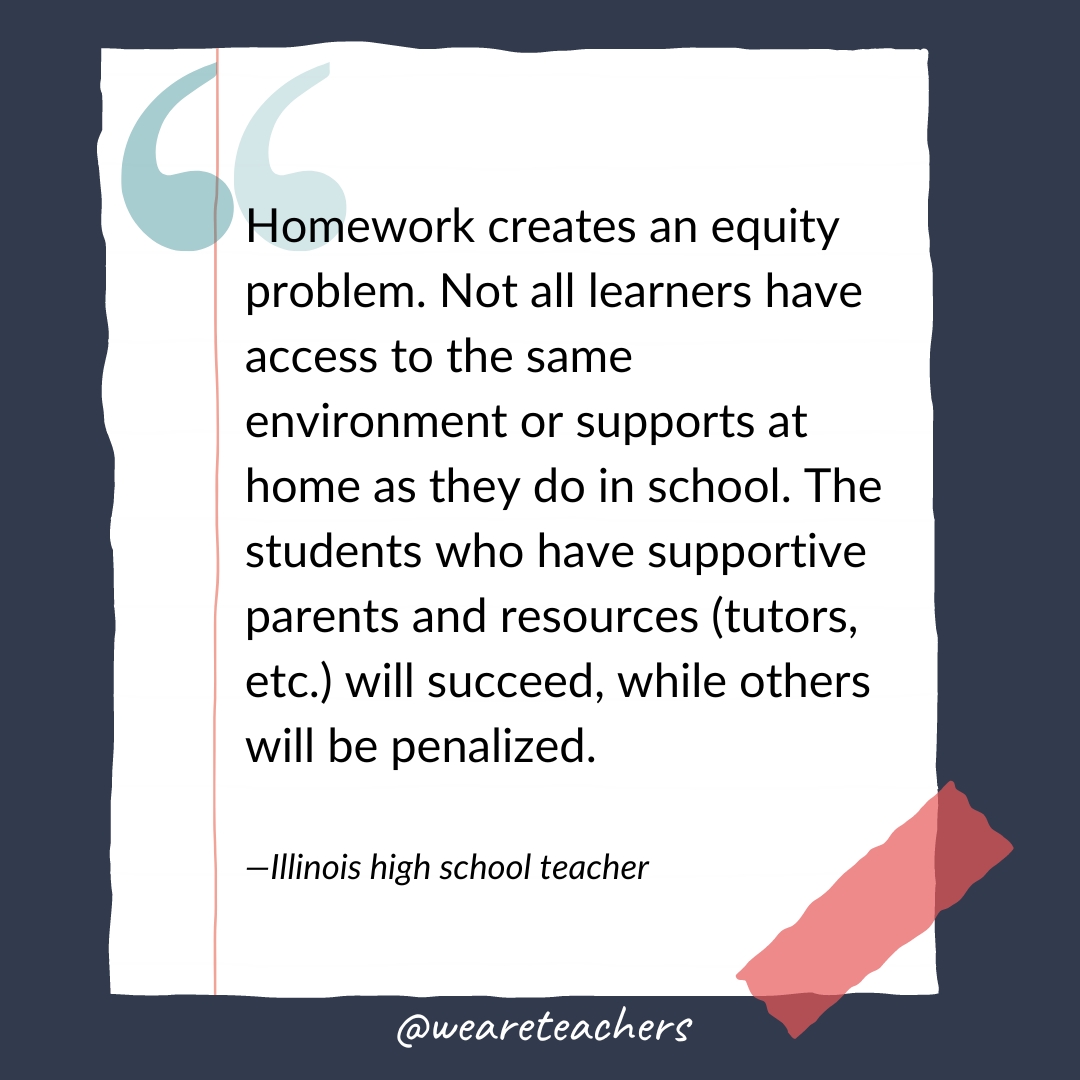
- “If they work at school, they don’t need to work at home. We’re teaching them that it’s okay for someone to tell them how to spend their off-time. School is their job. I don’t like working for free; why should they think that it’s okay?” —North Carolina 1st grade teacher
- “After-school programs, sports, and unstructured play is MUCH more meaningful and impactful for these generations of students.” —Lauren Anderson
- “There are other ways to teach children responsibility and time management than completing homework that will most likely be ungraded.” —4th grade social studies teacher
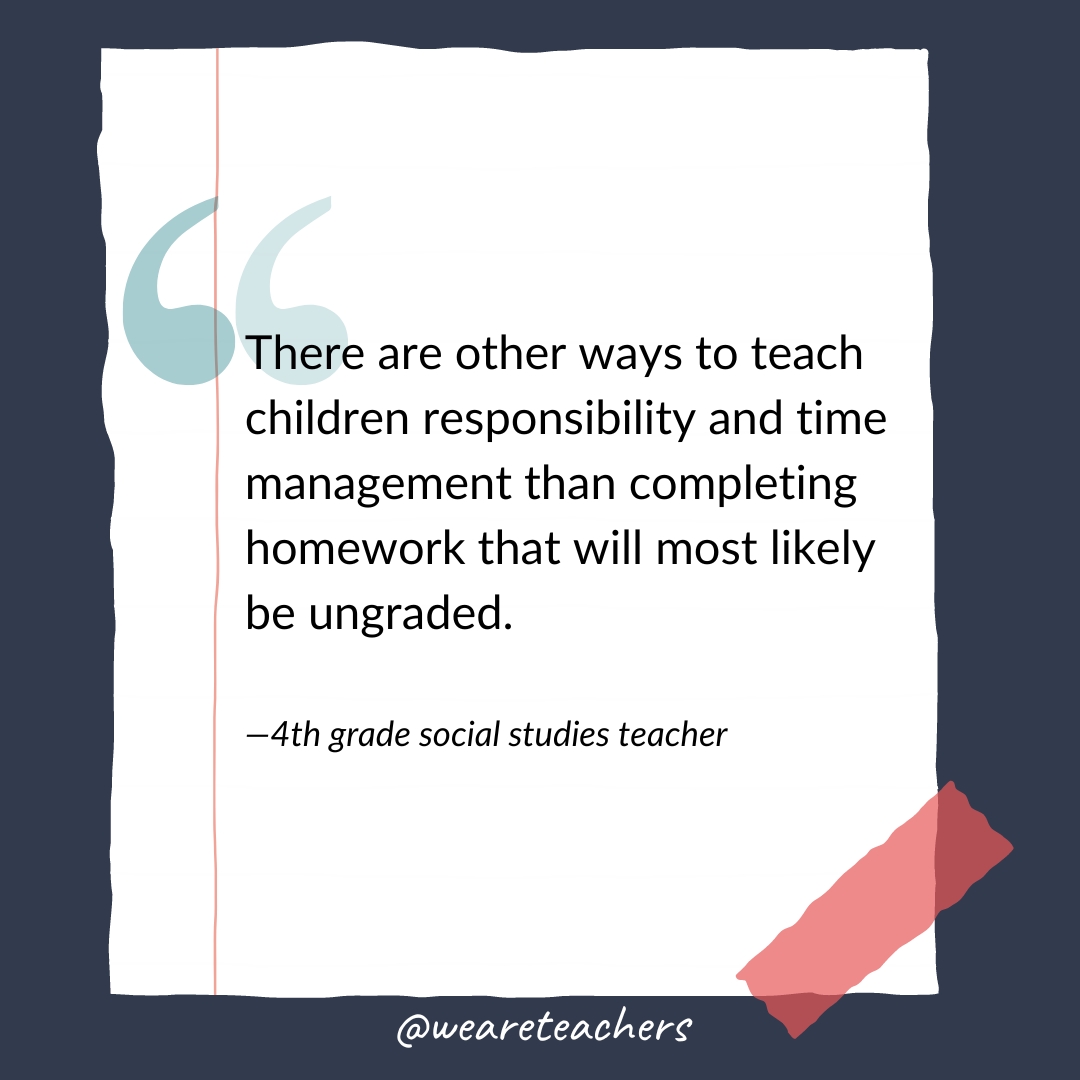
One Teacher’s Take on the Value of Homework: More Cons Than Pros
One 4th grade social studies teacher from North Carolina shared their thoughts with us in detail. We felt they were worth sharing with a wider audience. (Note: We’ve edited and condensed their words for space and clarity.)
Homework Hurts Families
“There are multiple factors that work together that make homework detrimental to students and their families. Children need to spend time with their parents building relationships of trust and respect. It is difficult because during the limited time families have together, they are forced by the schools to give that up to deal with homework.
“Many parents are unable to answer homework questions to help their children as methodology has changed and evolved. Homework becomes a stressful battlefield. Children with ADHD, autism, and other challenges have such a difficult time keeping focus at school. When they have to do additional work at home, there are increased meltdowns and battles, putting further strains on families.”
Homework’s Time Cost
“Children also have less time to complete work at home due to how overscheduled families have become. Children as young as 3rd grade arrive home from their games as late as 10:00 at night. That is often their first opportunity to sit down to complete their work. When they come to school the next day, they become irritable, unfocused, frustrated, and unable to quickly grasp new material.
“In older grades, teachers don’t plan together and don’t understand how much is required of the student to complete each night. If a high school student has six classes and each teacher assigns only 30 minutes of homework each night, that adds up to three hours. I hear of many teachers that each give an hour each night. I don’t see how it is possible for a high school student to complete six hours of homework every night.
“The additional stress of homework for the teacher, students, and families is not worth it. Give families time to spend together, and free up teacher time by not having to hunt down missing work and reviewing what they are not grading. Allow children to have a better bedtime and avoid meltdowns at home, which lead to additional stress, anxiety, and depression.”
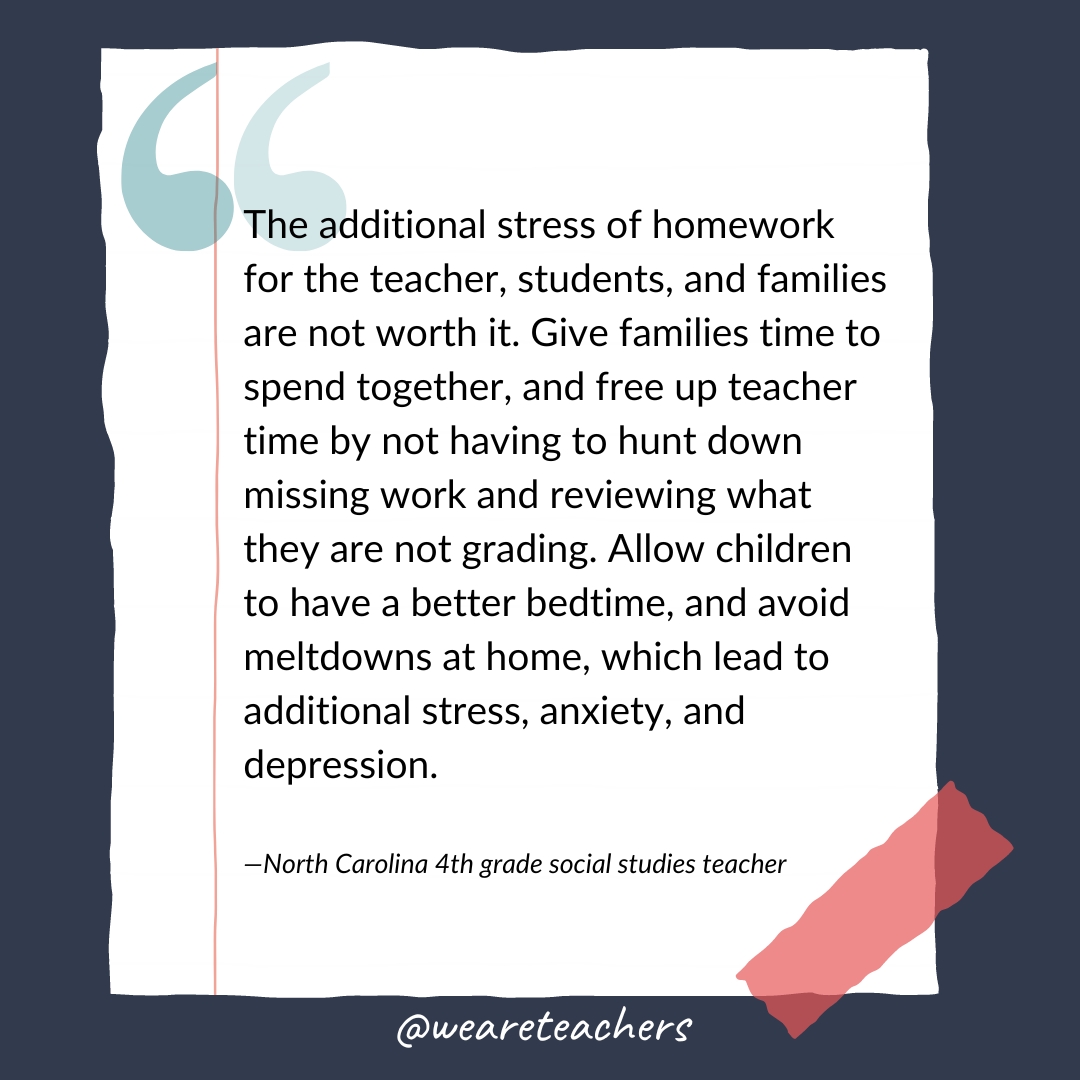
We’d love to hear your thoughts—should homework be banned? Join the discussion in the We Are Teachers HELPLINE group on Facebook.
You might also like.
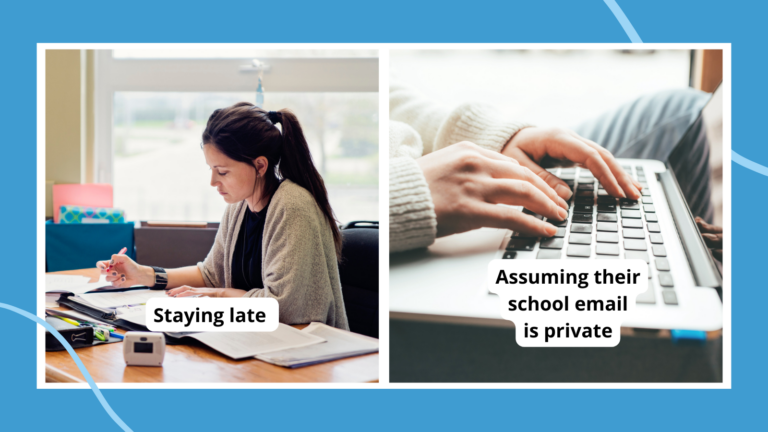
15 Things Educators Should Stop Doing, According to Principals
Their answers might surprise you. Continue Reading
Copyright © 2024. All rights reserved. 5335 Gate Parkway, Jacksonville, FL 32256
11 Surprising Homework Statistics, Facts & Data

Chris Drew (PhD)
Dr. Chris Drew is the founder of the Helpful Professor. He holds a PhD in education and has published over 20 articles in scholarly journals. He is the former editor of the Journal of Learning Development in Higher Education. [Image Descriptor: Photo of Chris]
Learn about our Editorial Process

The age-old question of whether homework is good or bad for students is unanswerable because there are so many “ it depends ” factors.
For example, it depends on the age of the child, the type of homework being assigned, and even the child’s needs.
There are also many conflicting reports on whether homework is good or bad. This is a topic that largely relies on data interpretation for the researcher to come to their conclusions.
To cut through some of the fog, below I’ve outlined some great homework statistics that can help us understand the effects of homework on children.
Homework Statistics List
1. 45% of parents think homework is too easy for their children.
A study by the Center for American Progress found that parents are almost twice as likely to believe their children’s homework is too easy than to disagree with that statement.
Here are the figures for math homework:
- 46% of parents think their child’s math homework is too easy.
- 25% of parents think their child’s math homework is not too easy.
- 29% of parents offered no opinion.
Here are the figures for language arts homework:
- 44% of parents think their child’s language arts homework is too easy.
- 28% of parents think their child’s language arts homework is not too easy.
- 28% of parents offered no opinion.
These findings are based on online surveys of 372 parents of school-aged children conducted in 2018.
2. 93% of Fourth Grade Children Worldwide are Assigned Homework
The prestigious worldwide math assessment Trends in International Maths and Science Study (TIMSS) took a survey of worldwide homework trends in 2007. Their study concluded that 93% of fourth-grade children are regularly assigned homework, while just 7% never or rarely have homework assigned.
3. 17% of Teens Regularly Miss Homework due to Lack of High-Speed Internet Access
A 2018 Pew Research poll of 743 US teens found that 17%, or almost 2 in every 5 students, regularly struggled to complete homework because they didn’t have reliable access to the internet.
This figure rose to 25% of Black American teens and 24% of teens whose families have an income of less than $30,000 per year.
4. Parents Spend 6.7 Hours Per Week on their Children’s Homework
A 2018 study of 27,500 parents around the world found that the average amount of time parents spend on homework with their child is 6.7 hours per week. Furthermore, 25% of parents spend more than 7 hours per week on their child’s homework.
American parents spend slightly below average at 6.2 hours per week, while Indian parents spend 12 hours per week and Japanese parents spend 2.6 hours per week.
5. Students in High-Performing High Schools Spend on Average 3.1 Hours per night Doing Homework
A study by Galloway, Conner & Pope (2013) conducted a sample of 4,317 students from 10 high-performing high schools in upper-middle-class California.
Across these high-performing schools, students self-reported that they did 3.1 hours per night of homework.
Graduates from those schools also ended up going on to college 93% of the time.
6. One to Two Hours is the Optimal Duration for Homework
A 2012 peer-reviewed study in the High School Journal found that students who conducted between one and two hours achieved higher results in tests than any other group.
However, the authors were quick to highlight that this “t is an oversimplification of a much more complex problem.” I’m inclined to agree. The greater variable is likely the quality of the homework than time spent on it.
Nevertheless, one result was unequivocal: that some homework is better than none at all : “students who complete any amount of homework earn higher test scores than their peers who do not complete homework.”
7. 74% of Teens cite Homework as a Source of Stress
A study by the Better Sleep Council found that homework is a source of stress for 74% of students. Only school grades, at 75%, rated higher in the study.
That figure rises for girls, with 80% of girls citing homework as a source of stress.
Similarly, the study by Galloway, Conner & Pope (2013) found that 56% of students cite homework as a “primary stressor” in their lives.
8. US Teens Spend more than 15 Hours per Week on Homework
The same study by the Better Sleep Council also found that US teens spend over 2 hours per school night on homework, and overall this added up to over 15 hours per week.
Surprisingly, 4% of US teens say they do more than 6 hours of homework per night. That’s almost as much homework as there are hours in the school day.
The only activity that teens self-reported as doing more than homework was engaging in electronics, which included using phones, playing video games, and watching TV.
9. The 10-Minute Rule
The National Education Association (USA) endorses the concept of doing 10 minutes of homework per night per grade.
For example, if you are in 3rd grade, you should do 30 minutes of homework per night. If you are in 4th grade, you should do 40 minutes of homework per night.
However, this ‘rule’ appears not to be based in sound research. Nevertheless, it is true that homework benefits (no matter the quality of the homework) will likely wane after 2 hours (120 minutes) per night, which would be the NEA guidelines’ peak in grade 12.
10. 21.9% of Parents are Too Busy for their Children’s Homework
An online poll of nearly 300 parents found that 21.9% are too busy to review their children’s homework. On top of this, 31.6% of parents do not look at their children’s homework because their children do not want their help. For these parents, their children’s unwillingness to accept their support is a key source of frustration.
11. 46.5% of Parents find Homework too Hard
The same online poll of parents of children from grades 1 to 12 also found that many parents struggle to help their children with homework because parents find it confusing themselves. Unfortunately, the study did not ask the age of the students so more data is required here to get a full picture of the issue.
Get a Pdf of this article for class
Enjoy subscriber-only access to this article’s pdf
Interpreting the Data
Unfortunately, homework is one of those topics that can be interpreted by different people pursuing differing agendas. All studies of homework have a wide range of variables, such as:
- What age were the children in the study?
- What was the homework they were assigned?
- What tools were available to them?
- What were the cultural attitudes to homework and how did they impact the study?
- Is the study replicable?
The more questions we ask about the data, the more we realize that it’s hard to come to firm conclusions about the pros and cons of homework .
Furthermore, questions about the opportunity cost of homework remain. Even if homework is good for children’s test scores, is it worthwhile if the children consequently do less exercise or experience more stress?
Thus, this ends up becoming a largely qualitative exercise. If parents and teachers zoom in on an individual child’s needs, they’ll be able to more effectively understand how much homework a child needs as well as the type of homework they should be assigned.
Related: Funny Homework Excuses
The debate over whether homework should be banned will not be resolved with these homework statistics. But, these facts and figures can help you to pursue a position in a school debate on the topic – and with that, I hope your debate goes well and you develop some great debating skills!

- Chris Drew (PhD) https://helpfulprofessor.com/author/chris-drew-phd/ 60 Would you Rather Questions for Students (Of all Ages)
- Chris Drew (PhD) https://helpfulprofessor.com/author/chris-drew-phd/ 25 Classroom Games Ideas for High School
- Chris Drew (PhD) https://helpfulprofessor.com/author/chris-drew-phd/ 25 Classroom Games Ideas for Middle School
- Chris Drew (PhD) https://helpfulprofessor.com/author/chris-drew-phd/ 25 Classroom Games Ideas (For Elementary School)
Leave a Comment Cancel Reply
Your email address will not be published. Required fields are marked *
- Subscribe to BBC Science Focus Magazine
- Previous Issues
- Future tech
- Everyday science
- Planet Earth
- Newsletters
© Getty Images
Should homework be banned?
Social media has sparked into life about whether children should be given homework - should students be freed from this daily chore? Dr Gerald Letendre, a professor of education at Pennsylvania State University, investigates.
We’ve all done it: pretended to leave an essay at home, or stayed up until 2am to finish a piece of coursework we’ve been ignoring for weeks. Homework, for some people, is seen as a chore that’s ‘wrecking kids’ or ‘killing parents’, while others think it is an essential part of a well-rounded education. The problem is far from new: public debates about homework have been raging since at least the early-1900s, and recently spilled over into a Twitter feud between Gary Lineker and Piers Morgan.
Ironically, the conversation surrounding homework often ignores the scientific ‘homework’ that researchers have carried out. Many detailed studies have been conducted, and can guide parents, teachers and administrators to make sensible decisions about how much work should be completed by students outside of the classroom.
So why does homework stir up such strong emotions? One reason is that, by its very nature, it is an intrusion of schoolwork into family life. I carried out a study in 2005, and found that the amount of time that children and adolescents spend in school, from nursery right up to the end of compulsory education, has greatly increased over the last century . This means that more of a child’s time is taken up with education, so family time is reduced. This increases pressure on the boundary between the family and the school.
Plus, the amount of homework that students receive appears to be increasing, especially in the early years when parents are keen for their children to play with friends and spend time with the family.
Finally, success in school has become increasingly important to success in life. Parents can use homework to promote, or exercise control over, their child’s academic trajectory, and hopefully ensure their future educational success. But this often leaves parents conflicted – they want their children to be successful in school, but they don’t want them to be stressed or upset because of an unmanageable workload.

However, the issue isn’t simply down to the opinions of parents, children and their teachers – governments also like to get involved. In the autumn of 2012, French president François Hollande hit world headlines after making a comment about banning homework, ostensibly because it promoted inequality. The Chinese government has also toyed with a ban, because of concerns about excessive academic pressure being put on children.
The problem is, some politicians and national administrators regard regulatory policy in education as a solution for a wide array of social, economic and political issues, perhaps without considering the consequences for students and parents.
Does homework work?
Homework seems to generally have a positive effect for high school students, according to an extensive range of empirical literature. For example, Duke University’s Prof Harris Cooper carried out a meta-analysis using data from US schools, covering a period from 1987 to 2003. He found that homework offered a general beneficial impact on test scores and improvements in attitude, with a greater effect seen in older students. But dig deeper into the issue and a complex set of factors quickly emerges, related to how much homework students do, and exactly how they feel about it.
In 2009, Prof Ulrich Trautwein and his team at the University of Tübingen found that in order to establish whether homework is having any effect, researchers must take into account the differences both between and within classes . For example, a teacher may assign a good deal of homework to a lower-level class, producing an association between more homework and lower levels of achievement. Yet, within the same class, individual students may vary significantly in how much homework improves their baseline performance. Plus, there is the fact that some students are simply more efficient at completing their homework than others, and it becomes quite difficult to pinpoint just what type of homework, and how much of it, will affect overall academic performance.
Over the last century, the amount of time that children and adolescents spend in school has greatly increased
Gender is also a major factor. For example, a study of US high school students carried out by Prof Gary Natriello in the 1980s revealed that girls devote more time to homework than boys, while a follow-up study found that US girls tend to spend more time on mathematics homework than boys. Another study, this time of African-American students in the US, found that eighth grade (ages 13-14) girls were more likely to successfully manage both their tasks and emotions around schoolwork, and were more likely to finish homework.
So why do girls seem to respond more positively to homework? One possible answer proposed by Eunsook Hong of the University of Nevada in 2011 is that teachers tend to rate girls’ habits and attitudes towards work more favourably than boys’. This perception could potentially set up a positive feedback loop between teacher expectations and the children’s capacity for academic work based on gender, resulting in girls outperforming boys. All of this makes it particularly difficult to determine the extent to which homework is helping, though it is clear that simply increasing the time spent on assignments does not directly correspond to a universal increase in learning.
Can homework cause damage?
The lack of empirical data supporting homework in the early years of education, along with an emerging trend to assign more work to this age range, appears to be fuelling parental concerns about potential negative effects. But, aside from anecdotes of increased tension in the household, is there any evidence of this? Can doing too much homework actually damage children?
Evidence suggests extreme amounts of homework can indeed have serious effects on students’ health and well-being. A Chinese study carried out in 2010 found a link between excessive homework and sleep disruption: children who had less homework had better routines and more stable sleep schedules. A Canadian study carried out in 2015 by Isabelle Michaud found that high levels of homework were associated with a greater risk of obesity among boys, if they were already feeling stressed about school in general.
For useful revision guides and video clips to assist with learning, visit BBC Bitesize . This is a free online study resource for UK students from early years up to GCSEs and Scottish Highers.
It is also worth noting that too much homework can create negative effects that may undermine any positives. These negative consequences may not only affect the child, but also could also pile on the stress for the whole family, according to a recent study by Robert Pressman of the New England Centre for Pediatric Psychology. Parents were particularly affected when their perception of their own capacity to assist their children decreased.
What then, is the tipping point, and when does homework simply become too much for parents and children? Guidelines typically suggest that children in the first grade (six years old) should have no more that 10 minutes per night, and that this amount should increase by 10 minutes per school year. However, cultural norms may greatly affect what constitutes too much.
A study of children aged between 8 and 10 in Quebec defined high levels of homework as more than 30 minutes a night, but a study in China of children aged 5 to 11 deemed that two or more hours per night was excessive. It is therefore difficult to create a clear standard for what constitutes as too much homework, because cultural differences, school-related stress, and negative emotions within the family all appear to interact with how homework affects children.
Should we stop setting homework?
In my opinion, even though there are potential risks of negative effects, homework should not be banned. Small amounts, assigned with specific learning goals in mind and with proper parental support, can help to improve students’ performance. While some studies have generally found little evidence that homework has a positive effect on young children overall, a 2008 study by Norwegian researcher Marte Rønning found that even some very young children do receive some benefit. So simply banning homework would mean that any particularly gifted or motivated pupils would not be able to benefit from increased study. However, at the earliest ages, very little homework should be assigned. The decisions about how much and what type are best left to teachers and parents.
As a parent, it is important to clarify what goals your child’s teacher has for homework assignments. Teachers can assign work for different reasons – as an academic drill to foster better study habits, and unfortunately, as a punishment. The goals for each assignment should be made clear, and should encourage positive engagement with academic routines.

Parents should inform the teachers of how long the homework is taking, as teachers often incorrectly estimate the amount of time needed to complete an assignment, and how it is affecting household routines. For young children, positive teacher support and feedback is critical in establishing a student’s positive perception of homework and other academic routines. Teachers and parents need to be vigilant and ensure that homework routines do not start to generate patterns of negative interaction that erode students’ motivation.
Likewise, any positive effects of homework are dependent on several complex interactive factors, including the child’s personal motivation, the type of assignment, parental support and teacher goals. Creating an overarching policy to address every single situation is not realistic, and so homework policies tend to be fixated on the time the homework takes to complete. But rather than focusing on this, everyone would be better off if schools worked on fostering stronger communication between parents, teachers and students, allowing them to respond more sensitively to the child’s emotional and academic needs.
- Five brilliant science books for kids
- Will e-learning replace teachers?
Follow Science Focus on Twitter , Facebook , Instagram and Flipboard
Share this article

- Terms & Conditions
- Privacy policy
- Cookies policy
- Code of conduct
- Magazine subscriptions
- Manage preferences

In order to continue enjoying our site, we ask that you confirm your identity as a human. Thank you very much for your cooperation.
15 Should Homework Be Banned Pros and Cons
Homework was a staple of the public and private schooling experience for many of us growing up. There were long nights spent on book reports, science projects, and all of those repetitive math sheets. In many ways, it felt like an inevitable part of the educational experience. Unless you could power through all of your assignments during your free time in class, then there was going to be time spent at home working on specific subjects.
More schools are looking at the idea of banning homework from the modern educational experience. Instead of sending work home with students each night, they are finding alternative ways to ensure that each student can understand the curriculum without involving the uncertainty of parental involvement.
Although banning homework might seem like an unorthodox process, there are legitimate advantages to consider with this effort. There are some disadvantages which some families may encounter as well.
These are the updated lists of the pros and cons of banning homework to review.
List of the Pros of Banning Homework
1. Giving homework to students does not always improve their academic outcomes. The reality of homework for the modern student is that we do not know if it is helpful to have extra work assigned to them outside of the classroom. Every study that has looked at the subject has had design flaws which causes the data collected to be questionable at best. Although there is some information to suggest that students in seventh grade and higher can benefit from limited homework, banning it for students younger than that seems to be beneficial for their learning experience.
2. Banning homework can reduce burnout issues with students. Teachers are seeing homework stress occur in the classroom more frequently today than ever before. Almost half of all high school teachers in North America have seen this issue with their students at some point during the year. About 25% of grade school teachers say that they have seen the same thing.
When students are dealing with the impact of homework on their lives, it can have a tremendously adverse impact. One of the most cited reasons for students dropping out of school is that they cannot complete their homework on time.
3. Banning homework would increase the amount of family time available to students. Homework creates a significant disruption to family relationships. Over half of all parents in North America say that they have had a significant argument with their children over homework in the past month. 1/3 of families say that homework is their primary source of struggle in the home. Not only does it reduce the amount of time that everyone has to spend together, it reduces the chances that parents have to teach their own skills and belief systems to their kids.
4. It reduces the negative impact of homework on the health of a student. Many students suffer academically when they cannot finish a homework assignment on time. Although assumptions are often made about the time management skills of the individual when this outcome occurs, the reasons why it happens is usually more complex. It may be too difficult, too boring, or there may not be enough time in the day to complete the work.
When students experience failure in this area, it can lead to severe mental health issues. Some perceive themselves as a scholarly failure, which translates to an inability to live life successfully. It can disrupt a desire to learn. There is even an increased risk of suicide for some youth because of this issue. Banning it would reduce these risks immediately.
5. Eliminating homework would allow for an established sleep cycle. The average high school student requires between 8-10 hours of sleep to function at their best the next day. Grade-school students may require an extra hour or two beyond that figure. When teachers assign homework, then it increases the risk for each individual that they will not receive the amount that they require each night.
When children do not get enough sleep, a significant rest deficit occurs which can impact their ability to pay attention in school. It can cause unintended weight gain. There may even be issues with emotional control. Banning homework would help to reduce these risks as well.
6. It increases the amount of socialization time that students receive. People who are only spending time in school and then going home to do more work are at a higher risk of experiencing loneliness and isolation. When these emotions are present, then a student is more likely to feel “down and out” mentally and physically. They lack meaningful connections with other people. These feelings are the health equivalent of smoking 15 cigarettes per day. If students are spending time on homework, then they are not spending time connecting with their family and friends.
7. It reduces the repetition that students face in the modern learning process. Most of the tasks that homework requires of students is repetitive and uninteresting. Kids love to resolve challenges on tasks that they are passionate about at that moment in their lives. Forcing them to complete the same problems repetitively as a way to “learn” core concepts can create issues with knowledge retention later in life. When you add in the fact that most lessons sent for homework must be done by themselves, banning homework will reduce the repetition that students face, allowing for a better overall outcome.
8. Home environments can be chaotic. Although some students can do homework in a quiet room without distractions, that is not the case for most kids. There are numerous events that happen at home which can pull a child’s attention away from the work that their teacher wants them to do. It isn’t just the Internet, video games, and television which are problematic either. Household chores, family issues, employment, and athletic requirements can make it a challenge to get the assigned work finished on time.
List of the Cons of Banning Homework
1. Homework allows parents to be involved with the educational process. Parents need to know what their children are learning in school. Even if they ask their children about what they are learning, the answers tend to be in generalities instead of specifics. By sending home work from the classroom, it allows parents to see and experience the work that their kids are doing when they are in school during the day. Then moms and dads can get involved with the learning process to reinforce the core concepts that were discovered by their children each day.
2. It can help parents and teachers identify learning disabilities. Many children develop a self-defense mechanism which allows them to appear like any other kid that is in their classroom. This process allows them to hide learning disabilities which may be hindering their educational progress. The presence of homework makes it possible for parents and teachers to identify this issue because kids can’t hide their struggles when they must work 1-on-1 with their parents on specific subjects. Banning homework would eliminate 50% of the opportunities to identify potential issues immediately.
3. Homework allows teachers to observe how their students understand the material. Teachers often use homework as a way to gauge how well a student is understanding the materials they are learning. Although some might point out that assignments and exams in the classroom can do the same thing, testing often requires preparation at home. It creates more anxiety and stress sometimes then even homework does. That is why banning it can be problematic for some students. Some students experience more pressure than they would during this assessment process when quizzes and tests are the only measurement of their success.
4. It teaches students how to manage their time wisely. As people grow older, they realize that time is a finite commodity. We must manage it wisely to maximize our productivity. Homework assignments are a way to encourage the development of this skill at an early age. The trick is to keep the amount of time required for the work down to a manageable level. As a general rule, students should spend about 10 minutes each school day doing homework, organizing their schedule around this need. If there are scheduling conflicts, then this process offers families a chance to create priorities.
5. Homework encourages students to be accountable for their role. Teachers are present in the classroom to offer access to information and skill-building opportunities that can improve the quality of life for each student. Administrators work to find a curriculum that will benefit the most people in an efficient way. Parents work hard to ensure their kids make it to school on time, follow healthy routines, and communicate with their school district to ensure the most effective learning opportunities possible. None of that matters if the student is not invested in the work in the first place. Homework assignments not only teach children how to work independently, but they also show them how to take responsibility for their part of the overall educational process.
6. It helps to teach important life lessons. Homework is an essential tool in the development of life lessons, such as communicating with others or comprehending something they have just read. It teaches kids how to think, solve problems, and even build an understanding for the issues that occur in our society right now. Many of the issues that lead to the idea to ban homework occur because someone in the life of a student communicated to them that this work was a waste of time. There are times in life when people need to do things that they don’t like or want to do. Homework helps a student begin to find the coping skills needed to be successful in that situation.
7. Homework allows for further research into class materials. Most classrooms offer less than 1 hour of instruction per subject during the day. For many students, that is not enough time to obtain a firm grasp on the materials being taught. Having homework assignments allows a student to perform more research, using their at-home tools to take a deeper look into the materials that would otherwise be impossible if homework was banned. That process can lead to a more significant understanding of the concepts involved, reducing anxiety levels because they have a complete grasp on the materials.
The pros and cons of banning homework is a decision that ultimately lies with each school district. Parents always have the option to pursue homeschooling or online learning if they disagree with the decisions that are made in this area. Whether you’re for more homework or want to see less of it, we can all agree on the fact that the absence of any reliable data about its usefulness makes it a challenge to know for certain which option is the best one to choose in this debate.
- PRO Courses Guides New Tech Help Pro Expert Videos About wikiHow Pro Upgrade Sign In
- EXPLORE Tech Help Pro About Us Random Article Quizzes Request a New Article Community Dashboard This Or That Game Happiness Hub Popular Categories Arts and Entertainment Artwork Books Movies Computers and Electronics Computers Phone Skills Technology Hacks Health Men's Health Mental Health Women's Health Relationships Dating Love Relationship Issues Hobbies and Crafts Crafts Drawing Games Education & Communication Communication Skills Personal Development Studying Personal Care and Style Fashion Hair Care Personal Hygiene Youth Personal Care School Stuff Dating All Categories Arts and Entertainment Finance and Business Home and Garden Relationship Quizzes Cars & Other Vehicles Food and Entertaining Personal Care and Style Sports and Fitness Computers and Electronics Health Pets and Animals Travel Education & Communication Hobbies and Crafts Philosophy and Religion Work World Family Life Holidays and Traditions Relationships Youth
- Browse Articles
- Learn Something New
- Quizzes Hot
- Happiness Hub
- This Or That Game
- Train Your Brain
- Explore More
- Support wikiHow
- About wikiHow
- Log in / Sign up
- Education and Communications
- Study Skills
No More Homework: 12 Reasons We Should Get Rid of It Completely
Last Updated: May 4, 2024 Fact Checked
This article was co-authored by wikiHow staff writer, Finn Kobler . Finn Kobler graduated from USC in 2022 with a BFA in Writing for Screen/Television. He is a two-time California State Champion and record holder in Original Prose/Poetry, a 2018 finalist for the Los Angeles Youth Poet Laureate, and he's written micro-budget films that have been screened in over 150 theaters nationwide. Growing up, Finn spent every summer helping his family's nonprofit arts program, Showdown Stage Company, empower people through accessible media. He hopes to continue that mission with his writing at wikiHow. There are 12 references cited in this article, which can be found at the bottom of the page. This article has been fact-checked, ensuring the accuracy of any cited facts and confirming the authority of its sources. This article has been viewed 143,216 times. Learn more...
The amount of homework students are given has increased dramatically in the 21st century, which has sparked countless debates over homework’s overall value. While some have been adamant that homework is an essential part of a good education, it’s been proven that too much homework negatively affects students’ mood, classroom performance, and overall well-being. In addition, a heavy homework load can stress families and teachers. Here are 12 reasons why homework should be banned (or at least heavily reduced).
School is already a full-time job.

- For years, teachers have followed the “10-minute rule” giving students roughly 10 minutes of homework per grade level. However, recent studies have shown students are completing 3+ hours of homework a night well before their senior years even begin. [2] X Trustworthy Source American Psychological Association Leading scientific and professional organization of licensed psychologists Go to source
Homework negatively affects students’ health.

Homework interferes with student’s opportunities to socialize.


Homework hinders students’ chances to learn new things.

Homework lowers students’ enthusiasm for school.

Homework can lower academic performance.

Homework cuts into family time.

Homework is stressful for teachers.

Homework is often irrelevant and punitive.

- There are even studies that have shown homework in primary school has no correlation with classroom performance whatsoever. [9] X Research source
Homework encourages cheating.

Homework is inequitable.

Other countries have banned homework with great results.

- There are even some U.S. schools that have adopted this approach with success. [13] X Research source
Community Q&A
You Might Also Like

- ↑ https://www.edutopia.org/no-proven-benefits
- ↑ https://www.apa.org/monitor/2016/03/homework
- ↑ https://healthier.stanfordchildrens.org/en/health-hazards-homework/
- ↑ https://teensneedsleep.files.wordpress.com/2011/04/galloway-nonacademic-effects-of-homework-in-privileged-high-performing-high-schools.pdf
- ↑ https://time.com/4466390/homework-debate-research/
- ↑ https://www.tandfonline.com/doi/abs/10.1080/00220485.2022.2075506?role=tab&scroll=top&needAccess=true&journalCode=vece20
- ↑ https://kappanonline.org/teacher-stress-balancing-demands-resources-mccarthy/
- ↑ https://www.chicagotribune.com/lifestyles/ct-life-homework-pros-cons-20180807-story.html
- ↑ https://www.ncbi.nlm.nih.gov/pmc/articles/PMC6294446/
- ↑ https://www.theatlantic.com/business/archive/2016/06/homework-inequality-parents-schedules-grades/485174/
- ↑ https://www.bbc.com/news/education-37716005
- ↑ https://www.wsj.com/articles/no-homework-its-the-new-thing-in-u-s-schools-11544610600
About This Article

- Send fan mail to authors
Reader Success Stories
Did this article help you?

Anonymous ..
Featured Articles

Trending Articles

Watch Articles

- Terms of Use
- Privacy Policy
- Do Not Sell or Share My Info
- Not Selling Info
Get all the best how-tos!
Sign up for wikiHow's weekly email newsletter
Thanks for visiting! GoodRx is not available outside of the United States. If you are trying to access this site from the United States and believe you have received this message in error, please reach out to [email protected] and let us know.

How Much Homework Is Too Much? How Can Parents Push Back?
12-step plan for smarter, happier, healthier, young children in a too-busy world.
Posted September 16, 2016
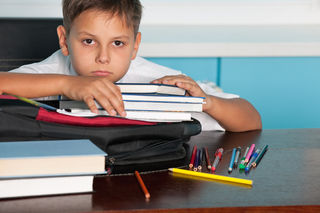
Confidence , intelligence , creativity , and happy productivity depend on ample time for unstructured play and imagination . This is true throughout childhood , but especially critical in the early years, until about the age of seven.
The National Education Association and the National Parent-Teacher Association both recommend that children be asked to do no more than 10 minutes a day of homework in Grade One, then move up incrementally from there, with second graders doing a maximum of twenty minutes a day, third graders thirty minutes, and so on. For younger ones (Kindergarten and below) just lasting through a structured day of school or daycare is demanding enough.
In too many schools, the ten-minute rule is being broken, not by a little, but by a lot. Too many children are showing signs of stress , and too many parents are finding precious family time eaten away by homework demands.
Recently, I heard from a mother of a four-year-old. She said that one week into Junior Kindergarten (for four-year-olds), her little boy had already been assigned five different kinds of homework. She had no problem with the weekly reading session. “That’s good for all kids,” she said. But she wondered whether it was okay that her son’s teacher had also told him to (1) prepare for a show-and-tell presentation, (2) participate in a daily home program of reading games, (3) have a conversation at home every day about what he’d read at school that day, and (4) learn and memorize the background to his name. I told the mom that that sounded like way too much.
In addition to using the ten-minute rule as a guideline (clearly violated in this case), how do you decide if your young child is getting too much homework?
- Enough time for play? Just getting to school on time, spending all day there, knowing and following all the rules, then getting back home again, is a lot of structure and demand for a young child. Adding homework to the mix can leave insufficient time and energy for important developmental demands like running, playing outside, chatting, dreaming , imagining, and inventing.
- Signs of Stress? Look for changes in appetite , sleep, temperament, interest, patience, neediness, emotional responsivity. If there are signs your little one is feeling worried, think about homework demands. They may be causing the problem, or adding to the burden.
- Family time? When homework interferes with pleasurable family activities, it’s almost certainly time to push back.
It’s important to your child’s education that you support the teacher, but if your child’s time is being scheduled by adults and gobbled up by electronic devices, if they don’t have enough time for imagination, exploration, and collaborative invention, it’s your job to push back. How do you do that?
- Balance . Before pushing back against homework, look at the other activities in your child’s life. Electronic devices and extracurricular enrichments—lessons, sports, and other scheduled activities—can provide great learning experiences, but are most beneficial in moderation.
- Talk to other parents. Talk to parents of some of your child’s classmates. Find out what they think about the homework situation. Talk also to parents of children in other classrooms, other schools, with other teachers. See what their experience is.
- Meet with the teacher. Listen and learn. Make an appointment. If other parents agree with you, ask one or two of them to attend the meeting with you (okaying that with the teacher ahead of time). Use the first meeting as an opportunity to find out the teacher’s perspective. Let the teacher know your concerns, calmly and respectfully. Quite often, this is all it takes to make the changes you need.
- Resist passively . Don’t insist your child do any homework you think unnecessary or excessive. If your child is worried about not completing assignments, explain your concerns in child-friendly terms (you want to make sure they have all the time they need for playing, relaxing, and spending time with the family) and let them know you’ve spoken to the teacher about it, and will sort it out if needed.
- Wait and watch. Give the teacher a week or two to change their practice. If they lighten up sufficiently on the homework, then your advocacy work is over for now.
- Regroup. If the troubling situation persists, get together with like-minded parents to define simple goals and a reasonable timeline. If you have trouble finding allies, proceed to the next step.
- Gather your evidence . Over the past few years, a lot of research has accumulated on the benefits of the ten-minute rule, and the evils of homework for little kids. I’ve included links below to some of the evidence, and you can find lots more by googling ‘Homework.’
- Prepare carefully. Put your ideas in writing, as briefly and simply as possible. Whether you’ve found allies at your school or not, discuss your ideas with others. Make sure your requests are specific, practical, and clear.
- Set another meeting with the teacher. Ask the teacher to include the principal this time. As before, go into the meeting respectfully and calmly, in a small group if possible. Communicate your concerns, and ask for the changes you want. Provide some supporting documentation (see #7 above, about gathering evidence).
- Take it to the top. If you meet with resistance at the school level, and if you think the situation calls for it (if there’s a damaging amount of homework, and children’s health and happiness are at stake) take it up a notch, to the board of education, the school’s governing board, the school trustee, as high as you need to go to get the necessary action.
- Blog, write, or talk to the media about your generic concerns. You’ll be an expert now on the impact of homework on little kids. Your story might help others. If you choose to do this, do your best to protect your child from any adverse effects. That almost certainly means avoiding naming names—teacher, school, etc.
- Talk to the media about your specific concerns. This is a last resort, and not one I’d recommend unless the circumstances are egregious. Before taking something like this public, make sure you have a back-up plan—another school where your child can go and not be punished for their parent’s noisy advocacy.
Effective advocacy is built on patient, thoughtful respect for all the players. It can take a long time (or not), but it's worth doing. I’ve seen many examples of one parent’s concerns for a child’s welfare leading to changes in practice, and eventually, to changes in policy.
Homework isn’t always a problem. Some little kids love it, as long as the demands are reasonable. But in other cases, homework interferes with more important activities like playing, daydreaming, sleeping , and spending time with family and friends. When that happens, parents should think about acting for healthy change in their child’s life.
1. Homework for Young Children
- “Research Spotlight on Homework,” by the National Education Association
- “ Hints to Help Reduce Homework Stress ,” by Cathy Vatterot
- “ Too Much Homework Stifling Your Kids? Let Them Just Say No ,” by Leah McLaren
- “ Is Homework Bad for Kids? ” by Anna Maria Tremonti
- “ Too Much Homework? Study Shows Elementary Kids Get 3 Times More than They Should ,” by Jordan Muto
- “ These Kids Now Have a Life with No Homework ,” by James Vaznis and Nicole Fleming
- “ Homework Could Have an Effect on Kids’ Health. Should We Ban It? ” by Gerald LeTendre
- “ Overloaded and Underprepared: Strategies for Stronger Schools and Healthy, Successful Kids ,” by Denise Pope, Maureen Brown, and Sarah Miles
2. Parents Advocating for Change
- “ The Role of Educational Advocacy ” by Karen L. Schiltz
- “ Parent Advocacy: the Good, the Bad, and the Ugly ,” by Annie Kidder
- “ 10 Ways to Be an Effective Advocate for Your Child ,” by Geri Coleman-Tucker
- “ Advocacy in Action: How to Change the World for Your Child ,” by Dona Matthews and Joanne Foster
3. Children’s Development: What Matters Most in Early Childhood?
- Beyond Intelligence: Secrets for Raising Happily Productive Kids by Dona Matthews and Joanne Foster
- “ Protect Your Child’s Playtime: It’s More Important than Homework, Lessons, and Organized Sports ,” by Dona Matthews
- “ Old-Fashioned Play Builds Serious Skills ,” by Alix Spiegel
- “ Six Ways to Protect Our Child’s Playtime ,” by Andrea Nair
- “ Stressed Out in America: 5 Reasons to Let Your Kids Play ,” by Katie Hurley
- “ How Nature Makes Kids Calmer, Healthier, Smarter ,” by Laura Markham

Dona Matthews, Ph.D. , is a developmental psychologist and the author of four books about children, adolescents and education.
- Find a Therapist
- Find a Treatment Center
- Find a Psychiatrist
- Find a Support Group
- Find Online Therapy
- International
- New Zealand
- South Africa
- Switzerland
- Asperger's
- Bipolar Disorder
- Chronic Pain
- Eating Disorders
- Passive Aggression
- Personality
- Goal Setting
- Positive Psychology
- Stopping Smoking
- Low Sexual Desire
- Relationships
- Child Development
- Self Tests NEW
- Therapy Center
- Diagnosis Dictionary
- Types of Therapy

Sticking up for yourself is no easy task. But there are concrete skills you can use to hone your assertiveness and advocate for yourself.
- Emotional Intelligence
- Gaslighting
- Affective Forecasting
- Neuroscience
- Close Menu Search
- Book Reviews
- Music Reviews
- Co-Curricular Clubs
- Campus Ministry

- The Disproportionate Rates of Homelessness Among Minorities
- Anti-Racism
- Artistic Expressions of Social Justice and Racial Equality
Why (Most) Homework Should Be Banned
The 30-minute rule is there to justify giving a lot of homework

Anthony Malcolm ‘23 , Staff Writer December 8, 2022
There are plenty of reasons why (most) homework should be banned. I’ll start out with some general facts and look at homework in general, then go into some detail about our school.
Stanford conducted a study surveying over 4,300 students in 10 high performing high schools in California. More than 70% of the students said they were “often or always stressed over schoolwork,” with 56% claiming that homework was the main stressor. But here’s the kicker: Less than 1% said homework was not a stressor.
The researchers then asked the students if they had exhibited symptoms of stress like headaches, exhaustion, sleep deprivation, weight loss, and stomach problems. More than 80% of the students reported at least one stress related symptom recently and 44% claimed they experienced 3 or more symptoms. The study also found that students who spend a lot of time working on homework experience more stress, physical health problems, and a lack of balance in their lives. The study claimed that any more than 2 hours of homework per night was counterproductive, and that the students who spent too much time on homework were more likely to not participate in activities and hobbies, and stop seeing friends and family.
A smaller NYU study claimed that students at elite high schools are susceptible to chronic stress, emotional exhaustion, and alcohol and drug abuse. About half of the students said they received at least 3 hours of homework a night on top of being pressured to take college level classes and participate in extracurricular activities (sound familiar?). The study claims that many of the students felt they were being worked as hard as adults, and they said that their workload seemed inappropriate for their development level. The study reported that the students felt that they had little time for relaxing and hobbies. More than two thirds of students said they used alcohol or drugs, primarily marijuana, to cope with the stress.
Back to the Stanford study for a second; many of the students claimed that the homework was “pointless” or “mindless.” The study argues that homework should have a purpose and benefit, which should be to cultivate learning. One of the main reasons is that school feels like a full-time job at this point. We, as in BC High students, are in school from 8:25 till 2:40; most of us have some sort of extracurricular activity on top of that, and most of us have significant commutes, which means we are getting home much later. On top of a rigorous day at school, an afterschool activity, and a commute, we have to deal with a varying amount of homework every night. Sometimes it is 2 hours, sometimes 3, sometimes even 4. I will give you an example of a day in my life last year to provide a specific example, because we are not a one size fits all community.
I live in Middleboro and Bridgewater, so I ride the train to school which takes 50 minutes to an hour. A spring day last year would start by waking up at 5:30 and then leaving my house to get to the train at 6:30-6:35, getting on the train at 6:50, getting off the train at 7:50, and arriving at the school before classes started at 8:20. I would go through the school day and stay after for track practice. After track, I would most likely get on the train at 5:00 and get home at 6:15. I would eat dinner, shower, and then start my homework around 7:30-8, and usually I would finish somewhere between 10:30ish to 11:30ish. Can you see how that can be misconstrued as a full-time job?
Some of you might be thinking (especially any teacher reading this), why didn’t you use the 30-minute rule? Well, because most (and I mean MOST) of the time the 30-minute rule is an ineffective rule that justifies giving students a lot of homework. If you use the 30-minute rule and don’t finish a homework assignment, it still has to be completed sometime, and you’ll be behind in class. It is only effective when a teacher plans for the 30-minute rule and tells you to stop at 30 minutes to get an idea of how long an assignment takes their students. The 30-minute rule is there to justify giving a lot of homework because if you say in class that the homework took a long time, you will probably be told about the 30-minute rule. But if you used the 30-minute rule, you would have an unfinished homework assignment which means, depending on the class, you would be lost and behind, and you would still have to do it at some point. If you should have to justify giving a lot of homework, then it is probably too much.
Parker, Clifton B. “Stanford Research Shows Pitfalls of Homework.” Stanford University , 10 Mar. 2014, http://news.stanford.edu/news/2014/march/too-much-homework-031014.html .
Communications, NYU Web. NYU Study Examines Top High School Students’ Stress and Coping Mechanisms . http://www.nyu.edu/content/nyu/en/about/news-publications/news/2015/august/nyu
-study-examines-top-high-school-students-stress-and-coping-mechanisms .

Sex Scene Discourse

Why Can’t You Get into College?

Behind the Commencement Speaker Selection Process

Be Worried?

Is the House System worth it?

Why JUG will Never Change
Should Parents Check Our Phones?
Hoodies in BC High?

Toll Booths: A Rebuttal

Why Do We Chase Success?
The Eyes and Ears of BC High.
Comments (0)
Cancel reply
Your email address will not be published. Required fields are marked *
- Environment & Nature
- Nutrition & Food
- Health & Wellbeing
- Clothing & Textiles
- Economy & Business

- Utopia Newsletter
- telegram1 share
Should Homework Really Be Banned? It’s Complicated
By Leon Wilczek Categories: People & Society June 3, 2023, 8:42 AM
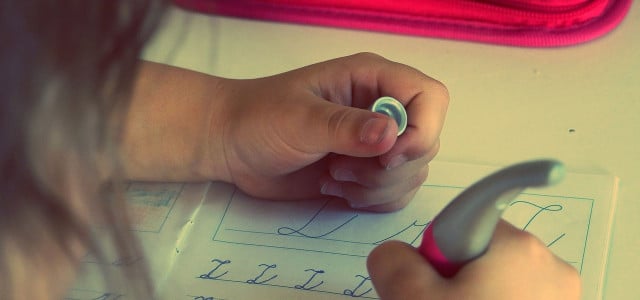
Should homework be banned? Every student has asked themselves this question. Is homework actually just annoying or does it also provide some benefits?
Should homework be banned? Once you’ve been out of school for some time, this question doesn’t even seem relevant until you have children of your own. That said, some believe that homework serves a number of important purposes, such as:
- Practice: Doing your homework allows you to put what you learned in class into practice and improve. To make sure you comprehend the information, it works like extra practice.
- Independent learning: Doing your homework helps you to be in charge of your own education. You gain the crucial ability of time management and independent learning.
- Preparation for class: Occasionally, homework helps you get ready for the upcoming lesson. Before a topic is covered in class, you might read up on it or conduct some research to find out more information. You’ll be able to participate in conversations in class better as a result.
- Feedback and evaluation: Teachers use homework to determine your level of comprehension of the subject. They can offer you comments on your work and support you if you are having problems.
- Involvement of parents: Parents have the opportunity to have a glimpse into their learning and academic performance. Homework can give them the chance to participate in their child’s education and can assist them if they need it.
There are many differing opinions about homework. While some think having too much homework can be detrimental, others think that it’s crucial for learning. Let’s have a closer look at the positive and negative aspects of homework while we consider if homework should be banned.
Benefits of Homework
Next to the number of purposes listed above there are some more benefits of homework that speak for keeping homework as a part of the learning process:
- Learning skills: Homework can help in the development of vital abilities. It enhances your ability of analysis, critical thought, and problem-solving. You gain knowledge on how to apply what you’ve studied to actual circumstances.
- Time management and responsibility: Doing your homework teaches you how to be responsible and manage your time. You develop the time management skills necessary for academic and personal success by completing assignments on time.
- Independent learning: Homework inspires independent learning. You can look into many subjects, conduct research, and learn more. This encourages your curiosity, motivation, and independence as a learner.
- Exam preparation: Homework helps you get ready for exams. It provides you with practice and helps you understand concepts better. It may enhance your performance on tests as a result.
- Extension of learning: Homework lets you explore topics more deeply. You can do extra research and learn more about the things that interest you. This helps you understand the subject better.
- Improved memory: Homework helps with the retention of classroom material. Doing extra practice at home makes the information stick in your brain longer.
- Connecting school and home: Homework enables you to discover how the lessons you learn in class connect to your daily life. It enables you to put what you’ve learned into practice and discuss it with your family.
In general, there are many benefits of homework that speak against the question “Should homework be banned?”. But let us have a look at the opposing sides of homework before drawing any conclusions.

Yoga works to improve the physical and emotional well-being of children. We’ll tell you the benefits of yoga for children,…
Negative Effects of Homework
While there are certainly many advantages, it’s important to consider some of the potential negative effects of homework as well. Here are some aspects to consider when wondering if homework should be banned:
- Mental health: An excessive amount of schoolwork might leave students feeling worn out and frustrated. It might be exhausting and leave you with little time for leisure or other enjoyable pursuits.
- Lack of balance: Homework takes up a lot of time, meaning students have less time for hobbies, sports, and time with family and friends. It might be challenging to achieve a balanced lifestyle.
- Unequal access: Not every student can access the same materials at home. Some people might not have access to computers, the internet or a peaceful space to study. This may make it more difficult to finish assignments.
- Achievement gaps: Different schools and teachers may have different expectations for homework, which can affect how well students learn. Students who have less support or fewer resources may struggle to keep up, widening the gap between privileged and marginalized students.
- Physical health: Too much time spent on schoolwork might result in long periods of sitting. This can affect mental and physical health and lead to problems like elevated stress levels or sleep deprivation.
- Loss of interest and creativity: If students have too much schoolwork, they may not have time for hobbies or creative interests. It might diminish their love of learning new things and make it seem like work.
As one can see, homework has a substantial impact on learners, especially when they are children. Let’s draw a conclusion based on the positive and negative aspects we just explored.

Volunteering has many benefits and it’s never too early to get started. We’ll show you some of the best volunteer…
Should Homework Be Banned? A Conclusion
All in all, perhaps homework shouldn’t be banned completely, but it needs to be considered in a fair and balanced way. Here are some important points to remember that take the individual needs and resources of students into account:
- Everyone is different: Every person is unique, and each student learns differently. Homework should be personalized to meet each student’s needs and abilities.
- Homework should have a purpose: The goal of homework should be to reinforce the lessons learned in class. It should be meaningful. Students should have the chance to put their knowledge to use and gain a deeper understanding of the situation.
- The workload should be reasonable: Students shouldn’t be given so much homework that it becomes overwhelming. It’s crucial to have a balance so that they have time for other activities and don’t get too stressed.
- Fairness for everyone: Not every student’s family has the same resources. All students should be able to access and finish their assignments, and teachers should take this into account. Those that require it should receive additional assistance.
- Different learning styles: Homework should be adaptable so that students show their understanding in various ways. Additionally, it’s essential for teachers and professors to provide students with feedback and support when they require it.
- Physical and mental health is important: Students shouldn’t feel overburdened or that their time is completely consumed with homework. Make time for enjoyable activities and build in self-care days .
Homework should be given with the intention of assisting in your growth and learning. It needs to be reasonable, fair, and adjusted to individual requirements. While doing homework, keep in mind to take breaks and take care of yourself as well.

Cut your carbon footprint, expenses, and stress in half with these back-to-school 2022 tips focused on environmentally friendly school preparation.
- Stop Boredom With These 20 Fun Winter Activities for Kids
- 5 Time-tested Natural Immunity Boosters for Kids
- How to Make Homemade Playdough: An Easy DIY Recipe
Important Information regarding Health-related Topics .
Do you like this post?
Tags: Guide Healthy Living Kids Mental Health Problematic Practices
Debate Nirvana
Homework should be banned.

PRO (6 arguments)
Links to more PRO research:
Homework and Its Role in Constructive Pedagogy
The site contains research and statistics on both sides of the homework debate.
Define :
Homework: a task set by teachers for students to complete outside of the time allotted for a normal school day.
Banned: Disallow homework in K-8 grades in the U.S. public schools
Homework produces large amount of pointless work of little educational value, but marking it ties up much of teachers’ time. Add in correcting it and the time it takes up in class going over it. Altogether, this leaves teachers tired and with little time to prepare more effective, inspiring lessons. Also, reversely, homework can function as a safety net for bad teachers in that they know that even if they do a poor job on their lessons and teaching during class they can always just pile on homework and hope that they can then use this as a sign that they are good teachers. A good teacher shouldn’t need to resort to homework to teach for them, which is why homework is unfair to the teachers who don’t need to assign it while the bad ones who do get credit for that from their employers.
“Teachers in many of the nations that outperform the U.S. on student achievement tests--such as Japan, Denmark and the Czech Republic--tend to assign less homework than American teachers, but instructors in low-scoring countries like Greece, Thailand and Iran tend to pile it on,” Time Magazine, The Myth About Homework
Time Magazine
Homework de-motivates kids to learn. Most see it as a consequence of going to school. Studies have shown that many children find doing homework very stressful, boring and tiring. Often teachers underestimate how long a task will take, or set an unrealistic deadline. Sometimes because a teacher has not explained something new well in class, the homework task is impossible. So children end up paying with their free time for the failings of their teachers. They also suffer punishments if work is done badly or late. After years of bad homework experiences, it is no wonder that many children come to dislike education and switch off, or drop out too early.
"It's one thing to say we are wasting kids' time and straining parent-kid relationships, but what's unforgivable is if homework is damaging our kids' interest in learning, undermining their curiosity." The Homework Myth by Alfie Kohn.
The Homework Myth by Alfie Kohn.
Homework is discriminatory in that it gives unfair advantages to certain types of people depending on their home environment. In school everyone is equal, but home is a different story. Middle-class families with books and computers will be able to help their children much more than poorer families can. This can mean working class children end up with worse grades and more punishments for undone or badly done homework. On the other hand pushy parents may even end up doing their kids’ homework for them – cheating. Even worse, kids who live in an abusive or volatile home environment (something completely out of the kids control) end up having their homework counting against them and compared to kids who benefit from doing work at home.
Common sense; there are plenty of homes where education is not the #1 priority and some where it is. This imbalance only comes out with homework and skewers results unfairly.
Homework takes up a lot of time, usually enough to push off many extracurricular a student might want to do. Being young is not just about doing schoolwork. It should also about being physically active, exploring the environment through play, doing creative things like music and art, and playing a part in the community. It is also important for young people to build bonds with others, especially family and friends, but homework often squeezes the time available for all these things.
According to the American Educational Research Association released this statement: “Whenever homework crowds out social experience, outdoor recreation, and creative activities, and whenever it usurps time that should be devoted to sleep, it is not meeting the basic needs of children and adolescents.”
Alos, Curt Dudley-Marlin, a professor at Boston College, interviewed dozens of families and found that, “the demands of homework disrupted…family relationships and led to stress and conflict.”
American Educational Research Association
Homework has little educational worth and adds nothing to the time spent in school. Some schools and some countries don’t bother with homework at all, and their results do not seem to suffer from it. Studies show that homework adds nothing to standardized test scores for primary/ elementary pupils. International comparisons of older students have found no positive relationship between the amount of homework set and average test scores. If anything, countries with more homework got worse results!
Harris Cooper, of Duke University, found that students in middle school who do more than 60-90 min. a night perform worse on standardized tests than those who do 20-30 min. a night.
Homework does little to develop good study skills. First off, many children, after a long and hard school day, end up plagiarizing off of either another student’s work or a professional manuscript. With the Internet, copying has just been made easier. All a student has to do is copy and paste a few paragraphs onto a blank word document and they have their report. This isn’t even considering the massive input parents have on their child’s homework, ranging from checking over answers to even writing a paper for their child. All of this is extremely prevalent in today’s society, and it makes teachers spend ten times as much effort deciding whether a student created a paper or copied off some one else than actually grading the work. Therefore, homework should be banned due to these unavoidable consequences that occur with it.
The pressure to complete homework can also lead to students cheating by copying from other students or obtaining help other than tutoring, such as getting their parents to complete it for them. Students who “perceive that achievement is defined by schools and teachers in terms of grades and performance, worry about school, and believe they can get rewards for doing well in class such as getting out of homework" are more likely to cheat, and to "avoid using deep level cognitive processing strategies such as trying different ways to solve a problem." The American Psychological Association (1998)
The American Psychological Association (1998)
Home | About | Topics | Articles | Blog | Privacy Policy | Login
Why Homework Should Be Banned: 9 Reasons Must be Discussed

Do you agree or disagree on why homework should be banned? Should homework be made unfair? Many parents believe that professors or teachers give their students more assignments than they can handle. We will discuss reasons why homework should be banned.
As we all know, in today’s world maximum children are busy with homework, especially if they need to do that on mobile. That is why they don’t have proper time to engage in physical activities like playing outdoor games. Many students need to do online assignments, so they need to look at mobile phones or laptops. This can also be bad for children’s eye health. And there are many more issues related to children’s health that are why this is important to discuss why homework should be banned.
Let us start with basic questions that are important to discuss before getting into the topic. Many parents think homework plays an essential role in students’ lives. So after analyzing a lot of things, we will include the pros and cons of doing homework. Let us continue with why homework should be banned.
9 Major Reasons Why Homework Should Be Banned
Table of Contents
Here are 9 reasons why homework should be banned which are as follows:
1. Children’s Physical Health

This is the most crucial point I would bring up first on why homework should be banned. When a teacher gives homework to students, it is fairly typical for them to take their time completing it. It can take several hours to finish. As a result, children don’t have much time to play. As we all know, outdoor games are essential for children’s physical and mental development.
Homework is an important component of academic achievement in and out of the classroom, but too much of it can ruin your development. Students who used to spend excessive amounts of time on homework may find it difficult to meet other tasks, such as being physically and socially active. So this is an important point that must be considered on why homework should be banned.
2. It Is A Full-Time Task To Go To School

Many children’s schools start at 8:00 a.m. or even earlier and end at 3:00 p.m. or later. Every day, students attend school for around 7 hours. Meanwhile, students must prepare for school, attend school, and return home, which takes a significant amount of time.
When you factor in extracurricular activities, children are forced to compete and succeed in society, such as cram school, musical instrument study, and sports participation.
Many parents complain that children easily spend more than 10 hours each day on school-related activities. All of this amounts to the maximum amount of time a youngster can spend in a day. As a result, they will accomplish that much homework across all disciplines as a student. As a result, homework should be banned.
3. Students Are Stressed Out By Homework

This brings us to the third reason why homework should be banned. Homework can be a source of anxiety. According to a Stanford University poll, homework is a significant source of stress for 56 percent of youngsters. Only 1% of students, on the other hand, say that homework is not a significant source of stress.
No schoolwork, without a doubt, means no stress. If students don’t have homework, they don’t have to waste time sitting at their desks, exhausted, and wondering if they turned in all of their assignments. As a result, a student’s fantasy of having no schoolwork has come true.
Homework reduces their revision time, which might negatively impact their test grades. This will harm the student’s reputation, but many people don’t realize that it will also harm the school’s reputation.
The parents of the students then conclude that the school’s teaching is poor, and they may decide to send their child to a different school! The school’s popularity may decrease over time, and the simplest way to prevent this is to ban homework.
Furthermore, more than 80% of students have stress-related symptoms such as headaches, fatigue, sleep deprivation, weight loss, and gastrointestinal problems. Homework may be to blame for these aggravating stress and health problems.
4. Don’t Have Enough Time For Yourself

This brings us to the 4th reason why homework should be banned. Students who spend excessive time on schoolwork do not meet their developmental goals or learn other essential life skills. Extracurricular activities like various students spending time in athletics, musical instruments, and other activities are less likely to pursue by students who have too much homework.
Furthermore, if children spend all of their time doing homework, they may not develop essential life skills such as independence, cooking, time management, or even social interaction.
Many students feel forced to place a greater emphasis on homework than on discovering and developing other skills or talents. Without schoolwork, children would be able to devote more time to their hobbies, such as dancing, playing video games, and painting, while still functioning as adults in society.
5. There Is No Genuine Benefit To Doing Homework

This brings us to the 5th reason why homework should be banned. Teachers feel that giving students more homework will help them grow and learn. However, this is not the case. Students are less motivated to know if they have a lot of homework.
As a result, homework turns into a devil, forcing children into a corner of anxiety rather than motivating them to learn more. Many students used to spend too much time doing school homework has been linked to lower academic achievement. Despite the fact that homework can help you get better grades, it usually has diminishing returns.
6. There Will Be No Family Time

This brings us to the 6th reason why homework should be banned. Today’s parents’ biggest issue is that they do not spend nearly enough time with their children. Kids start focusing on their schoolwork and projects as soon as they get home, and they barely have time to chat with their families because they’re so fatigued.
Those constantly focusing on schoolwork miss out on quality time with their families, shared evenings, weekend activities, and dinners. However, more time would be available for family bonding without homework, bringing families closer together.
7. A Regular Sleep Cycle

The 7th reason I feel on why homework should be banned from all schools worldwide is that it disrupts children’s sleep cycles, potentially resulting in harmful or annoying health conditions. Some may argue that the student is to blame for sleeping late.
It’s no wonder that kids are working late at night on homework when you consider travel hours, dining times, family gathering times, and so on. They haven’t noticed or taken into account that the majority of students live a long distance from school!
8. There Is A Lack Of Support

This brings us to the 8th reason why homework should be banned. It is a key reason why homework should be prohibited. Many schools or college teachers fail to express many things needed to perform the task during class, which is considered one of the most compelling grounds for forbidding homework.
Parents are unable to assist in all aspects of their children’s lives. Sometimes some students lack the essential experience to help, and they also have work to finish. Professional internet services are the only companies that can help students with their academic work.
9. Homework Is a Type of Irrelevant Content

If you think writing your homework is good, whether your homework is relevant or not. Then it is totally wrong. There is no meaning in writing irrelevant content as your homework. However, if homework has nothing to do with your topic, then it should be banned. Or we can say that you must assign only relevant material to the students as a teacher.
This will automatically help them in improving their grades. This is the ninth reason why homework should be banned.
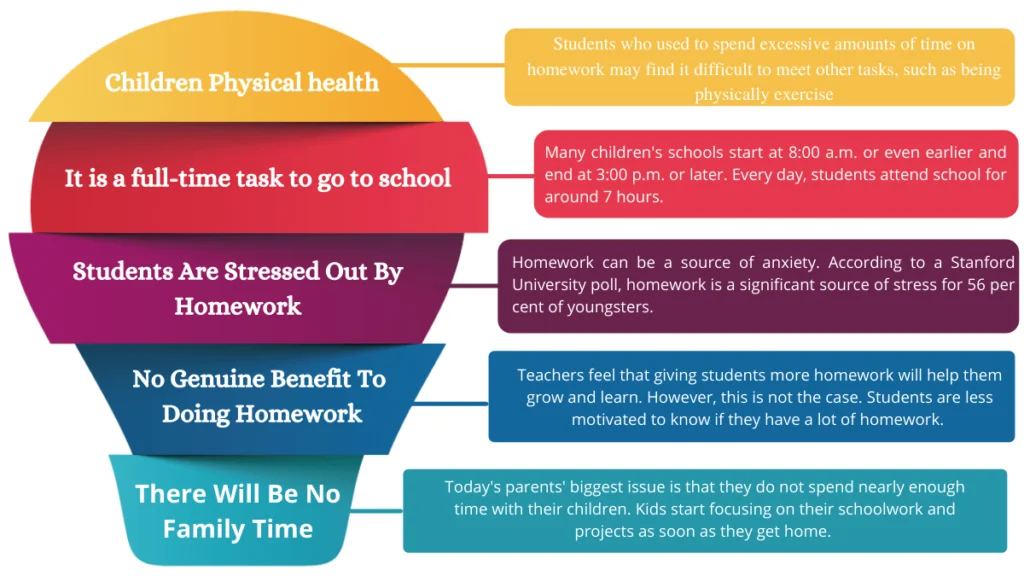
Is Homework Slavery: Can Homework Be Considered Slavery?
Some people might think that is homework slavery so let’s find out. We can’t say that homework is slavery because there is no legal definition to support it. On the other hand, homework is assigned to students without their permission. If you equate this to slavery, then it is considered an argument that will fall under legal inspection.
If you consider homework slavery, you must prove something. For example, you have to prove that the instructor or teacher enjoys the economic benefits of your homework or when you complete the assignment given by teachers.
However, teachers don’t get any financial benefits. The main aim of homework is to help students get better academic results.
Homework is nothing but a privilege. The only thing you can say is that it is almost the direct opposite of slavery. But, too much homework for the students makes them overburdened. As a result, the students get stressed.
If you still believe that homework doesn’t contribute positively to your career, you can state your case to the relevant authorities.
Does Homework Cause Stress: Everything You Need To Know
Extra assignments given to students by schools may lead to an imbalance in stress levels. Yes, I know students need to learn in class in order to get good academic results, but they also get some time to explore other things and chill and relax.
Imagine you’re working in an office. Your boss gives you some extra tasks to complete within a given deadline. How would you feel? Well, it is obvious to many people that you feel very stressed. That’s what a sixth or eighth-grade student feels.
As per the survey by Stanford University, almost 56 percent of the students think that homework causes stress and is the primary cause. On the other hand, the remaining students believe that getting good grades on tests can cause mental illness and lead to stress or anxiety.
Only one percent of the students think that homework or academic tests do not cause any stress, which is remarkable.
In Which State Is Homework Illegal?
In all states of the United States, there is no law banning homework, and it is legal. There is no state law prohibiting them.
However, schools in different states of the US have their own rules about homework. Some schools have banned homework, while others limit the amount of homework given to students.
Where homework is limited in the US:
- Connecticut
How Can Parents Help Their Children to Get Better Academic Marks?
You might be wondering how you, as a parent, can help your children learn and get good academic grades. So, how can you boost their achievements?
Listed below are five ways to boost their academics.
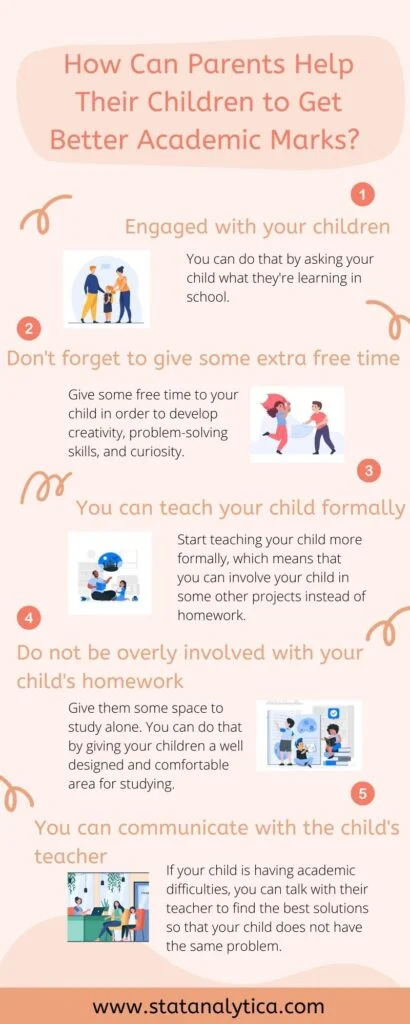
1. Engaged with your children
You can do that by asking your child what they’re learning in school.
2. Don’t forget to give some extra free time
Give some free time to your child in order to develop creativity, problem-solving skills, and curiosity.
3. You can teach your child formally
Start teaching your child more formally, which means that you can involve your child in some other projects instead of homework. This can be an excellent learning experience. Creating some bonding with your children is a good way to teach anything to your child.
4. Do not be overly involved with your child’s homework
Suppose you want good academic results from your children. Give them some space to study alone. You can do that by giving your children a well-designed and comfortable area for studying.
5. You can communicate with the child’s teacher
There are many reasons why you want to be in contact with your child’s teacher. If your child is having academic difficulties, you can talk with their teacher to find the best solutions so that your child does not have the same problem.
Homework Should Be Banned Agree Or Disagree: Debate
On the one hand, those who believe homework should be banned argue that it causes stress, anxiety, and even depression in students. Homework often takes up a significant amount of time and can interfere with other important activities, such as spending time with family and participating in extracurricular activities. Additionally, some students may not have access to resources at home, making it difficult to complete assignments. Proponents of banning homework believe that students would benefit from more free time and less pressure, allowing them to explore their interests and engage in activities that support their well-being.
On the other hand, those who argue against banning homework believe it is necessary to reinforce concepts learned in the classroom and develop important skills, such as time management and responsibility. Homework also helps students prepare for exams and can be an important factor in determining their grades. Furthermore, homework supporters argue that it is a crucial aspect of education and that students who do not complete it may fall behind their peers. Therefore, homework should continue to be assigned appropriately, focusing on quality rather than quantity.
As a result, it depends on the individual’s choice. If you find homework beneficial, then homework is good for you. Otherwise, your opinion is like “Homework Should Be Banned.”.
To conclude, why homework is banned many parents think homework is beneficial because it can help you improve your grades, learn new content, and prepare for tests. However, it isn’t always advantageous. A student’s perception of the subject may be tainted by pointless busywork homework (not to mention a teacher). This blog has explained why homework should be prohibited. The benefits and drawbacks of giving assignments after school was discussed. The majority of college students support such chores, and students should make every effort to complete their responsibilities.
If you need any assistance related to your homework, feel free to contact our experts. We offer various assignment help services such as math assignment help , probability assignment help , statistics assignment help , and many more. Don’t hesitate to call us.
Q1. Is homework harmful to one’s mental health?
We know what stress can do to our bodies, adding that staying up late to do projects leads to sleep disruption and tiredness. To overcome stress to can play games and do other physical activities.
Q2. Why do students hate doing their homework?
Students despise homework for various reasons, including the belief that it should only be utilized as extra practice for students who need it or to study for examinations and quizzes when possible. In addition, schoolwork can be overwhelming. It can result in weariness, stress, and various other issues.
Q3. What Are Some Weird Facts About Homework?
Here are some weird facts about homework which are as follows:
1. Homework can cause anxiety and stress. 2. There is no dought that homework is dangerous for student’s social life. 3. Homework can cause burnout. 4. There is no official research on why homework is beneficial to students. 5. Homework can replace some major parts of studying.
Related Posts

Step by Step Guide on The Best Way to Finance Car

The Best Way on How to Get Fund For Business to Grow it Efficiently

Homework Should Be Banned

Should students be given homework tasks to complete outside school? Or are such tasks pointless?
All the Yes points:
Homework has little educational worth and adds nothing to the time spent in school. some schools an…, homework is almost always done when a child is already tired from a long day at school. as a result…, setting homework does little to develop good study skills. it is hard to check whether the homework…, homework produces large amount of pointless work of little educational value, but marking it ties up…, homework puts students off learning. studies have shown that many children find doing homework very…, homework takes a lot of time up. being young is not just about doing school work. it should also a…, homework is a class issue. in school everyone is equal, but at home some people have advantages bec…, all the no points:, yes because….
Homework has little educational worth and adds nothing to the time spent in school. Some schools and some countries don’t bother with homework at all, and their results do not seem to suffer from it. Studies show that homework adds nothing to standardised test scores for primary/ elementary pupils. International comparisons of older students have found no positive relationship between the amount of homework set and average test scores. If anything, countries with more homework got worse results!
No because…
Homework is a vital and valuable part of education. There are only a few hours in each school day – not enough time to cover properly all the subjects children need to study. Setting homework extends study beyond school hours, allowing a wider and deeper education. It also makes the best use of teachers, who can spend lesson time teaching rather than just supervising individual work that could be done at home. Tasks such as reading, writing essays, researching, doing maths problems, etc. are best done at home, away from the distractions of other students.
Homework is almost always done when a child is already tired from a long day at school. As a result few students are at their best when they sit down in the evening to yet more work. Homework ends up being done in a hurry, by students fighting fatigue, and poor quality work is produced. Worse still, students who have been up late trying to finish off their homework, then come tired into school the next day, and so are less ready to learn. Really, what is the point?
Having homework also allows students to really fix in their heads work they have done in school. Doing tasks linked to recent lessons helps students strengthen their understanding and become more confident in using new knowledge and skills. For younger children this could be practising reading or multiplication tables. For older ones it might be writing up an experiment, revising for a test, reading in preparation for the next topic, etc.
Setting homework does little to develop good study skills. It is hard to check whether the homework students produce is really their own. Some students have always copied off others or got their parents to help them. But today there is so much material available on the internet that teachers can never be sure. It would be better to have a mixture of activities in the classroom which help students to develop a whole range of skills, including independent learning.
Homework prepares students to work more independently, as they will have to at college and in the workplace. Everyone needs to develop skills in personal organisation, working to deadlines, being able to research, etc. If students are always “spoon-fed” topics at school they will never develop study skills and self-discipline for the future.
Homework produces large amount of pointless work of little educational value, but marking it ties up much of teachers’ time. This leaves teachers tired and with little time to prepare more effective, inspiring lessons. The heavy workload also puts young graduates off becoming teachers, and so reduces the talent pool from which schools can recruit.
Teachers accept that marking student work is an important part of their job. Well planned homework should not take so long to mark that the rest of their job suffers, and it can inform their understanding of their students, helping them design new activities to engage and stretch them. As for recruitment, although teachers do often work in the evenings, they are not alone in this and they get long holidays to compensate.
Homework puts students off learning. Studies have shown that many children find doing homework very stressful, boring and tiring. Often teachers underestimate how long a task will take, or set an unrealistic deadline. Sometimes because a teacher has not explained something new well in class, the homework task is impossible. So children end up paying with their free time for the failings of their teachers. They also suffer punishments if work is done badly or late. After years of bad homework experiences, it is no wonder that many children come to dislike education and switch off, or drop out too early.
If homework puts students off learning, then it has been badly planned by the teacher. The best homework tasks engage and stretch students, encouraging them to think for themselves and follow through ideas which interest them. Over time, well planned homework can help students develop good habits, such as reading for pleasure or creative writing.
Homework takes a lot of time up. Being young is not just about doing school work. It should also about being physically active, exploring the environment through play, doing creative things like music and art, and playing a part in the community. It is also important for young people to build bonds with others, especially family and friends, but homework often squeezes the time available for all these things.
Again, just because some teachers are bad at setting homework that is not a reason to scrap it altogether. Homework needs to be well designed and should not take up all of students’ spare time. Recent American surveys found that most students in the USA spent no more than an hour a night on homework. That suggests there does not seem to be a terrible problem with the amount being set.
Homework is a class issue. In school everyone is equal, but at home some people have advantages because of their family background. Middle-class families with books and computers will be able to help their children much more than poorer ones can. This can mean working class children end up with worse grades and more punishments for undone or badly done homework. On the other hand pushy parents may even end up doing their kids’ homework for them – cheating. And homework is one of the most common causes of family arguments.
Education is a partnership between the child, the school and the home. Homework is one of the main ways in which the student’s family can be involved with their learning. Many parents value the chance to see what their child is studying and to support them in it. And schools need parents’ support in encouraging students to read at home, to help with the practising of tables, and to give them opportunities to research new topics.
Teachers don’t understand the students’ pain and struggle they are going through, they just assign some exercises, look at the solution and present it the next day.
Students spend up to a third of their day working hard at school; they deserve to have a break. Not only do students deserve to have a break, but they also deserve to have time for themselves to indulge in extracurricular activities like, sports, music, and swimming, etc. So homework must be banned
Homework should be giving as much as the student can take but not so much that students will have bad filling about books.
I think that kids like me spend a lot of time playing video games . I also think that some kids get torn by homework especially during quarantine. Kids are forced to do school from home and homework from home as well. This can be hours and hours of work and can be very stressful.
If you keep your mind fully on studies you don’t need o do homework but if you don’t follow the class then you need to do homework as it makes us revise what you have studied in school but obviously the sclools give us a lot homework in our holidays which is not needed.But what if your child has not understood a thing in school? if you do homework the child will ask you the thing that he has not understood.So homework is needed but not always.
at the top it looks like shes crying of homework that is just toter
i dont like it because it is a waste of time plus no one cares about it thats why it is boring
i think homewrok is waste of time because you might get stressed and it just takes away time with your family
Homework should be a choice. School is already stressing enough and students need to be able to have a life outside of school so they can relax and not have to worry about school anymore. If a student needs help then they could ask for some extra work in order to be able to help themselves.
Kids, remember that homework is a waste of time, its just extra work school gives you
you are so right
I don’t think it is right in many situations. You see, homework are meant to make you better, not worse, but too much is just tiring.
who said it was making you worse?
But Homework Does More Bad Than Good. Many Even Try Suicide Because Of Homework.
Then how teachers will understand that which student did understand the lesson and which one not?? . Homework is the way to understand that which student is improving and which one is not. Who lazy and bad student they talk like that.
Well the 7-8 hours that students are already in school apparently doesn’t let them do a ten minute knowledge check on the topic.
homework should be banned from schools because it makes students very tired . It puts more pushers on the child and the child does not wasn’t to do it . The child is already tired from school and they get more work . It is very stressful for a child Excess homework causes children to feel ‘burnt out’ Do you thing my worth opponent is excess of homework good for a child? No it is not good for a child as it leads to coping and negative attitude in them it ruins the child’s life. its also a waste of time. you could be doing something you love like hanging with your friends, or spending quality time with your family homework takes all the time . homework is an unnecessary pain to parents, teachers, and most of all, students. Homework is worthless. It does nothing but creates a monstrous picture of our studies in our minds
uhm what is homework ???
homework sucks
i have homework and find that it has help me a lot with my school work. i believe that some teachers are the cause of not liking homework but you never really know. personally i love homework and think it shouldn’t be banned
I just wanted to say that I had an exam question received late at night which i had forgotten about, about the topic of homework being banned. THIS SAVED MY FRICKING LIFE! THANK YOU WHOEVER MADE THIS!
So you plagiarized?
well, thank you for the comments and opinions it totally helps a lot to make a research about “banning homework”
I am a 5th grade student. Simply put, I absolutely HATE homework! It is stressful and leaves me no time to independently read! (I love to read) I did some research, and found that countries/states with no homework don’t do bad, but actually do good. Finland has banned homework, yet it is deemed the “happiest country” and comes at the top of exams. Ban homework!!!
I’m in 6th grade and I agree with you all except reading I like games
Personally, I don’t quite have the same opinion. It’s different for everyone. I also dislike homework, but I have to do it because I think it’s important
In my opinion, homework should not be banned entirely. The workload should be lessened. Often times, the amount of work children have to do can deprive them of sleep, which can lead to many negative side effects such as depression. Often times, the children at the schools I’ve been to have had to drink coffee or other caffeinated beverages to get through the day, and needed melatonin to sleep, just to wake up 4 hours later. This is mainly due to the homework weighing down on them. Homework should still be assigned in schools, but the amount of homework given to students should be lessened.
here is a summary of whats above about why homework should be banned. I added a few things. Also, its in my own words so if anybody wants it for their school classwork they can copy it and put it in their classwork.
I think homework should be banned. Because first it’s hard to see if a student homework is really done by himself. Second many people copy other friend work and get many helps from their families. It would be much better to have a mixture of work (activities) in the class which will help the student to develop skills which includes learning independently. Also, there is evidence, did you know that an estimated of 17 percent of kids don’t do their homework. And an estimated 20 percent of kids copy their homework from other students. Moreover, did you know that over 70% of kids don’t like to do their homework. Even a famous Author named Justin Coulson does want homework to be banned. He said, “They spend enough time in class.”
the entire internet thanks you
i think either classwork or homework should be banned cause in my country you have to do like atleast 4 homeworks ( do note that i am in 6th) and on average per day you hae to do 6 homeworks plus whatever extra work your teacher gives you ( unless they are nice like my eng teacher ). schoolwork consumes 6 HOURS of my screen time plus 2 or 1 hour of hw screentime. i am a lucky kid cause i can do 11 homeworks in 1 day but that is just not fair. my hobbie is ti play games and stream that but parents say that it takes up 3 hours of my time. one question i ask you, doesnt school take up doeble the fricking time schoo – 6hours + 1 hour of hw + 1 hour of extraa work. games = 3 hours ( at max ) + 1 hour of tv ( i watch like once in a week ) now you only tell me what is affecting my health more, school or games ? i wake up late at 830 thinking that today is a good day but all of a sudden school f@#ks with me and screws me up.
schoo – 6hours + 1 hour of hw + 1 hour of extraa work.this
We are doing a debate for school on whether we should have homework or not so me and my group decided to search it up. 😉
i believe it shouldnt be “banned” as im a kid. i sometimes enjoy homework, sometimes i don’t. but i believe its not all positive. i get done with online school, i do my homework, but man am i exhausted. i think homework should only be done as a punishment.
Yes, I am always against the motion.
Your having fun then ur mom asks “have you done your homework yet!”
It turns out, homework was made as a punishment by an Italian pedagog Roberto Nevilis for his students. So for those who disagree that homework should not be banned, have empathy for students who have to take up their social time only for homework. Like many people commented, it’ll waste their childhood.
STOP THE HOMEWORK STOP THE HOMEWORK STOP THE HOMEWORK STOP THE HOMEWORK
ofc it should be banned. I spend HOURS a day trying to complete a simple math problem because my brain was fried at school. school is the majority of my day. I dont want to spend the little time I have with my busy parents and busier siblings alone doing friggin spanish or something. Optional homework is fine, since that is available for the people who have time for it. But for people like me who have siblings to look after and dinner to cook, adding homework to the mix is too much. And now with covid, the workload DOUBLED. fall of 2020 better be better because this spring just wasnt it. Before you fuck up my brain and drive me crazy, please think about how we are entering high school and thats just a little stressful. Think about how we have responsibilites. smh
Please don’t use insult words.
homework is the worst
I hate homeworks
Homework shouldn’t be ban, but too much homework should. No more then an hour of homework. Kids can’t handle that stress like adults can.
uhm. no HOMEWORK! HOMEWORK IS GONNA MAKE US SUICIDE IF WE CONTINUE THIS. AHHHHHHHHHHH
Don’t you know that homework is a punishment? Look it up. You shouldn’t be doing school at home. You should be doing school at school. Just a little homework is still considered a punishment. I hope homework doesn’t become a regular thing, oh wait it is.
hw’s so bad ,i hate hw✄
Homework should be banned it should be banned you telling me that they don’t have “enough time” to learn what they need to learn. It takes time out of a students life. You people say that childhood is most precious Well how can they have one if they are spending hours upon hours on homework. It waste their free time and their parents time to spend on them. Is homework that important to take away a Childs freedom huh. huh explain it explain it I want to know. homework is a waste of time Childhood is something you can’t get back. 8th grade has already made it to were I might have a mental breakdown. Yes I am a 8th grader so your hearing the opinion of one. Homework should be banned. I spend 8 hours at school and 3 hours on homework even more. Why should school have the authority to stick its fucking fingers in my lives and other students. Its no wonder why students our stressed and mentally unstable. Home should be a time to spend time with family, relaxing, maybe spend a hour or hour and thirty or so to have me time. These are the many reasons why my school system and others are fucked up. so get your fucking head on straight when you think about whether homework is good for kids or not
I also forgot that some parents don’t care I live with my grandparents and my Nana once said to me that this was more important than eating and that point if I run away its she needs to know its her fault
Homework should be limited if not banned. I’m in 6th grade and have a mental breakdown at least once a week. I get about 10 pieces of homework A DAY. I get home from school at 3 and am working on homework till 8. I get to spend about 10 MINUTES with my family before going to bed.
Limited? It should be banned. Pretty stupid for a 6th grader.
I’m in 5th grade. I have to study 7th grade work. :(
It turns out, homework was made as a punishment by an Italian pedagog Roberto Nevilis for his students. So for those who disagree that homework should not be banned, have empathy for students who have to take up their social time only for homework. Like many people commented, it’ll waste their childhood.
whos the author
love him/her
What is school for if all the learning is done at home?
Its not school its just work!
i hate homework.
me too teachers suck
Hello have you guys heard about coronavirus? Search an article on this website!
I have my father keeps on searchin’ stuff ’bout it. I am bored coz of it.😒
Yes of course
stop trying to sell your rubbish nobody cares
ofc we heard. were not dumb
I really do think that homework should be banned. First off kids work 8 hours in school and they have to do homework right when they get home. A lot of kids stress doing homework when they get home because they wan’t to spend their free time.
I think that homework should be banned cause as a senior in high school I can honestly say that this has been my best year yet without worrying about the amount of homework and how long it would take me. I have done better this year because the lack of homework has taken a lot of stress off and has given me time to work on assignments that we do in class and get ahead. SO yeah I think homework should be banned.
Thanks for hearing me out yours truly, Cookie monster
Thanks for hearing me out yours truly, alex
Homework Should Be Banned Yes because… Homework is almost always done when a child is already tired from a long day at school. As a result… Homework is almost always done when a child is already tired from a long day at school. As a result few students are at their best when they sit down in the evening to yet more work. Homework ends up being done in a hurry, by students fighting fatigue, and poor quality work is produced. Worse still, students who have been up late trying to finish off their homework, then come tired into school the next day, and so are less ready to learn. Really, what is the point?
Homework is practice. But too much is no good. At the same time, it every student of mine has 30 minutes of homework from each lesson he attends in a day, it adds up to 3 thirds of his school day, leaving little room to explore other interests. I also believe that teachers need to add value to the cirriculum by adding things that are left out, like how to learn, using imagination and teaching budgeting, house work and other subjects deemed unsuitable for class environment.
It’s not a practice it’s a punishment.
i think homework should be banned because statistics show that homework can cause disengage students from families and cause anxiety/depression
Finland is known as the happiest country in the world for students and thats because kids arent even given a hint of homework and the graduation rate is 93% while in the US kids are given 50 minutes of homework a day and the graduation rate is 73% what does that tell you about the effect of homework
That tells us nothing about the effect of homework. There may be correlation, but that does not mean causation.
bruh.. its a website on why homework should be BANNED not the effects of homework
homework should be banned because it causes unnecessary stress
In China, every student should do homework for 2 to 3 hours.
Shut up and go to China.
BRO you guy only need 2-3 hours in Vietnam we have to do it more than 3.5 hours :P
Alright, I’m here at finland, and I live here, and I go to school. You see, there’s alot of homework. And extra in quarentine. So, the “kids arent even given a hint of homework” is kinda false. We DO get homework. Alot actually, if I say so myself. But it’s not alot. I can deal with it.
Stop spreading false information.
Finally someone with a brain.
U r angílina harry ?
it more like anywhere from 1- 8 hours of homework jsut depends on the day and the teacher
Reason 1: Studies tell us that homework doesn’t help us at all on standardised test scores for elementary students. International comparisons of students that are older have noticed no good relationship between the amount of homework set and average test scores. Also countries that have more homework have worse results on tests! So if you get worse results on your test, what’s the point?
Reason 2: Homework is mostly done when a child is already tired from School. The result is that few students are are ready for homework when they sit down in the evening to . Homework ends up being done in a hurry, by students fighting fatigue, and poor quality work is produced. Even worse , students who have stayed up late trying to finish their homework, come to school tired, and are less ready for work. So really, what is the point? That’s why homework should be banned.
Homework takes away from family time. If your son/daughter is so tierd after school and they have to do homework and don’t do good u would want too help and that’s cheeting. Then you cant do family stuff like play games together or eat diner together. Homework is like a dementor, sucking tha happiness out of life
homework gives self-confidence and self-motivation to a student to do well.it checks our ability and capacity to do well
In other words, destroys our self confidence
Oh look the most downv- I mean disliked comment on the page.
Homework is almost always done when a child is already tired from a long day at school. As a result few students are at their best when they sit down in the evening to yet more work
all homework does is just help you redo the hard lesson ALL OVER AGAIN and barely even helps you. a school that abolished homework didn’t suffer from it, and a school with more homework got worse grades! it also makes it hard for teachers to prepare for learning just from marking homework. what is the point of doing one hard page of homework when you barely even get celebrated for it? its just pointless work for hours instead of going outside to play, doing creative things like music and art, helping your friends and family or watching TV and playing video games.
Homework Shouldn’t be banned It improves your child’s thinking and memory. It helps your child develop positive study skills and habits that will serve him or her well throughout life.
NO, it doesn’t If there is one person you need to hear from about homework, It’s kids who actually have homework. Homework has done nothing good for me except for putting pressure on me and when I don’t do it, my grades go down even when I do well in class it’s just the homework that hurts kid’s grades for no reason.
That is not true because they need to spend time with family as well as that they also need excersice so you are wrong and I don’t think anyone would disagree with my dession.
How does it improve children’s thinking and memory? How does it help them develop positive study skills if they have to miss out on family time, sport etc. The only thing that would do is make children hate homework for taking them away from other activities.
This is more disliked than the reply I said was the most disliked.
MY friend, you have chosen the wrong place to talk about your opinion :P
I think homework should be banned the students do enough work in class. Another reason is I believe it takes away from time spent with family,friends,sports or even just playing outside.
Statistics show that homework causes: -Stress,headaches,stomach problems -Also arguments between parents and children -Lack of sleep -Can affect “physical health” and “mental health” -Less than 1% of students say homework is not a stressor.
In some countries teachers don’t bother giving homework and their results turn out to be perfectly fine!
I have anxiety cause of overwhelming homework and I sleep at 3:00am finishing it. Sometimes I don’t even do it and that what makes my grades suffer. If it weren’t for homework, I would probably get better grades
Homework should be banned because not all families have good educational facilities and students have also varying family pressure. The often work on errands and not always get adequate time. Also many schools give very hard topics in homework.
Homework should be banned as our children do enough in school… there is too much pressure on children to grow up quick, they do not get the time to rest, have fun and be children… I would also like to add when it comes to after school or weekends I like to spend quality time as a family doing fun things not push them into doing additional school work that is what teachers are paid for and to do in school time!!
Homework shouldn’t take so long as to hardly spend any family quality time together. Each school is different in the amount of homework they give, and if a school is giving a lot of homework, that should be changed, and it should be lessened, but not banned. If it’s banned, then what are they going to do all day? Just play with no intellectual mind whatsoever? How will that prepare them for the real world? Not to mention, summer break, winter break, fall break, and spring break is a time of relaxation. What’s the harm in giving homework on school days. After all, school is a place of education, and if the homework is given correctly and efficiently, it shouldn’t be a problem.
if school is a place of education why should a home be the same? and clearly you forgot about holiday homework, which turns a relaxing break into a time of stress as these assignments often take much longer to complete. and also that, in the UK at least) only 12 weeks of a year are spent in breaks which means 76% percent of a year is spent in school and doing homework. and not to mention the time teachers say homework takes is often underestimated.
The problem is, homework ISN’t given correctly and efficiently… Secondly, whose job is it to help children learn? The government? No, it’s the parents job to look after their children. If the children are ‘playing with no intellectual mind whatsoever’, who’s job is it to fix that? Certainly not the government…
Excuse me? Did you get say
“Not to mention, summer break, winter break, fall break, and spring break is a time of relaxation. What’s the harm in giving homework on school days.”
Well obviously YOU haven’t had the packets and packets of the homework that my teachers have given me on those “ times of relaxation “. So next time, maybe refresh your memory.
homework should be either an option or banned because children are kept up late trying to finish it.Those how do finish are tired and grumpy and will most likely get growled at and those how don’t finish will either get a growling or detention and or is tired. When kids do homework they don’t get time for there self and to top it off they won’t get time to do anything when at college and high school.
School equal? You must be insane.
Homework is not worthless guys.Homework is such a thing that helps us to check our abilities.It also helps us to revise the lectures of school.If anyone says that they do not get time to play or spend time with their family than manage yourself.Make a time table and follow it.Homework also teaches us to tackle with the suitation .If anyone rather says that he/she got glasses because of this homework than just think that getting glasses by using electronic things is more good than getting glasses than studying ?? just think with calm mind!! and write what you feel about……..
how would you manage yourself with such little time i mean if you get about 30 minutes of homework for each class 30 times 7 is 3 1/2 hours and if you get home at 3 then it is 6:30 when you are done ad you also have to eat i go to bed at 7.
Homework is worthless.It does nothing but creates a monstrous picture of our studies in our minds. Albert Einstein once said “Imagination rules the world but our current educational system has changed the word “imagination” with “education”. Moreover, Albert Einstein also said that “Playing is the highest form of research” so we should first focus on laying which leads to creativity. And through creativity, we can automatically have knowledge; the knowledge we get through playing will forever be cherished not the knowledge we get through mountains of memorizing
Homework is turning children into couch potatoes as they spend an increasing amount of their time in their bedrooms instead of playing outside
I am currently a sophomore and I have to deal with homework on a day to day basis, plus the additional packet I must complete every week. It is not hard but it is very time consuming and I barely spend time with anymore. I am to the point of bring too and I’m constanly having suicidal thoughts. I can’t do this anymore.
I know its hard and i know it sucks, but hang in there. You’ve got only got a few more years left but at the same time you don’t have to look at this as a completely terrible time, life is a journey not a destination. What that means is that you should not expect the future to hold bliss. Every single moment is one which you can enjoy. Happiness is a state, be open to it and it will come. So what do you wanna do Now? do you have a hobby? Maybe you wanna read that book. you do that! Hang out with some pals? Go right ahead. Learn something new? what are you waiting for?! Live life in the Now, the best way you know how. That will automatically benefit your future as well. Now, a lot of people say, work hard. I say work efficiently. Try and get your homework done in as little time as possible, with effective output. Using methods of effective work: I highly recommend watching Thomas Frank on you tube for this.
Good luck :)
Homework is an unecesary pain to parents, teachers, and most of all, students. it causes disfunction in mental health, and could even effect families private lives. its also a waste of time. you could be doing something you love like hanging with your friends, or spending quality time with your family, but NO! honestly… i dont think homework should be banned… i think it should be optional. i hope you found this helpful.
Homework is almost always done when a child is already tired from a long day at school. As a result few students are at their best when they sit down in the evening to yet more work. Homework ends up being done in a hurry, by students fighting fatigue, and poor quality work is produced. Worse still, students who have been up late trying to finish off their homework, then come tired into school the next day, and so are less ready to learn. Really, what is the point
I think homework is a bad learning tool for multiple reasons: A)If the student can do the homework than it was a large waste of time. B) if the student cannot do the homework, they would ask thier parents for help, therefore makeing the homework usless for the fact that the parent did the homework. C) if the student cannot do the homework and does not do it, that will lower thier grades without learning what the right the right thing to do, therefore makeing the homework usless.
Homework is a class issue. In school everyone is equal, but at home some people have advantages because of their family background. Middle-class families with books and computers will be able to help their children much more than poorer ones can. This can mean working class children end up with worse grades and more punishments for undone or badly done homework. On the other hand pushy parents may even end up doing their kids’ homework for them – cheating. And homework is one of the most common causes of family arguments
I don’t know if homework should be banned completely, but it most certainly should be lessened. Kids are coming home with hours of homework and no time to have social relationships. Homework should be optional. If a student is struggling they can choose to do homework, but if they aren’t struggling they don’t need to waste their time doing home that doesn’t help them.
i think its a no because its part of the education and its like practicing what you’ve learnt. hope you guys are thinking the same way.
Why would we be thinking the same?
If the kids didn’t get the topic by the end of class then they should have homework, but if they did understand it, then what it the point of having it. That just takes up their time to spend time with friends or family. Why should kids get homework on weekends as well? The weekends are the days when kids actually get to do something besides school, they get to have fun or rest. And they should be aloud to do that. The kids go to school to learn and do good quality work, but when they do work at home they just do sloppy work and don’t get a lot of the questions right. And that is because they have other things to do. Homework should be band.
Homework can cause actual pain. Yes, that´s right. Lugging around that 10-20 pound book bag everyday can cause severe back, shoulder, and neck pains, and could even possibly lead to something worse. Every time I bring home my book bag from school, it weighs around 15 pounds with all of the homework inside of it. Please NO MORE HOMEWORK
Most schools now do homework on computers provided by the school, or they have block schedules, that way the student doesn’t have to carry as much around with them. Homework is normally a few papers, and maybe a book. If you really have that much pain, only take the things for the classes you need that day. Also, be sure to be using a backpack with two straps and not a messenger bag.
Undoubtedly, homework hinders learning. There are only 3 outcomes possible when doing homework: A) You do the homework, proving you were able to do it in the first place and the work was therefore unnecessary B)You do the homework even though you were unable to do so, thus learning to solve the problem the wrong way. C) You do not do the homework because you were unable, and therefore did not learn anything.
I disagree with this point, especially with point b. There is a textbook and the internet for a reason. A student can find out how to do it. Resources exist. Therefore, your point C becomes the student’s problem. Now to attack A. If the person already knows the topic, he or she still needs practice. For example, practice reduces occurrence of mistakes. My test scores have significantly improved once I started doing homework, even though I already and always knew the concept. Also, the voting system is biased, as all pro homework stuff have negative votes.
Now you for your response on point A I disagree because You don’t really need to practice If you’ve already been practicing the whole day in school and you’re not going to forget the whole topic in one day.
sorry but homework is gay
Homework or rather busy work is not as useful of a tool as it may seem. There is no clear evidence supporting the claim that homework improves the grades or the understanding of the students
We would love to hear what you think – please leave a comment!
I think homework should be banned because at first kids think “let’s get this over with.” Then later on they realize all of that was for nothing because sure it prepares you for the test but what about the hours you spent on 1 page of homework!
Homework can affect both students’ physical and mental health. According to a study by Stanford University, 56 percent of students considered homework a primary source of stress. Too much homework can result in lack of sleep, headaches, exhaustion and weight loss.
Who is JD Vance? What to know about Donald Trump's VP pick
Former President Donald Trump tapped J.D. Vance to be his running mate Monday at the Republican National Convention, catapulting the Ohio GOP senator even more into the national spotlight.
Here’s what you need to know about Vance:
More: Trump made MAGA happen. JD Vance represents those who will inherit it
Where is JD Vance from?
Vance grew up in Jackson, Kentucky and Middletown, Ohio. He described a childhood consumed by poverty and abuse in his best-selling 2016 memoir , "Hillbilly Elegy." Vance's mother struggled with drug addiction, so he spent many of his formative years with his grandmother – known to him as Mamaw.
How old is JD Vance?
Vance is 39. If elected, he would be the youngest vice president since Richard Nixon. His birthday is Aug. 2, 1984.
More: Vice presidential contender has multiple ties to Columbus
Did JD Vance serve in the military?
Vance joined the Marines Corps after high school and served as a public affairs marine in Iraq.
Is JD Vance married?
Vance's wife, Usha Vance, is a litigator for a law firm based in San Francisco and Washington, D.C. The pair met as students at Yale Law School and got married in 2014, one year after they graduated.
The couple has three young children: Ewan, Vivek and Mirabel.
Where does JD Vance live?
Vance and his family live in the East Walnut Hills neighborhood of Cincinnati. The senator also bought a $1.5 million home in Alexandria, Virginia, last year, Politico reported .
How long has JD Vance been in politics?
Vance was first elected to the U.S. Senate in 2022 after defeating former Democratic Rep. Tim Ryan for an open seat in Ohio.
What’s the history between Vance and Trump?
Vance openly criticized Trump in 2016 as pundits used his memoir to explain the former president's popularity with white, rural voters. He previously suggested Trump could be "America’s Hitler," called him noxious and compared him to an opioid.
But Vance changed his tune as he geared up for his 2022 Senate run, deleting controversial tweets and crediting Trump for the work he did in office. He secured Trump's endorsement in a chaotic Republican Senate primary and is now one of the former president's most loyal allies.
JD Vance didn't vote for Donald Trump in 2016
In one NPR interview , he joked that he would rather write his dog on the ballot than vote for Trump or Hillary Clinton.
"I think that I'm going to vote third party because I can't stomach Trump," the "Hillbilly Elegy" author said at the time. "I think that he's noxious and is leading the white working class to a very dark place."
What are Vance's policy positions?
Vance personifies what's known as the New Right , a populist conservatism that rejects many traditional Republican views. He supports tariffs on trade and opposes U.S. intervention in foreign conflicts, particularly the war between Russia and Ukraine. He's also spoken out against potential cuts to Social Security.
Who is JD Vance? Vice presidential candidate has multiple ties to Columbus
Some of Vance's work in the Senate has been bipartisan. He introduced a rail safety bill with Sen. Sherrod Brown after the train derailment in East Palestine, Ohio. He also worked with Massachusetts Sen. Elizabeth Warren on legislation to hold executives accountable for failed banks.
At the same time, many of his other bills reflect conservative views. For example, Vance introduced legislation to ban gender-affirming care for minors and a bill to eliminate diversity programs in the federal government.
Where does JD Vance stand on abortion?
Vance opposes abortion and often says the government should find ways to encourage people to have children.
Like other Republicans, however, Vance changed how he discusses the issue after Ohio and other states voted in favor of abortion access last year. In a December CNN interview , he said Republicans must "accept that people do not want blanket abortion bans."
More recently, he told Meet the Press that he supports access to the abortion drug mifepristone.
Haley BeMiller is a reporter for the USA TODAY Network Ohio Bureau, which serves the Columbus Dispatch, Cincinnati Enquirer, Akron Beacon Journal and 18 other affiliated news organizations across Ohio.
Money blog: How to make most of Amazon Prime Day - and tricks to watch out for
Welcome to the Money blog, your place for personal finance and consumer news and tips. Leave a comment with your thoughts below - or submit a Money Problem or consumer dispute, remembering to leave a contact number or email.
Tuesday 16 July 2024 13:08, UK
- How to make the most of Amazon Prime Day - and tricks to watch out for
- Tesco aiming to take customers from two rivals with Finest expansion
- UK's 'worst energy and broadband firms' for customer service revealed
- Fake tan sales up due to miserable summer
Essential reads
- Women in Business: 'I set up business with £200 and went on Dragons' Den - now it's worth £1.5m'
- Basically... What happens when you go bankrupt?
- Money Problem : 'A £16 phone bill debt has put a default on my credit record and now I can't get a mortgage - what can I do?'
- Risks from your child's first smartphone - and how to tackle them
- Best wines for the summer under £10 a bottle
- Best deals on school uniform ahead of new academic year
Ask a question or make a comment
Amazon Prime Day is upon us once again, but leading consumer champions are warning shoppers about its potential pitfalls.
An exclusive sale event that's only open to Amazon Prime members, this year's Prime Day takes place today and tomorrow.
Starting from midnight (last night), new deals drop regularly throughout the 48-hour sale, and some can often beat Black Friday for value.
Amazon says it will offer its "lowest prices of the year" on products from Barbie, L'Oreal and Shark, while it'll also have deals from brands like Samsung, Bose, Oral-B, Sony, Fitbit and Ghd.
Some of its biggest discounts will be on Amazon's own devices, such as Ring cameras and doorbells and Echo smart speaker devices.
How to get involved
If you aren't already a Prime member, you might be able to sign up for a free trial, and then cancel it before you get charged.
To do this, you should cancel within 30 days, or you'll be switched automatically onto a regular membership, which is £8.99 a month.
The trial gets you access to Prime Video, Amazon Music, Amazon Photos and more.
If you're a student, you can get six months for free. You'll need to prove your course enrolment by providing Amazon with your university email address.
To cancel your membership before the trial expires, you'll need to visit the Amazon Prime membership page, choose "Manage membership"and select "End membership".
Be wary of customer reviews
It's always good practice to read customer reviews before purchasing anything online, to look for answers to any queries you might have about a product.
But consumers should be cautious and look out for fake reviews.
A 2023 investigation by consumer group Which? showed that one in 10 Amazon customers could have been offered an incentive in exchange for a five-star review of an Amazon product.
This is done to manipulate reviews and star ratings.
Which? lists some ways for you to spot a fake review, including:
- Look at the reviewer's profile to see if their history makes sense. Are they buying things they seem to want or need, or might they have another incentive?;
- Check the dates of reviews. If several positive reviews all appeared on the same date, it could be a coordinated campaign;
- Read the reviews properly - some will include little detail about the actual product, which could be a telltale sign of a fraudulent review.
Don't assume you've got the best price
Consumer finance information and discussion website Money Saving Expert is reminding customers that the best price isn't always guaranteed on Amazon Prime Day.
They recommend using price comparison tools such as Google Shopping or Price Spy to find the cheapest online price on that day. However, always bear in mind that some shopbots can leave out or favour certain retailers.
As Amazon's prices go up and down regularly, you can also use a free price tracker like CamelCamelCamel to chart an item's Amazon price history before you commit to a purchase.
You should also keep an eye on Amazon Warehouse, which is the part of the website that sells returned or mildly damaged items.
Combine purchases with other deals for 'free' credit
Every so often, Amazon offers "free" credit to use against selected orders. It usually involves having to do a specific action, such as buying through its app or making a spend to earn credit.
Amazon is offering 15,000 of its customers £15 off a £30+ spend via its app – but you can't have used the app before. Check this Amazon link to see if you can get it.
There's another offer for £15 off £30+ purchases if you're an existing Prime member, and you upload your first photo to the Amazon Photos app.
You need to upload at least one photo to qualify for the £15 credit. Amazon says within four days you'll receive an email confirming it's been added to your account. Visit this Amazon link to find out if you're eligible.
You can also earn £5 off a £20+ purchase when you play a podcast via Amazon Music.
You'll need to stream a complete episode of a podcast via Amazon Music by 11.59pm on 28 July. Once that's done, your £5 credit will be emailed to you within seven days, and you'll have a further 30 days to use it. To check if you're eligible, visit this link .
How to return damaged items
Finally, if you've bought a product on Amazon Prime Day and it arrives damaged, the retailer is fully responsible.
Under the Consumer Rights Acts, your purchase needs to be of satisfactory quality (not faulty or damaged), fit for purpose and as described.
If your Prime Day product doesn't meet one of these requirements, the retailer (not the manufacturer) is in breach.
Amazon will refund the cost of sending an item back if it was sold or dispatched by Amazon.
If the item you purchased isn't eligible for a free return, and you're using a pre-paid return label, Amazon will deduct the cost of the return from your refund.
We've all been there. Hours spent on hold, dealing with unhelpful call handlers, having your issue moved from team to team only for the problem to remain unsolved.
Now, a survey conducted by Which? has revealed the worst broadband and energy firms for customer service.
Virgin Media, Scottish Power and British Gas (who have all hit back, below) all scored poorly in the survey, which looked at several aspects of customer service including:
- How long it took to get in touch with someone who could help;
- The variety of contact options;
- How seriously the customer service representative took the issue;
- How well the issue was resolved.
"It is never okay for firms to provide sub-standard customer service, but in essential sectors providing vital services millions rely on every day such as energy and broadband, it is completely unacceptable," said Rocio Concha, director of policy and advocacy at Which?.
The online survey, in May, was conducted by Yonder on behalf of Which?, with 4,101 nationally representative adults aged 18+ taking part. A boost sample of an additional 916 adults were surveyed to achieve at least 50+ per provider reported on.
Which? applied a NET Satisfaction score to indicate the overall satisfaction level. The scale ranges from -100 to +100.
Virgin Media received dismal scores across the board - scoring just +18 for how long it took to get in touch with someone who could help and +38 for both how well customers' issues were dealt with and how well queries were resolved.
Scottish Power and British Gas remained the worst performing energy firms - receiving +34 and +43 respectively for overall customer service.
Which? says it has written to Virgin Media, Scottish Power and British Gas about their poor performance in their research.
Rights of reply
A British Gas spokesperson said: "The survey is not representative - out of 4101 respondents it included less than 500 of our customers and is based on data that is up to a year old."
They said they had invested £50m in customer operations since the start of the energy crisis - including hiring 700 more UK-based contact centre staff, introducing longer call centre opening times and providing additional training.
A spokesperson for ScottishPower said: "We service 2.9 million customers a year across a range of channels, including phone, chat, email and online. 97% of customer emails were responded to within two days and our average speed of answering phone enquiries is under 107 seconds.
"These figures, published as part of a much larger and more robust study by Citizens Advice, are more representative than the 217 customers (0.007% of our customer base) surveyed by Which?"
A Virgin Media spokesperson said: "We are making real changes across our business to deliver customer service improvements and we're already seeing tangible results that wouldn't be reflected in this old survey from Which? that, incidentally, represents less than 0.01% of our customer base."
The UK has entered a new bronze age.
Sales of fake tan have risen by 16% compared with last year amid miserable weather.
Britons may have been unable to work on their tan outside, but it hasn't stopped them heading to the shops.
June saw the fastest rise in monthly supermarket footfall so far this year, with people making 2% more trips to the shops this period than they did one year ago.
The self-tan market is valued at £582.2m in the UK, which is expected to grow to £746.3m by 2027, according to beauty product manufactures THG Labs.
It has the second-biggest global market for self-tan, with its popularity growing as a bigger variety of products tailored to different skin tones and preferences emerged.
Health concerns about UV exposure have also triggered the rise in popularity of self-tan products, especially among younger consumers.
"Gen-Z are much more aware of skin cancer and general sun damage," says George Driver, a beauty editor at Elle UK.
"Wearing an SPF on the face has become a part of a daily skincare routine. No one wants a natural tan."
By James Sillars , business news reporter
News this morning that four more wastewater companies in England and Wales are under investigation by regulator Ofwat has hit the share price of the two London Stock Exchange listed firms identified.
Provider for the North West of England, United Utilities, saw its stock value fall more than 1.7%, as did Severn Trent, the Midlands and Wales provider and owner of the third company named - Hafren Dyfrdwy.
The final firm, Dŵr Cymru Welsh Water, is not for profit.
Publisher Bloomsbury released more than just financial data ahead of its AGM today.
Its bestsellers of the past four months were unsurprisingly the Harry Potter series, titles from Sarah J Maas, Cixin Liu's The Three Body Problem, Tom Kerridge Cooks Britain, Johann Hari's Magic Pill, Stuart Turton's The Last Murder At The End Of The World, and Hugh Fearnley-Whittingstall's How To Eat 30 Plants A Week.
Sterling still goes far in buying dollars with £1 equal to $1.2965. Similarly the pound is high against the euro, compared with the vast majority of the last two years with £1 buying €1.1881.
Oil is slightly cheaper than earlier this month with a barrel of Brent crude oil priced $84.15.
Just 18% of companies in the UK are led by women, and while data suggests female entrepreneurs are on the rise, men still receive more funding and are entrusted with higher average loans to get them started.
In the concluding interview of an eight-part series, Money blog reporter Jess Sharp speaks to women who are bossing it in their respective fields - hearing stories, struggles and advice for those who want to follow in their footsteps by starting a business.
This week she has spoken to Denise Gosney, the founder and owner of theatre school company Razzamataz...
If you think appearing on Dragons' Den means Denise was handed success in business on a plate, you'd be very wrong.
The 51-year-old's first memories are of sharing an "airing cupboard bedroom" as a child - and it was this childhood that instilled in her the ethos that if you want something, the answer is to work harder.
She grew up in a little town near Glasgow in a two-bedroom council flat with her mum, dad and three siblings.
"Money was very, very, very tight," Denise said. "I don't remember having a TV or a wardrobe.
"We always laugh that my first bedroom until I was 10 was an airing cupboard and an airing cupboard that I shared with my sibling.
"We didn't have a lot of money but it was a very happy childhood."
Denise said that back then she was quite shy.
"I didn't enjoy school, I was bullied and I felt out of place. I just lived for dance and for performing arts. It gave me so much confidence and transformed my self belief and self-esteem," she said.
Years later and working as a dancer for Butlins, she took £200 and set up Razzamataz to bring the same opportunities to other children across the country.
Getting started
She was 27 at the time and already had a successful career as a dancer, performing on cruise ships around the world, in pantomimes, and on the West End.
She wrote some posters and put an ad in the newspaper to get going.
"I didn't really know anything about business but honestly it didn't cost me much. Maybe I spent a couple of hundred pounds starting the business, so that's not bad," she said.
In the beginning, she would travel to a different location in Scotland every evening to host a class, but when she started "running out of days in the week" she looked at a franchising ethically.
In 2006, six years after getting started she was able to sell "Derby and then Glasgow and Edinburgh."
Buying back shares from a Dragon
Some of you might recognise Denise for her appearance on season four of Dragons' Den, where she secured a £50,000 investment from Duncan Bannatyne for a 25% stake in her business.
Initially, she auditioned for the show with an idea for a performing arts game but when the producers heard about Razzamataz, they asked if she was willing to present that as an investment opportunity instead.
Duncan stuck around for quite a long time, with Denise eventually buying his shares back from him seven years later - since then she has owned 100% of Razzamataz.
"I would always email Duncan directly and he would always reply even though he must be a super busy guy," she said.
"I wouldn't say he got heavily involved in the day to day running of the business... I would say it was the PR that brought value more than anything else."
"Honestly, the PR from that programme is worth its weight in gold," she added.
The day after the show aired, Denise got a phone call from TUI inviting her and Duncan to their office.
The meeting ended with her winning a 10-year contract to deliver performing arts classes across all their sites over the summer holidays.
Since then, she has worked with huge brands including Warner Brothers, Mattel and Disney.
Miscarriages, IVF and 'the worst year of my life'
In the same year that she appeared on Dragons' Den, Denise had two miscarriages and fell pregnant with her first son, Callum.
She actually discovered she was expecting as soon as she got back home from filming the show.
"We always laugh now that he has been on Dragons' Den because he was in my belly," she said.
Business was booming, Denise was franchising across the country and working with big brands, but her life became "really stressful" when she decided to try IVF and ICSI.
"I actually had a year break at that point because it is incredibly stressful having IVF and ICSI," she said.
After losing two more babies, she eventually fell pregnant with her second son, Lewis.
"Sometimes I look back and I don't know how I did it," she said.
"Obviously, I had the support of my husband and I've always been a grafter. I just thrive on working and I think it was a distraction when I was grieving."
In 2017, disaster struck again when her youngest fell ill and was diagnosed with type one diabetes.
"Type one diabetes is a lifelong illness and there is no cure at the moment so Lewis requires 24/7 care. He has a one to one at school and we have to monitor his blood glucose during the night - it's quite a dangerous things to have," she added.
Six months later, her eldest was rushed to hospital after a cyst ruptured in his spleen. Now 17, Callum has undergone a total of six surgeries.
"It was probably one of the worst years of my life," Denise said.
During this difficult time, she thought about giving up running Razzamataz, but it was providing for her children that spurred her on.
"My mum couldn't even afford a pint of milk sometimes and I just didn't want to go back to that. I wanted to give my children a bit more if I could and I knew that I had to keep working. It was just going into survival mode," she said.
Bouncing back from 'worst decision' of her life
Denise said the "biggest mistake" she ever made was trying to set up a hair and beauty salon as a separate business while Razzamataz was steadily growing.
"I just thought because I liked getting my hair done and my nails done, why don't I set up a business doing that," she said.
"I knew absolutely nothing about it.
"It was the worst decision of my life because it actually bought us close to bankruptcy and we probably lost about £100,000 on that business."
She explained she "didn't know enough about the industry" and hadn't done research.
Now, Denise has a company worth £1.5m with plans to expand to Dubai in the next year.
Denise's advice
Part of Denise's advice is just "work every hour God sends" and love what you do.
But practically, she advises keeping your overheads as low as you can in the early days of your business.
"Put a plan together for what those overheads are going to be but keep it quite basic and just research, research, research," she said.
Referring to her failed hair and beauty business, she said that a company that's set up without passion will not succeed.
"It failed because I thought it was going to be easy... it is not easy to run a business. You have to have a lot of passion," she said.
"I've seen people go into business and they start getting quite bitter, counting up how many hours they've worked and how much money they've earned."
She warned that you'll work "the hardest you have ever worked in your life for nothing" at first - but it will all pay off eventually.
"You have to be patient. If you expect your business to make you a return and make you money overnight, then don't do it, don't run a business," she said.
"Nobody gave me anything on a plate. I had absolutely nothing when I started out."
You can catch up on all the pieces in the series below...
Tesco is targeting customers from Waitrose and Marks & Spencer with plans to boost sales of its upmarket Finest own label range by £1bn.
Ken Murphy, the supermarket's CEO, said he was "very conscious" of the importance of a premium offering.
Sales of Finest items reached £2bn in the year to February 2023. But Mr Murphy is now targeting a 50% increase.
"We genuinely believe that our intrinsic [food] qualities are every bit as good as anything you would get at Sainsbury's and increasingly out of Waitrose," he told the Financial Times .
"[With] M&S we probably still have a bit of work to do."
Premium supermarket shopping is fiercely competitive at the moment - rising 12% in the year to 9 June, according to data group Kantar - despite surging food bills.
Waitrose last month relaunched its premium own label No.1 and says it "sets a new benchmark for quality". M&S's food division, which emphasises welfare in its product range, recently posted soaring annual sales.
Elsewhere, Asda revealed its new Exceptional range in May and Sainsbury's has added to its premium offering. At the discount end of the market, Lidl has had success with its Delux range.
In his FT interview, Mr Murphy rejected the idea premium products could simply be standard products repackaged.
He said they were concocting new products at a development centre in Welwyn Garden City.
Jamie Robinson, Tesco's executive chef, who used to work for Michelin-starred chef Marco Pierre White, said: "This is restaurant-quality now."
He said there had been "a massive step change in our product culture, from an innovation point of view".
Tesco has a 27.7% share of the UK grocery food market with sales of more than £60bn - and the Finest range is just over 3% of that.
Basically… bankruptcy is a legal status for someone who can't repay a debt they owe.
Someone who is declared bankrupt is not liable for most of their debts and doesn't have to pay them.
The legal proceeding, which can also be used by businesses, offers a fresh start for people who have gotten overwhelmed by their debt - but not without consequences.
So how can you go bankrupt - and how might it affect you in the future? We've broken down the basics here...
The bankruptcy process
Someone with a debt they can't afford to pay back anymore can apply to become bankrupt themselves.
The application itself is costly at £680. It can be filled out online.
An adjudicator with the Insolvency Service will then take a look at the application and decide whether to approve it. They've got up to four weeks to do this, but it doesn't usually take that long.
The person is made bankrupt on the day their application is approved, and their bank account is frozen immediately.
After this, someone called an official receiver will take control of the person's money and property. Following an interview with the bankruptee, they'll be responsible for using their assets to pay back creditors.
The process ends with the person being discharged from bankruptcy after a year - so long as they've cooperated with the official receiver.
How are assets used to pay debts?
If someone has valuable assets, such as a house, car, jewellery or any other item seen to be excessive in value, these are likely to be sold in order to pay down some of the debt they owe.
If the car isn't worth much or is deemed essential, they might not need to sell it.
Similarly, if the equity in their home is less than £1,000 they might be able to keep it. Someone might be ordered to downsize their property in order to raise the money needed.
Funds will first be spent on the fees and costs of the bankruptcy, then the creditors will receive the balance.
Possessions that people need for daily living, such as furniture, clothing, bedding, essential household equipment and work tools, won't be taken.
What debts are not covered by bankruptcy?
Even when declared bankrupt, there are certain debts that you will still have to pay.
These include:
- Student loans
- Maintenance payments and child support
- Court fines
- Any payments under a court confiscation order
- Debts due to fraud
- Any debts taken out after the bankruptcy order is made
How will bankruptcy affect me?
Though bankruptcy wipes most debts, it can affect many other aspects of life.
Aside from the potential loss of assets, the process can ruin a person's credit - and rebuilding it may take years. This could have a knock-on impact on other financial moves such as getting a mortgage, for example.
Energy or phone service providers might want someone to have a guarantor, security deposit or prepayment meter in place as financial security before taking out a contract with them.
Business owners who go bankrupt have to hand over the rights to their firm to the official receiver after going bankrupt - and may end up losing it.
Bankruptcy can also make it harder to find a job in certain industries, such as the civil service or police, and an employer might place restrictions on someone's work as a result.
What options are available before bankruptcy?
Bankruptcy isn't the only option for people who are overwhelmed by their debts.
In England and Wales, the government's Breathing Space scheme offers borrowers temporary protection from lenders for up to two months while they get advice and make a plan.
There's also the option of speaking to a credit counselling service and coming up with a debt management plan, with them acting as a mediator with the lender.
An individual voluntary arrangement is another option - this is an agreement with the creditor that aims to pay back as much money as possible while still being fair to the person in debt.
Read other entries in our Basically series...
Spotfiy has discreetly introduced a cheaper plan that can save users up to £24 a year.
Its new "Basic" plan costs £1-£2 less a month than other subscriptions.
Users will need to forgo audiobooks, while still enjoying ad-free listening, downloads, high-quality audio and podcasts.
Most of Spotify's Premium plans (not including Student) currently include 15 hours of audiobook listening.
Current Spotify Premium members were all moved onto these plans automatically after price increases in April 2024.
The prices of these plans are: Individual Premium (£11.99 per month), Family Premium (£19.99 per month) and Duo (£16.99 per month).
The new Basic plan - only available to existing Premium subscribers - includes all the regular perks, but without the 15 hours of audiobooks.
The prices of these plans are: Individual Basic (£10.99 per month), Family Basic (£17.99 per month) and Duo Basic (£14.99 per month).
Student plans remain at £5.99 per month, and there is no Basic Student available currently.
To switch plans, log into Spotify via a browser (you can't use the app). Go to your Profile , then Account , Subscription and Available plans .
Find Basic option, select your plan and click Update subscription .
By James Sillars , business reporter
A strong US stock market rally today is being described as a "Trump bounce".
Market commentators credited the prospect of a big sympathy vote for the former president-turned presidential hopeful after the failed assassination attempt at the weekend.
As such, investors were pricing in a greater chance of him winning a second term in November.
The S&P 500 and the Dow Jones Industrial Average both hit new record highs as hopes grew for investor-friendly policies ahead, such as extended tax cuts and looser regulation.
Trump Media & Technology Group was one of the most actively traded shares.
They were up 34%.
On this side of the Atlantic, the FTSE 100 was on course to close about 0.8% down.
Burberry was the biggest faller, down 16%, following a weak trading update that prompted the luxury brand to cancel is dividend.
Be the first to get Breaking News
Install the Sky News app for free

America's Education News Source
Copyright 2024 The 74 Media, Inc
- Hope Rises in Pine Bluff
- absenteeism
- Artificial Intelligence
- science of reading
NYC Parents Sound Off About Plan to Ban Cellphones in Schools
Adams: social media addiction, student mental health, anonymous nastiness online, teachers as smartphone cops: why families say a ban is a good idea..

Sharpen Up!
Sign up for our free newsletter and start your day with in-depth reporting on the latest topics in education.

74 Million Reasons to Give
Support The 74’s year-end campaign with a tax-exempt donation and invest in our future.
Most Popular
Was los angeles schools’ $6 million ai venture a disaster waiting to happen, ‘i can’t wait to be sued’: louisiana ten commandments law not just about schools, california teachers are using ai to grade papers. who’s grading the ai, l.a. schools probe charges its hyped, now-defunct ai chatbot misused student data, when was the golden age of american k-12 education and how can we tell.
Get stories like these delivered straight to your inbox. Sign up for The 74 Newsletter
In a recent ABC News interview, New York City Schools Chancellor David Banks confirmed reports he is considering banning cellphones in schools as early as this September.
Gov. Kathy Hochul had earlier announced she’d introduce a bill during the January 2025 legislative session to ban smartphones in schools . The bill would permit phones capable of sending and receiving texts, but not those with internet access.
Objections to allowing K-12 students to use their phones in school stress their addictive nature. Hochul has already signed the Stop Addictive Feeds Exploitation (SAFE) For Kids Act , ordering social media companies to ban addictive feeds for those under 18.
Currently , Florida and Indiana ban cellphones in the classroom, while Ohio directs districts to draft their own policies for “cutting down” on cellphone use and Alabama “strongly encourages limits.” Virginia Gov. GlennYoungkin issued an Executive Order on July 9 , instructing his Department of Education to come up with “guidance for public school divisions to adopt local policies and procedures establishing cellphone-free education.” Spokane, Washington, announced its ban July 10, and the Kansas state Board of Education is considering one as well.
Would this be the right move for America’s largest school district? We asked NYC parents to weigh in, and the responses were nearly unanimous.
Brooklyn Mom Lena raved, “I am so unequivocally for the cellphone ban, I can barely contain my enthusiasm. It is insane to me that there are schools in which children are allowed to carry the world’s most addicting distraction in their pocket all day. As full-grown adults, we are suffering from our inability to stop looking at our devices and constantly consuming media in a format we are barely evolved enough to handle — and we want to give that same problem to children without fully formed brains, who already lack the ability to exhibit impulse control?”
“With access to nonstop videos and internet, they have forgotten how to keep themselves occupied,” lamented fellow parent Jessica F. “My son claims there’s nothing to do if he can’t play Minecraft. It has become an obsession.”
With multiple studies demonstrating a connection between heavy social media use and depression, anxiety, loneliness and suicidal ideation, the majority of parents we heard from were thrilled to know there might soon be a limit on in-school smartphone use.
“Having their phones at lunch keeps kids, especially socially awkward ones, from interacting with new people,” contributed parent A.F. “They use phones as a crutch and withdraw from socializing. I look forward to my high school-aged daughter being forced to socialize.”
“Although face to face doesn’t make for easier girl drama,” an anonymous mom admitted, “access to quick responses leads to more drama. A lot is said behind a screen that might not have been said face to face.”
Research has also demonstrated that children learn better and with deeper comprehension when reading on paper rather than on screens .
Dad M.V. said, “I would go a step farther and ask that teachers revert to giving homework assignments on paper, not on computers. Yes, computers are more convenient for teachers and students. But they pose similar addiction and distraction problems.”
Carrie C. recognized the extra burden policing devices would place on educators.
“I don’t think it’s a good use of teachers’ time or intellect for them to be the ones who have to enforce putting your smartphone away,” she wrote. “But I wouldn’t use that as a reason to shrug your shoulders and conclude that it’s not worth trying to make improvements when possible.”
For mother of three Sophia McShane, however, a ban on phones is unacceptable.
“I’ve had it with the [city Department of Education] and their constant changes that don’t benefit the children,” she raged. “My eldest goes to school on his own and picks up his siblings from school. A phone is a necessity. The DOE should stick to teaching these kids how to read and write. They’re failing at that but want to focus on phones. It’s ridiculous.”
Travel and safety are the most prevalent arguments for why a school cellphone ban is more dangerous than the troubles caused by phones.
But Kate L. doesn’t buy it. She argued that, “If (parents) need to contact their child for non-emergency reasons, do so before or after school or during lunch.”
Brooklyn’s Lena went further, saying, “The idea that children need to be immediately accessible to parents all day long is absurd. My middle schooler commutes roughly 40 min on the subway. He has a ‘stupid’ phone in order for me to be in touch with him or him with me to and from school or in case of emergency. If, God forbid, there was an emergency, I have no doubt I could get in contact with him during the day by calling the school. If the argument is, well what if there is a school shooting (again, God forbid), then I think we are trying to solve that problem with the wrong device.”
National polls have run the gamut from 72% of high school teachers opposing cellphones in the classroom to 70% of parents against a ban.
If the largest school district in America goes through with Banks’ cellphone moratorium, would that finally accumulate enough research and evidence to guide definitive policy for the entire country?
The views expressed here are those of the author.
Alina Adams is a New York Times best-selling romance, mystery and historical fiction writer, the author of "Getting into NYC Kindergarten" and "Getting into NYC High School" and mother of three. She believes you can't have true school choice until all parents know all their school choices — and how to get them. Visit her website, www.NYCSchoolSecrets.com .

- social media
- student mental health
We want our stories to be shared as widely as possible — for free.
Please view The 74's republishing terms.
By Alina Adams

This story first appeared at The 74 , a nonprofit news site covering education. Sign up for free newsletters from The 74 to get more like this in your inbox.
On The 74 Today
Why are US states, school districts banning smartphones in schools?
Many experts around the world say smartphones pose a danger to children’s mental health but does banning phones help?

Los Angeles has joined a growing list of United States school districts, states and cities restricting the use of smartphones in public schools amid a debate over the effects of social media and technology on children and young people.
Last month, the Los Angeles Unified School District Board, which is responsible for about 1,000 schools, approved a resolution to develop a policy to ban student use of cellphones and social media platforms within 120 days. The policy itself would not be implemented until 2025, however. California passed legislation in 2019 that allows school districts to restrict smartphone usage during school hours with the exception of emergencies.
Keep reading
Israel bombs school as gaza war crosses nine-month mark, how life goes on after an earthquake: the ‘lego schools’ of lombok, how serious is india’s exam cheating scandal, millions of students at risk: india’s elite exams hit by corruption ‘scam’.
“When children and teens are in school, they should be focused on their studies, not their screens,” California Governor Gavin Newsom said on June 19.
Last week, US Surgeon General Dr Vivek Murthy called for warning labels to be added to social media platforms, similar to the health warnings that appear on tobacco and alcohol products.
“Social media is associated with significant mental health harms for adolescents. A surgeon general’s warning label, which requires congressional action, would regularly remind parents and adolescents that social media has not been proved safe,” Murthy wrote in The New York Times.
Where else have smartphones been banned in US schools?
The states of Ohio, Indiana, Oklahoma and Florida have already imposed statewide restrictions on the use of smartphones in public schools.
The Indiana Senate Bill 185, which bans students from using a device during school teaching hours, was signed into law by Governor Eric Holcomb in March and took effect on July 1.
Last month, Governor Mike DeWine of Ohio signed House Bill 250, requiring school districts to limit smartphone use in classrooms to reduce distractions. The bill leaves it up to local school administrators to create their own smartphone bans. Exceptions will be made for health or medical emergencies.
“By limiting these distractions, we will reestablish the opportunity for students across Ohio to immerse themselves in their classwork, learn from their teachers, and create lifelong memories with their closest friends,” DeWine said in a statement.
In February, the Oklahoma Senate Appropriations Committee also decided to impose a ban restricting the use of smartphones in schools. Under Senate Bill 1314 , students are banned from using smartphones while on public school campuses.
“Being normal kids, like kids were prior to social media, is important. The social media (causes) more problems than it solves, and I think it causes more harm than good,” Florida Governor Ron DeSantis said in May last year after passing a law banning smartphones and other wireless devices in schools during teaching hours. Similar to the Ohio smartphone ban, local school districts can decide how they want to implement it.
“So, let’s have our education system be as much about traditional education as we can,” DeSantis stated at the time. The Florida law also blocks students’ access to Wi-Fi and requires that social media literacy be taught in schools.
Although there is no statewide ban in Michigan, some school districts have prohibited smartphone use in schools. In January, the Flint Board of Education implemented a phone ban in school buildings and on school buses.
Last month, New York State Governor Kathy Hochul said she intends to pursue a statewide ban on phones in schools from 2025 to protect young people’s mental health. New York City previously imposed a ban but dropped it in 2015, leaving it up to schools to decide for themselves.
In a recent interview with a local news station, David Banks, the chancellor of New York City Public Schools, stated: “They’re not just a distraction, kids are fully addicted now to phones … We’re going to ban the use of phones in schools.”
Why are smartphones in schools a problem?
Nearly three-quarters of US high school teachers say smartphones are a major distraction in the classroom, according to a Pew Research poll conducted last November.
“High school teachers are especially likely to see cellphones as problematic. About seven in 10 (72 percent) say that students being distracted by cellphones is a major problem in their classroom, compared with 33 percent of middle school teachers and six percent of elementary school teachers,” the Pew survey reported.
“If you talk to safety experts, they will tell you that it’s actually better for the kid if they are not all on their cellphones,” said Oklahoma State Representative Chad Caldwell, the sponsor of that state’s bill banning smartphones in school in February this year.
“One, they are quieter, but number two they can pay attention to the teacher or adult in the room to help give them directions.”
New York Governor Kathy Hochul said in an interview with The Guardian last month: “I have seen these addictive algorithms pull in young people, literally capture them and make them prisoners in a space where they are cut off from human connection, social interaction and normal classroom activity.”
What do experts on children’s mental health say?
Some experts have noted that the growth in popularity of smartphones in the early 2010s was the inflection point at which administrators and health experts started to see a difference in the mental health of young people.
“We’re trying to explain why in many countries between the years of 2010 and 2015, there was a sudden and sharp drop in a bunch of different measures of wellbeing and mental health among adolescents, and in particular adolescent girls,” Zach Rausch, associate research scientist at the NYU-Stern School of Business, told Al Jazeera.
“But what we’re trying to show is that the primary driver of the sudden change that happened during that period, we think, is tied to the rapid movement of social life among teenagers onto smartphones and social media.”
Jonathan Haidt, social psychologist and author of The Anxious Generation: How the Great Rewiring of Childhood Is Causing an Epidemic of Mental Illness, said his research has identified a strong link between smartphone use and declining mental health.
“To the teachers and administrators I spoke with, this wasn’t merely a coincidence. They saw clear links between rising phone addiction and declining mental health, to say nothing of declining academic performance,” Haidt, has written on his Substack, After Babel.
“A common theme in my conversations with them was: We all hate the phones. Keeping students off of them during class was a constant struggle. Getting students’ attention was harder because they seemed permanently distracted and congenitally distractible.”
Does banning smartphones in schools work?
Little research has been done on this and many experts argue that the data is inconclusive on the impact of these bans.
Marilyn Campbell, professor of early childhood and inclusive education in the Faculty of Education at Queensland University of Technology, and Elizabeth Edwards, associate professor in education at the University of Queensland, Australia, carried out a “scoping review” of published and unpublished global evidence for and against banning mobile phones in schools. The findings were published in March.
A scoping review is carried out on a topic for which there are not many studies. The review covered 1,317 articles and reports including dissertations from masters and PhD students, written between 2007 when the smartphone was first introduced, until May 2023.
In addition, they identified 22 studies that examined schools before and after phone bans. The studies covered schools in Bermuda, China, the Czech Republic, Ghana, Malawi, Norway, South Africa, Spain, Sweden, Thailand, the United Kingdom and the United States.
From their initial research, Campbell and Edwards said they found only weak evidence for the benefits of banning smartphones in school.
However, Policy Exchange, a British educational think tank, published a study in May – The Case for a Smartphone Ban in Schools – that it said “shows a clear correlation between an effective phone ban and better school performance”.
Rausch said: “Anecdotally, from the schools that we know that have gone phone-free – sometimes it’s hard initially, the first week or so, partly because it’s like cutting off your caffeine habit. You’re going to be pretty miserable for a little bit. But then as time goes on, kids start to focus more in class.
“We’ve never met a school that has gone phone-free and has regretted that decision.”
So, is it a good idea to ban phones in schools?
Opinions on how to address the impact of smartphones and social media vary considerably. Some oppose an outright ban on using smartphones in schools, saying removing critical communication devices from schools will not address the root of the problem.
“I don’t think bans solve the thing that we’re trying to solve, which is trying to get our kids to understand when it’s appropriate to use phones and when it’s not,” Keri Rodrigues, president of the US-based National Parents Union, told Al Jazeera.
However, Daisy Greenwell, co-founder of Smartphone Free Childhood in the United Kingdom, a parent-led organisation that focuses on the responsible use of smartphones with children, said she backs curbs on smartphone use.
“We feel like childhood is being colonised by Big Tech in a way that we’ve not, as a society, spoken about with each other enough,” Greenwell told Al Jazeera. “Teachers are telling us the biggest problems that they face in school come from the smartphones and the social side and social problems that it causes amongst the pupils.”
Some argue that banning smartphones in schools can mitigate distractions and enhance focus, but it may also deprive students of valuable learning resources and essential communication tools.
“School’s the same for 120 years, where kids go nine to three, have long holidays, sit at desks and have to regurgitate what the adults tell them to learn, basically all over the world. We’re blaming kids for falling academic standards, we’re blaming the rise in mental ill health, we’re blaming the rise of cyberbullying. Oh, well, it all must be the fault of the mobile phone,” Marilyn Campbell told Al Jazeera.
“I mean, what a simplistic view of how we are educating our children in a different world and taking away that main tool that we’re all using in society and saying, ‘No, the kids can’t have it now’.”
A balanced approach, involving regulated use and clear guidelines, may be the most effective way to harness the benefits of smartphones while minimising their drawbacks, experts say.
The general recommendation of Campbell and Edwards, who carried out the scoping review in Australia, was to leave it to individual schools to determine smartphone use and to focus on helping children to use smartphones positively.
Students scoff at a school cellphone ban. Until they really begin to think about it

- Copy Link URL Copied!
Since William Schnider got his first iPhone in sixth grade, it’s become an extension of his very being. By day it’s nestled in his right pants pocket; by night it’s within arm’s reach. He rarely talks to people on his phone, instead communicating via Instagram groups, TikTok memes and texts. He syncs his calendar to his parents’ phones.
So when William, a 17-year-old rising senior at Van Nuys High School, learned that cellphones would be banned across L.A. public schools, he instantly scoffed — like so many others.
“I don’t see how it will work,” he said. “I don’t see how it’s fair. Is this necessary?”
Yet after the initial shock and an absolute “no” is voiced by many teenage students, more nuanced thoughts emerge: Maybe we are falling into social media and cellphone addiction. Maybe all the distractions and the obsession with “likes” are bad for us. Maybe we need some relief.

The Board of Education’s 5-2 decision to ban cellphones by January 2025 aims to change the behavior of a generation of students and will be one of the most consequential and closely watched shifts in schooling since students were forced to go to class online — many by phone — more than four years ago at the onset of the pandemic.
Details, such as how the rule will be enforced and where the phones will be stored during the schoolday, will be worked out in the coming months. But the goals are clear. School leaders say they want to combat classroom distractions that are impeding learning and to reduce the dangers of social media addiction. At this point, the leaders say, a strict phone ban is the only way to get students to talk to one another and their teachers and come to value face-to-face conversations over digital connections.

LAUSD approves cellphone ban as Newsom calls for statewide action
Student cellphone use at L.A. public schools will be banned starting in January to improve learning, limit distractions and decrease cyberbullying.
June 18, 2024
“I understand the intention of the ban,” said Schnider, who is in a medical careers magnet program and wants to become a physical therapist or physician’s assistant. “I definitely think phones can be addicting or distracting. It can be really easy to just hyper-analyze what you are putting out on social media. People — I — fall into that trap really easily. They start to base their self-worth on how many likes they get on their stories, how much their friends are commenting, things that aren’t that consequential.”
He’s caught himself endlessly scrolling on Instagram or repeatedly checking how many people liked a story he posted recently of him and a friend on an outing to see “Inside Out 2.” He’s seen students in class turning to their phones when math instruction gets challenging.
He’s also enjoyed finishing his assignments early during English and then playing the word game Connections with friends — with no teacher objection. Students with good grades like him, he said, don’t need a phone ban. When two students were stabbed on campus in November and the school went on lockdown, William texted his mom to say he was safe. He wonders how emergencies will work without that option.
“For people with problems, this won’t stop any addiction,” Schnider said. “If you want to be addicted to your phone, you will be.”
Los Angeles will join a growing movement in K-12 education to ban phones and has won the support of Gov. Gavin Newsom, who has endorsed a bill to make such a rule to go statewide. Last year, Florida passed a policy to bar student cellphones from all K-12 classrooms. A similar law will go into effect in Indiana next year. In Ohio, new legislation will force schools to devise policies to “minimize students’ use” of cellphones. New York City, the nation’s largest school district, is poised to introduce a student cellphone ban this month that’s similar to the one in Los Angeles, after dropping a prior ban in 2015.
For Angélica Zamora-Reyes, 17, a rising senior at Downtown Magnets High School, the ban can’t come soon enough. She was among the dozens of L.A students who were interviewed by The Times — and expressed relief.
When her parents gave her an iPhone as a birthday gift three years ago, Angélica was excited because she was one of the last in her group of friends to get one. Over time, she came to see the pros and cons of digital devices.
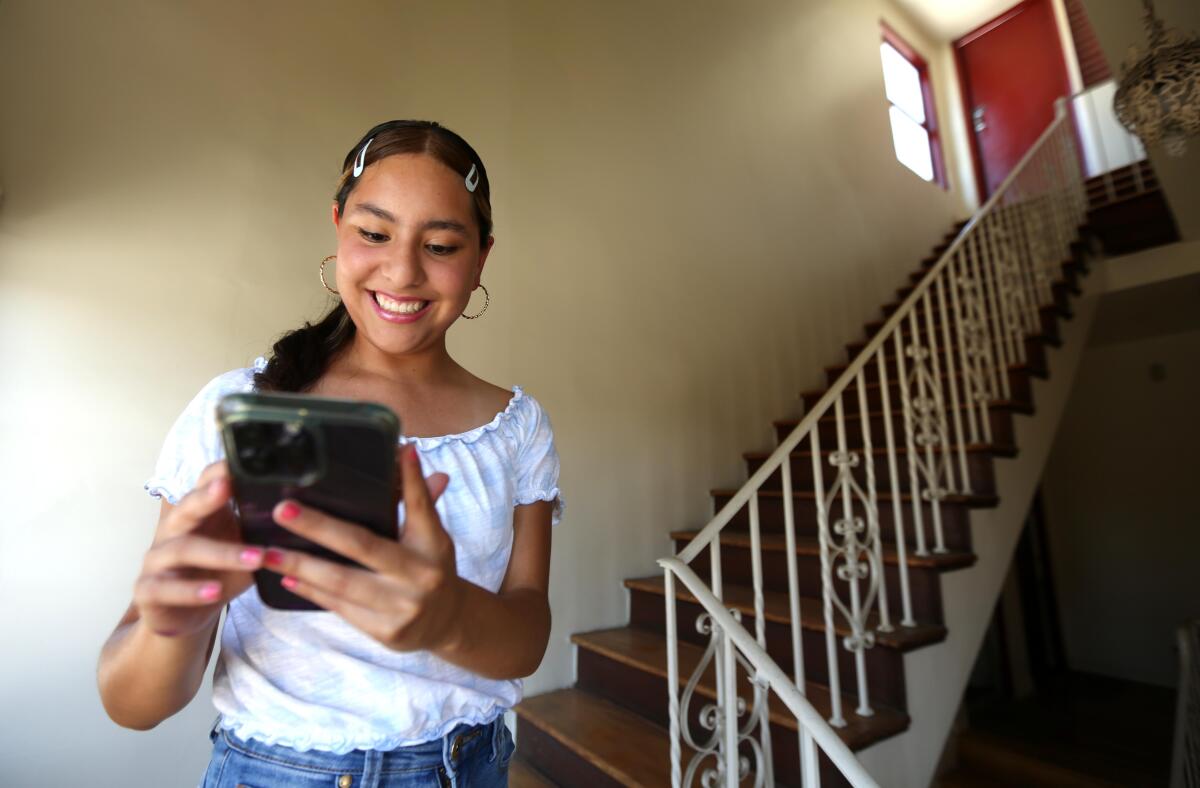
When Angélica took the public bus to an internship this summer, she texted her parents along the route to let them know she was safe. She has an Instagram account to connect with friends and watches YouTube videos, including campus tours and vlogs of students at USC and Harvard, her dream colleges. She also views online math video tutorials on Khan Academy.
Through her phone, Angélica, who lives near Historic Filipinotown and is the daughter of Mexican immigrants, found new ways to learn and expand her world beyond her corner of urban Los Angeles.
But she also saw the pitfalls of cellphones. Girls in her school can be “obsessed” with social media, comparing their clothes, weight and followings to other teens’, she said. She recently looked at her screen time monitor — 2.5 hours by the afternoon on a late Thursday in June — and felt accomplished, contrasting herself to a cousin whose daily use was several times that number.
Angélica tries to keep her phone in her backpack side pocket during the schoolday. But even if she avoids using it, she gets distracted by other students on theirs.
She remembers an incident last year when an Advanced Placement class teacher gave instructions for an assignment but she could barely hear it over loud, ongoing laughter from two classmates engrossed in their phones.
“It was not just distracting but it felt disrespectful to the teacher and to any other student,” Angélica said. She recalls wishing that all classes were like AP English, where her teacher banned phone use during class.
By the last semester of her senior year, she’ll get that wish.

Too much screen time harms children, experts agree. So why do parents ignore them?
Many parents allow children more than double the TV and tablet time experts suggest. Families are turning to screens for learning and distraction, clashing with advice.
June 26, 2024
But thinking it over, she also has questions. Could she take out her phone to take photos of friends at lunch, as she often did last school year? Could she still use her phone occasionally in class to snap shots of the whiteboard instead of taking notes?
Under the approved ban, the answer is no. However, L.A. school officials said students will be included in the rule making and enforcement policies that will come before the school board in the fall.
“As much as it would be good if phones were banned, I see the positives of having them,” Angélica said.
When another student at her school, Noreen Baig, first found out about the ban — from an Instagram post her mom sent via cellphone — she thought it was a hoax.
“A widespread ban is not OK,” the 11th grader said. Some of her classes already ban phones.
She also worries about emergencies. Her school had several lockdowns last year; each time, she texted her mom to check in.
“Are all of us from one class supposed to now rush to the office to make a phone call?” Baig said. She also uses social media to find out when and where school clubs are meeting. During lunch, she finds her friends in the cafeteria through Instagram messaging.
“My phone is a part of me,” Baig said. “LAUSD is trying to solve a small issue by taking away technology for everyone.”
To many students, the reality of what a cellphone ban will mean is hard to grasp.
But not for A Quindel Peral, a rising eighth grader at Mark Twain Middle School.
Her mother, an algebra and data science teacher at Venice High School, was part of a team of teachers that initiated a school-wide phone-free program in March. A wears a Gabb watch to school, a simpler version of an Apple Watch that’s designed to have limited functions — GPS and texting among them — so parents can keep in touch with kids. At home, A has access to a Wi-Fi-enabled iPad that she uses to text friends and play chess and Wordle.
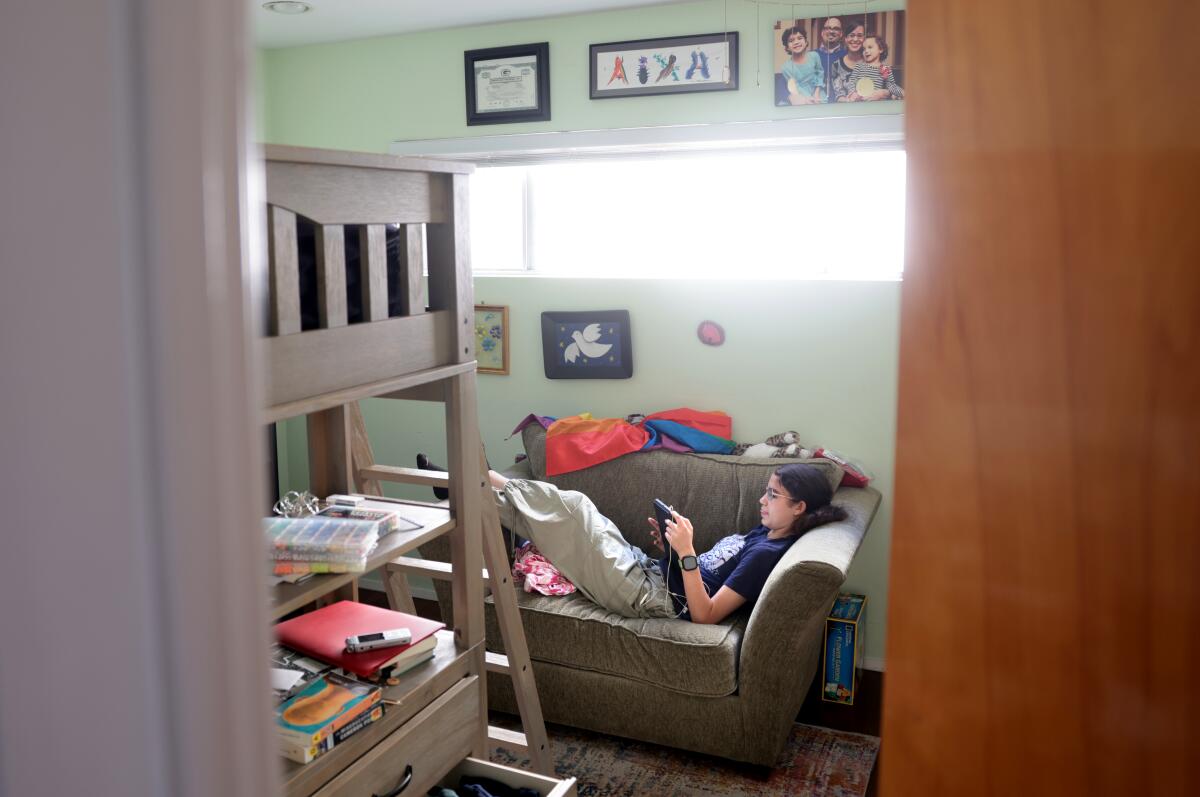
She’s just one of two people in her group of middle-school friends without a phone. At first, A felt left out, even angry. Her parents say she’ll get a phone when she starts high school, by which point the schoolday ban policy will be in place.
But going to school without a phone, A noticed she acted differently than other students. She was able to focus better and longer on assignments and reading. She noticed some classmates would hide their phones behind books during class, pretending to read while actually texting and scrolling. With the encouragement of her mom, she began learning more about teens and technology.
“Kids right now are in their critical growth era, basically. They’re in a time in their lives when their brain is growing a lot. They’re more susceptible to peer pressure,” she said. “It’s really important that we not abuse the power phones give us. It really just depends on how you are using it.”
Still, she’s looking forward to having a cellphone when the time comes. She’s just not counting down to it the way she used to.
More to Read

Activist groups sue L.A. schools seeking data on app used to report suspicious behavior
June 19, 2024

Abcarian: Los Angeles public schools will ban cellphones. What’s not to like?

LAUSD, fed up with kids distracted by social media, to consider cellphone ban
June 17, 2024
Start your day right
Sign up for Essential California for news, features and recommendations from the L.A. Times and beyond in your inbox six days a week.
You may occasionally receive promotional content from the Los Angeles Times.

Jaweed Kaleem is an education reporter at the Los Angeles Times, where he covers news and features on K-12 and higher education. He specializes in reporting on campus activism and culture, including issues on free speech, religion, race and politics. Kaleem previously worked for The Times as a Los Angeles-based national correspondent and a London-based foreign correspondent.
More From the Los Angeles Times

Opinion: What’s behind the Anti-Defamation League’s troubling complaints against L.A.-area colleges

Newsom signs law requiring stronger sexual harassment policies at CSU
July 15, 2024

Newsom signs bill banning schools from notifying parents about student gender identity

UC regents: Protests yes, encampments no. Campus rules must be consistently enforced

IMAGES
COMMENTS
Spending several hours on homework after a full school day can be mentally and physically draining. This workload can lead to burnout, decreased motivation, and negative attitudes toward school and learning. While homework can help consolidate classroom learning, too much can be counterproductive.
In the early 1900s, progressive education theorists, championed by the magazine Ladies' Home Journal, decried homework's negative impact on children's physical and mental health, leading California to ban homework for students under 15 from 1901 until 1917. In the 1930s, homework was portrayed as child labor, which was newly illegal, but ...
"I don't think (we) should scrap homework; I think we should scrap meaningless, purposeless busy work-type homework. ... More:Some parents are slipping young kids in for the COVID-19 vaccine, ...
Reasons Why Homework Should Be Banned. 1. It Contributes to Increased Anxiety. If there's one word that describes middle-school and high-school students, it's anxiety. In my homework statistics article, I cite research showing that 74% of students cite homework as a source of stress. They have so much to juggle, from the novelty of ...
The authors believe this meritocratic narrative is a myth and that homework — math homework in particular — further entrenches the myth in the minds of teachers and their students.
American high school students, in fact, do more homework each week than their peers in the average country in the OECD, a 2014 report found. It's time for an uprising. Already, small rebellions ...
In 2003, a pair of national studies found that most American students spent less than an hour daily on homework, and the workload was no bigger than it was 50 years prior. "There is this view in ...
Some schools and districts have adapted time limits rather than nix homework completely, with the 10-minute per grade rule being the standard — 10 minutes a night for first-graders, 30 minutes for third-graders, and so on. (This remedy, however, is often met with mixed results since not all students work at the same pace.)
And for secondary age students, 90 minutes of homework a day is the ideal amount for improving academic performance. Schools and parents must ensure that homework doesn't interfere with a healthy balance of exercise, family time and downtime - especially after a difficult year of online learning and limited social interaction.
A 2020 survey by Crayola Experience reports 82 percent of children complain they don't have enough quality time with their parents. Homework deserves much of the blame. "Kids should have a chance to just be kids and do things they enjoy, particularly after spending six hours a day in school," says Alfie Kohn, author of The Homework Myth ...
In April 2024, Poland enacted a homework ban for students in grades 1 through 3. In grades 4 through 8, homework must be optional and can't count toward a student's grade. Finnish schools are famous for assigning less homework at all ages, yet continuing to score highly in international rankings.
Here are the figures for math homework: 46% of parents think their child's math homework is too easy. 25% of parents think their child's math homework is not too easy. ... The debate over whether homework should be banned will not be resolved with these homework statistics. But, these facts and figures can help you to pursue a position in a ...
Homework is a controversial topic in education, but what does the science say? Explore the pros and cons of homework and its impact on students' well-being in this article from BBC Science Focus Magazine.
Pros of Homework Bans. 1. Homework May Not Improve Academic Outcomes. Unfortunately, as highly debated as homework is, there has been little conclusive or scientific research indicating its ...
One of the most cited reasons for students dropping out of school is that they cannot complete their homework on time. 3. Banning homework would increase the amount of family time available to students. Homework creates a significant disruption to family relationships.
Homework negatively affects students' health. Download Article. Homework takes a toll physically. Recent studies have demonstrated that too much homework can disrupt a student's sleep cycle, and cause stress headaches, stomach problems, and depression. [3] 3.
In high school, too much homework (more than 2 hours) is linked with increased risk for physical and mental health issues, such as anxiety and depression. In middle school, more than 90 minutes of homework is linked with lower test scores in math and science.
Wait and watch. Give the teacher a week or two to change their practice. If they lighten up sufficiently on the homework, then your advocacy work is over for now. Regroup. If the troubling ...
There are plenty of reasons why (most) homework should be banned. I'll start out with some general facts and look at homework in general, then go into some detail about our school. Stanford conducted a study surveying over 4,300 students in 10 high performing high schools in California.
There are many differing opinions about homework. While some think having too much homework can be detrimental, others think that it's crucial for learning. Let's have a closer look at the positive and negative aspects of homework while we consider if homework should be banned. Benefits of Homework
Banned: Disallow homework in K-8 grades in the U.S. public schools. 1. Homework puts an unfair burden on teachers. Warrant: Homework produces large amount of pointless work of little educational value, but marking it ties up much of teachers' time. Add in correcting it and the time it takes up in class going over it.
Many parents think homework plays an essential role in students' lives. So after analyzing a lot of things, we will include the pros and cons of doing homework. Let us continue with why homework should be banned. 9 Major Reasons Why Homework Should Be Banned
i think either classwork or homework should be banned cause in my country you have to do like atleast 4 homeworks ( do note that i am in 6th) and on average per day you hae to do 6 homeworks plus whatever extra work your teacher gives you ( unless they are nice like my eng teacher ). schoolwork consumes 6 HOURS of my screen time plus 2 or 1 ...
What parents can do: "The teacher should provide a clear connection to how the summer work is going to enhance the learning and/or enrich the learning that will occur at the start of the year ...
Former President Donald Trump picked J.D. Vance to be his running mate, catapulting the Ohio senator even more into the national spotlight.
This comes 50 years after the country became the first ever nation to introduce paid parental leave that could be split between both parents - and many countries, including the UK, copied. 12:02:49
If the argument is, well what if there is a school shooting (again, God forbid), then I think we are trying to solve that problem with the wrong device." National polls have run the gamut from 72% of high school teachers opposing cellphones in the classroom to 70% of parents against a ban.
Cities, states and school districts are passing sweeping bans on cellphones in schools, aiming to get kids to pay attention during class and socialize with their peers IRL.. Why it matters: School cellphones policies are a difficult flashpoint: On one hand, the phones can be a useful learning tool and essential parent lifeline; on the other — well, they're a pretty obvious distraction.
Los Angeles has joined a growing list of United States school districts, states and cities restricting the use of smartphones in public schools amid a debate over the effects of social media and ...
Many parents allow children more than double the TV and tablet time experts suggest. Families are turning to screens for learning and distraction, clashing with advice. June 26, 2024